- Skip to main content
- Skip to "About this site"

Language selection
Search travel.gc.ca.
Help us to improve our website. Take our survey !
COVID-19: travel health notice for all travellers
Kiribati travel advice
Latest updates: Editorial change
Last updated: August 7, 2024 12:42 ET
On this page
Safety and security, entry and exit requirements, laws and culture, natural disasters and climate, kiribati - take normal security precautions.
Take normal security precautions in Kiribati.
Back to top
Petty Crime
Petty crime, such as pickpocketing and purse snatching, occurs. Ensure that your personal belongings, including your passport and other travel documents, are secure at all times.
Organized crime
There have been reports of organized crime in Kiribati waters. The majority of these reports are drug related. Exercise caution when travelling in Kiribati waters as officials lack the resources to respond to organized crime effectively.
Unexploded ordnance
Exercise caution on beaches in Tarawa, particularly in the Betio and South Tarawa areas, where unexploded ordnance may have been left over from past naval warfare.
Avoid jogging or running in the street as street dogs can become aggressive and bite.
Tourist facilities
Tourist facilities and services are limited. Internet and mobile phone services are not available on some of Kiribati’s outer islands.
Coastal waters can be dangerous. Riptides are common, particularly beyond the reef area. Several drownings occur each year.
- Follow the instructions and warnings of local authorities
- Avoid swimming in the heavily polluted lagoon in south Tarawa
Water safety abroad
Women’s safety
Women travelling alone may be subject to some forms of harassment and verbal abuse.
Advice for women travellers
Road safety
Road conditions and road safety are poor throughout the country. Street lighting is limited and vehicles are often poorly maintained. Some roads regularly flood after heavy rains.
Drivers employ dangerous driving practices and do not respect traffic laws. Drinking and driving is prevalent, particularly on weekends. Accidents are common.
- Be extremely careful when driving at night, particularly outside of Betio due to the busier traffic and limited street lighting
- Be aware of small motorbikes and mopeds sharing the road, as drivers typically do not follow traffic laws
Public transportation
Maritime transportation is the primary mode of transport.
Passenger ferries go to many of the smaller islands, though they do not always operate on time. Local ferries are often overcrowded and do not always meet international safety standards. Ferry accidents occur from time to time due to the overloading and poor maintenance of some vessels. Do not board vessels that appear overloaded or unseaworthy.
- Be aware of the emergency exits and where to find life jackets
- Consider bringing your own life jackets and locator beacons
- Ensure you leave ample time for travel as timetables are not always reliable
A private minibus service is available in the absence of taxis. It operates in Tarawa, on the main islands of the Gilbert group, and Christmas Island. These are often used for travel to and from airports. Passengers must hail minibuses.
- Exercise caution on minibuses as they can be overcrowded
- Drivers are often reckless and pose a threat to pedestrians
We do not make assessments on the compliance of foreign domestic airlines with international safety standards.
Information about foreign domestic airlines
The main islands of the Gilbert group have airstrips and are served from Tarawa’s Bonriki International Airport. There is no scheduled service between the Gilbert Islands, the Phoenix Islands and the Line Islands. You must transit through Fiji to travel between Tarawa and Christmas Island.
Every country or territory decides who can enter or exit through its borders. The Government of Canada cannot intervene on your behalf if you do not meet your destination’s entry or exit requirements.
We have obtained the information on this page from the authorities of Kiribati. It can, however, change at any time.
Verify this information with the Foreign Representatives in Canada .
Entry requirements vary depending on the type of passport you use for travel.
Before you travel, check with your transportation company about passport requirements. Its rules on passport validity may be more stringent than the country’s entry rules.
Regular Canadian passport
Your passport must be valid for at least 6 months beyond the date you expect to leave Kiribati.
Passport for official travel
Different entry rules may apply.
Official travel
Passport with “X” gender identifier
While the Government of Canada issues passports with an “X” gender identifier, it cannot guarantee your entry or transit through other countries. You might face entry restrictions in countries that do not recognize the “X” gender identifier. Before you leave, check with the closest foreign representative for your destination.
Other travel documents
Different entry rules may apply when travelling with a temporary passport or an emergency travel document. Before you leave, check with the closest foreign representative for your destination.
Useful links
- Foreign Representatives in Canada
- Canadian passports
Tourist visa: not required for up to 30 days Business visa: required unless you are travelling for short term business such as a meeting, seminar, conference or workshop Student visa: required
Visas must be obtained before entry and take between 10 and 30 days to process.
Kiribati Ministry of Foreign Affairs Immigration Division
Other entry requirements
You must show an onward or return ticket and proof of sufficient funds.
- Children and travel
Learn more about travelling with children .
Yellow fever
Learn about potential entry requirements related to yellow fever (vaccines section).
Relevant Travel Health Notices
- Global Measles Notice - 13 March, 2024
- COVID-19 and International Travel - 13 March, 2024
This section contains information on possible health risks and restrictions regularly found or ongoing in the destination. Follow this advice to lower your risk of becoming ill while travelling. Not all risks are listed below.
Consult a health care professional or visit a travel health clinic preferably 6 weeks before you travel to get personalized health advice and recommendations.
Routine vaccines
Be sure that your routine vaccinations , as per your province or territory , are up-to-date before travelling, regardless of your destination.
Some of these vaccinations include measles-mumps-rubella (MMR), diphtheria, tetanus, pertussis, polio, varicella (chickenpox), influenza and others.
Pre-travel vaccines and medications
You may be at risk for preventable diseases while travelling in this destination. Talk to a travel health professional about which medications or vaccines may be right for you, based on your destination and itinerary.
Yellow fever is a disease caused by a flavivirus from the bite of an infected mosquito.
Travellers get vaccinated either because it is required to enter a country or because it is recommended for their protection.
- There is no risk of yellow fever in this country.
Country Entry Requirement*
- Proof of vaccination is not required to enter this country.
Recommendation
- Vaccination is not recommended.
* It is important to note that country entry requirements may not reflect your risk of yellow fever at your destination. It is recommended that you contact the nearest diplomatic or consular office of the destination(s) you will be visiting to verify any additional entry requirements.
About Yellow Fever
Yellow Fever Vaccination Centres in Canada
There is a risk of hepatitis A in this destination. It is a disease of the liver. People can get hepatitis A if they ingest contaminated food or water, eat foods prepared by an infectious person, or if they have close physical contact (such as oral-anal sex) with an infectious person, although casual contact among people does not spread the virus.
Practise safe food and water precautions and wash your hands often. Vaccination is recommended for all travellers to areas where hepatitis A is present.
Measles is a highly contagious viral disease. It can spread quickly from person to person by direct contact and through droplets in the air.
Anyone who is not protected against measles is at risk of being infected with it when travelling internationally.
Regardless of where you are going, talk to a health care professional before travelling to make sure you are fully protected against measles.
Hepatitis B is a risk in every destination. It is a viral liver disease that is easily transmitted from one person to another through exposure to blood and body fluids containing the hepatitis B virus. Travellers who may be exposed to blood or other bodily fluids (e.g., through sexual contact, medical treatment, sharing needles, tattooing, acupuncture or occupational exposure) are at higher risk of getting hepatitis B.
Hepatitis B vaccination is recommended for all travellers. Prevent hepatitis B infection by practicing safe sex, only using new and sterile drug equipment, and only getting tattoos and piercings in settings that follow public health regulations and standards.
Coronavirus disease (COVID-19) is an infectious viral disease. It can spread from person to person by direct contact and through droplets in the air.
It is recommended that all eligible travellers complete a COVID-19 vaccine series along with any additional recommended doses in Canada before travelling. Evidence shows that vaccines are very effective at preventing severe illness, hospitalization and death from COVID-19. While vaccination provides better protection against serious illness, you may still be at risk of infection from the virus that causes COVID-19. Anyone who has not completed a vaccine series is at increased risk of being infected with the virus that causes COVID-19 and is at greater risk for severe disease when travelling internationally.
Before travelling, verify your destination’s COVID-19 vaccination entry/exit requirements. Regardless of where you are going, talk to a health care professional before travelling to make sure you are adequately protected against COVID-19.
The best way to protect yourself from seasonal influenza (flu) is to get vaccinated every year. Get the flu shot at least 2 weeks before travelling.
The flu occurs worldwide.
- In the Northern Hemisphere, the flu season usually runs from November to April.
- In the Southern Hemisphere, the flu season usually runs between April and October.
- In the tropics, there is flu activity year round.
The flu vaccine available in one hemisphere may only offer partial protection against the flu in the other hemisphere.
The flu virus spreads from person to person when they cough or sneeze or by touching objects and surfaces that have been contaminated with the virus. Clean your hands often and wear a mask if you have a fever or respiratory symptoms.
In this destination, rabies may be present in some wildlife species, including bats. Rabies is a deadly disease that spreads to humans primarily through bites or scratches from an infected animal.
If you are bitten or scratched by an animal while travelling, immediately wash the wound with soap and clean water and see a health care professional.
Before travel, discuss rabies vaccination with a health care professional. It may be recommended for travellers who will be working directly with wildlife.
Safe food and water precautions
Many illnesses can be caused by eating food or drinking beverages contaminated by bacteria, parasites, toxins, or viruses, or by swimming or bathing in contaminated water.
- Learn more about food and water precautions to take to avoid getting sick by visiting our eat and drink safely abroad page. Remember: Boil it, cook it, peel it, or leave it!
- Avoid getting water into your eyes, mouth or nose when swimming or participating in activities in freshwater (streams, canals, lakes), particularly after flooding or heavy rain. Water may look clean but could still be polluted or contaminated.
- Avoid inhaling or swallowing water while bathing, showering, or swimming in pools or hot tubs.
Travellers' diarrhea is the most common illness affecting travellers. It is spread from eating or drinking contaminated food or water.
Risk of developing travellers' diarrhea increases when travelling in regions with poor standards of hygiene and sanitation. Practise safe food and water precautions.
The most important treatment for travellers' diarrhea is rehydration (drinking lots of fluids). Carry oral rehydration salts when travelling.
Insect bite prevention
Many diseases are spread by the bites of infected insects such as mosquitoes, ticks, fleas or flies. When travelling to areas where infected insects may be present:
- Use insect repellent (bug spray) on exposed skin
- Cover up with light-coloured, loose clothes made of tightly woven materials such as nylon or polyester
- Minimize exposure to insects
- Use mosquito netting when sleeping outdoors or in buildings that are not fully enclosed
To learn more about how you can reduce your risk of infection and disease caused by bites, both at home and abroad, visit our insect bite prevention page.
Find out what types of insects are present where you’re travelling, when they’re most active, and the symptoms of the diseases they spread.
There is a risk of chikungunya in this country. The level of risk may vary by:
The virus that causes chikungunya is spread through the bite of an infected mosquito. It can cause fever and pain in the joints. In some cases, the joint pain can be severe and last for months or years.
Protect yourself from mosquito bites at all times.
Learn more:
Insect bite and pest prevention Chikungunya
- In this country, risk of dengue is sporadic. It is a viral disease spread to humans by mosquito bites.
- Dengue can cause flu-like symptoms. In some cases, it can lead to severe dengue, which can be fatal.
- The level of risk of dengue changes seasonally, and varies from year to year. The level of risk also varies between regions in a country and can depend on the elevation in the region.
- Mosquitoes carrying dengue typically bite during the daytime, particularly around sunrise and sunset.
- Protect yourself from mosquito bites . There is no vaccine or medication that protects against dengue fever.
Animal precautions
Some infections, such as rabies and influenza, can be shared between humans and animals. Certain types of activities may increase your chance of contact with animals, such as travelling in rural or forested areas, camping, hiking, and visiting wet markets (places where live animals are slaughtered and sold) or caves.
Travellers are cautioned to avoid contact with animals, including dogs, livestock (pigs, cows), monkeys, snakes, rodents, birds, and bats, and to avoid eating undercooked wild game.
Closely supervise children, as they are more likely to come in contact with animals.
Person-to-person infections
Stay home if you’re sick and practise proper cough and sneeze etiquette , which includes coughing or sneezing into a tissue or the bend of your arm, not your hand. Reduce your risk of colds, the flu and other illnesses by:
- washing your hands often
- avoiding or limiting the amount of time spent in closed spaces, crowded places, or at large-scale events (concerts, sporting events, rallies)
- avoiding close physical contact with people who may be showing symptoms of illness
Sexually transmitted infections (STIs) , HIV , and mpox are spread through blood and bodily fluids; use condoms, practise safe sex, and limit your number of sexual partners. Check with your local public health authority pre-travel to determine your eligibility for mpox vaccine.
Tuberculosis is an infection caused by bacteria and usually affects the lungs.
For most travellers the risk of tuberculosis is low.
Travellers who may be at high risk while travelling in regions with risk of tuberculosis should discuss pre- and post-travel options with a health care professional.
High-risk travellers include those visiting or working in prisons, refugee camps, homeless shelters, or hospitals, or travellers visiting friends and relatives.
Medical services and facilities
Good healthcare is limited in availability. Hospitals in South Tarawa, Betio and Tabiteuea have the capacity to perform only routine procedures. In more rural areas, health clinics and centres offer basic care.
Medical evacuation can be very expensive and you may need it in case of serious illness or injury.
Make sure you get travel insurance that includes coverage for medical evacuation and hospital stays.
Health and safety outside Canada
Keep in Mind...
The decision to travel is the sole responsibility of the traveller. The traveller is also responsible for his or her own personal safety.
Be prepared. Do not expect medical services to be the same as in Canada. Pack a travel health kit , especially if you will be travelling away from major city centres.
You must abide by local laws.
Learn about what you should do and how we can help if you are arrested or detained abroad .
Penalties for possession, use or trafficking of illegal drugs are severe. Convicted offenders can expect jail sentences and heavy fines.
Drugs, alcohol and travel
2SLGBTQI+ persons
The laws of Kiribati prohibit sexual acts between individuals of the same sex. Those convicted can face jail sentences of up to 14 years.
2SLGBTQI+ persons should carefully consider the risks of travelling to Kiribati.
Travel and your sexual orientation, gender identity, gender expression and sex characteristics
Dual citizenship
Dual citizenship is not legally recognized in Kiribati.
If local authorities consider you a citizen of Kiribati, they may refuse to grant you access to Canadian consular services. This will prevent us from providing you with those services.
Dual citizens
International Child Abduction
The Hague Convention on the Civil Aspects of International Child Abduction is an international treaty. It can help parents with the return of children who have been removed to or retained in certain countries in violation of custody rights. It does not apply between Canada and Kiribati.
If your child was wrongfully taken to, or is being held in Kiribati by an abducting parent:
- act as quickly as you can
- consult a lawyer in Canada and in Kiribati to explore all the legal options for the return of your child
- report the situation to the nearest Canadian government office abroad or to the Vulnerable Children's Consular Unit at Global Affairs Canada by calling the Emergency Watch and Response Centre
If your child was removed from a country other than Canada, consult a lawyer to determine if The Hague Convention applies.
Be aware that Canadian consular officials cannot interfere in private legal matters or in another country's judicial affairs.
- International Child Abductions: A guide for affected parents
- Canadian embassies and consulates by destination
- Request emergency assistance
Dress and behaviour
Nudity and wearing revealing swimsuits are not socially accepted.
To avoid offending local sensitivities:
- dress conservatively
- behave discreetly
- respect religious and social traditions
You can drive in Kiribati with an international driving permit or a domestic driver’s license for up to two weeks. After this period, you must acquire a Kiribati driver’s license.
Traffic drives on the left.
Car rentals are available in Tarawa.
International Driving Permit
Importation of firearms, ammunition, explosives, counterfeit money and goods, knives and pornography is strictly prohibited. Strict quarantine laws govern the import of any part of plants, fruits, vegetables and soil, as well as animals and animal products.
Visitors are not allowed to export human remains, artifacts that are 30 or more years old, traditional fighting swords, traditional tools, dancing ornaments or suits of armour.
Consulate of the Republic of Kiribati in Honolulu
The currency is the Australian dollar (AUD). The Australian and New Zealand Banking Group Limited is the only bank in Kiribati. There are a limited number of ATMs. Visa and MasterCard are accepted at most hotels. Western Union can be used for money transfers.
Cyclones and monsoons
The rainy seasons in the South Pacific extend from November to April. Severe rainstorms can cause flooding and landslides, which can hamper overland, maritime and air travel. They can also reduce the provision of essential services such as water and power.
- Keep informed of regional weather forecasts
- Avoid disaster areas
- Follow the advice of local authorities
During a cyclone or monsoon, hotel guests may be required to leave accommodations near the shore and move to inland safety centres. Travel to and from outer islands may be disrupted for some days.
Tornadoes, cyclones, hurricanes, typhoons and monsoons
Seismic activity
Kiribati is in an active seismic zone. A tsunami can occur within minutes of a nearby earthquake. However, the risk of tsunami can remain for several hours following the first tremor. If you are staying on the coast, familiarize yourself with the region’s evacuation plans in the event of a tsunami warning.
Tsunami alerts - U.S. Tsunami Warning System
Local services
In case of emergency, dial:
- police: 192 or 188
- medical assistance: 994 or +686 28100 (Tungaru Central Hospital)
- firefighters: 193
Consular assistance
There is no resident Canadian government office in Kiribati. You can obtain consular assistance and further information from the Australian High Commission to Kiribati, in Tarawa, under the Canada–Australia Consular Services Sharing Agreement.
Sign up to receive email updates from the Australian government on situations and events that could affect your safety while in Kiribati.
Smartraveller - Australian travel advice
American Samoa, Cook Islands, Fiji, French Polynesia, Kiribati, Niue, Samoa, Tokelau, Tonga, Tuvalu, Wallis and Futuna
For emergency consular assistance, call the High Commission of Canada in Wellington, New Zealand, and follow the instructions. At any time, you may also contact the Emergency Watch and Response Centre in Ottawa.
The decision to travel is your choice and you are responsible for your personal safety abroad. We take the safety and security of Canadians abroad very seriously and provide credible and timely information in our Travel Advice to enable you to make well-informed decisions regarding your travel abroad.
The content on this page is provided for information only. While we make every effort to give you correct information, it is provided on an "as is" basis without warranty of any kind, expressed or implied. The Government of Canada does not assume responsibility and will not be liable for any damages in connection to the information provided.
If you need consular assistance while abroad, we will make every effort to help you. However, there may be constraints that will limit the ability of the Government of Canada to provide services.
Learn more about consular services .
Risk Levels
take normal security precautions.
Take similar precautions to those you would take in Canada.
Exercise a high degree of caution
There are certain safety and security concerns or the situation could change quickly. Be very cautious at all times, monitor local media and follow the instructions of local authorities.
IMPORTANT: The two levels below are official Government of Canada Travel Advisories and are issued when the safety and security of Canadians travelling or living in the country or region may be at risk.
Avoid non-essential travel
Your safety and security could be at risk. You should think about your need to travel to this country, territory or region based on family or business requirements, knowledge of or familiarity with the region, and other factors. If you are already there, think about whether you really need to be there. If you do not need to be there, you should think about leaving.
Avoid all travel
You should not travel to this country, territory or region. Your personal safety and security are at great risk. If you are already there, you should think about leaving if it is safe to do so.
Security Alert May 17, 2024
Worldwide caution.
- Travel Advisories |
- Contact Us |
- MyTravelGov |
Find U.S. Embassies & Consulates
Travel.state.gov, congressional liaison, special issuance agency, u.s. passports, international travel, intercountry adoption, international parental child abduction, records and authentications, popular links, travel advisories, mytravelgov, stay connected, legal resources, legal information, info for u.s. law enforcement, replace or certify documents.
Before You Go
Learn About Your Destination
While Abroad
Emergencies
Share this page:
Travel Advisory August 9, 2023
Kiribati - level 1: exercise normal precautions.
Reissued with updates to health information and Travel Advisory Level.
Exercise normal precautions in Kiribati.
Read the country information page for additional information on travel to Kiribati.
Commercial transportation to/from Kiribati is sporadically available.
If you decide to travel to Kiribati:
- Monitor local media.
- Bring a sufficient supply of over-the-counter and prescription medicines.
- Enroll in the Smart Traveler Enrollment Program ( STEP ) to receive security messages and make it easier to locate you in an emergency.
- Follow the Department of State on Facebook and Twitter .
- Review the Country Security Report for Kiribati.
- Visit the CDC page for the latest Travel Health Information related to your travel.
- Prepare a contingency plan for emergency situations. Review the Traveler’s Checklist .
Embassy Message
View Alerts and Messages Archive
Quick Facts
One page required for stamp
Not required for stays up to 30 days
5000 AUD (Australian Dollars)
Embassies and Consulates
U.S. Embassy Suva, Fiji, Kiribati, Nauru, Tonga, Tuvalu 158 Princes Rd, Tamavua Suva, Fiji Islands Telephone: +(679) 331-4466 Emergency After-Hours Telephone: +(679) 772-8049 Fax: +(679) 330-2267 [email protected]
Destination Description
Learn about the U.S. relationship to countries around the world.
Entry, Exit and Visa Requirements
To enter Kiribati, you need:
- a valid passport with a minimum of six months validity
- a return or onward ticket (or sufficient funds to purchase them), and
- sufficient funds to cover the duration of the intended stay.
A tourist visa is not required for travel up to 90 days in any given 12-month period. For additional immigration and visa information, please contact the Consulate of Kiribati or the Kiribati National Tourism Office . For information on long-term visit or residency requirements, please contact the Consulate of the Republic of Kiribati, 95 Nakolo Place, Rm. 265, Honolulu, Hawaii 96819, tel. (808) 834-7603, fax (808) 834-7604.
The U.S. Department of State is unaware of any HIV/AIDS entry restrictions for visitors to or foreign residents of Kiribati.
Find information on travelers with dual nationality , prevention of international child abduction and customs regulations on our websites
Safety and Security
Public Safety: Messages regarding demonstrations and strikes, explosive device/suspicious packages, and weather-related events are located on the embassy’s website .
Crime: The crime rate in Kiribati is low; however, you should still not be complacent regarding your personal safety or protecting your valuables.
International Financial Scams: See the Department of State and the FBI pages for information.
Victims of Crime: U.S. citizen victims of sexual assault or other crimes are encouraged to contact the U.S. Embassy for assistance at +(679) 331-4466, or after hours to the Embassy duty officer at +(679) 772-8049. Report crimes to the local police by dialing 992.
Remember that local authorities are responsible for investigating and prosecuting crime.
See our webpage on help for U.S. victims of crime overseas .
- Help you find appropriate medical care
- Assist you in reporting a crime to the police
- Contact relatives or friends with your written consent
- Provide general information regarding the victim’s role during the local investigation and following its conclusion
- Provide a list of local attorneys
- Provide our information on victim’s compensation programs in the U.S.
- Provide an emergency loan for repatriation to the United States and/or limited medical support in cases of destitution
- Help you find accommodation and arrange flights home
- Replace a stolen or lost passport
Domestic Violence: U.S. citizen victims of domestic violence are encouraged to contact the Embassy for assistance.
For further information:
- Enroll in the Smart Traveler Enrollment Program ( STEP ) to receive Alerts and make it easier to locate you in an emergency.
- Call us in Washington at 1-888-407-4747 toll-free in the United States and Canada or 1-202-501-4444 from other countries from 8:00 a.m. to 8:00 p.m. Eastern Standard Time, Monday through Friday (except U.S. federal holidays).
- See the State Department's travel website for the Worldwide Caution , Travel Advisories , and Alerts.
- Follow us on Twitter and Facebook .
- See traveling safely abroad for useful travel tips.
Local Laws & Special Circumstances
Criminal Penalties: You are subject to local laws. If you violate local laws, even unknowingly, you may be expelled, arrested, or imprisoned.
Individuals establishing a business or practicing a profession that requires additional permits or licensing should seek information from the competent local authorities, prior to practicing or operating a business.
Permission from the Government of Kiribati is required prior to research or filming in Kiribati.
Furthermore, some laws are also prosecutable in the United States, regardless of local law. For examples, see our website on crimes against minors abroad and the Department of Justice website.
Arrest Notification: If you are arrested or detained, ask police or prison officials to notify the U.S. Embassy immediately. See our webpage for further information.
- Kiribati’s customs authorities strictly prohibit the importation of firearms, ammunition, explosives, counterfeit money and goods, knives, and indecent publications or pornography.
- Strict quarantine laws govern the import of any part of plants, fruits, or vegetables, as well as soil, animals, and animal products.
- Visitors are not allowed to export human remains, artifacts that are 30 or more years old, traditional fighting swords, traditional tools, dancing ornaments, or suits of armor.
- For more information, please contact the Consulate of the Republic of Kiribati in Honolulu at (808) 834-7603 or via e-mail .
Currency: The Australian dollar is the legal currency in Kiribati. Traveler’s checks and all major currencies are accepted by banks and may also be exchanged for local currency at some local hotels. Visa and MasterCard are accepted at most hotels.
Natural Disasters: Kiribati is located in an area of high seismic activity. Undersea earthquakes in the South Pacific region can also generate destructive tsunamis. The Government of Kiribati has only limited capability for notifying residents and visitors in the event of a tsunami. If you notice seismic activity and/or unusual tidal activity, you should take immediate precautions, such as seeking higher ground or refuge on an upper floor in a sturdy building. Strong winds are common, especially during the cyclone season from November to April.
General information about natural disaster preparedness is available at the State Department’s website , as well as from the U.S. Federal Emergency Management Agency’s (FEMA) website.
Faith-Based Travelers: See the following webpages for details:
- Faith-Based Travel Information
- International Religious Freedom Report – see country reports
- Human Rights Report – see country reports
- Hajj Fact Sheet for Travelers
- Best Practices for Volunteering Abroad
LGBTQI+ Travelers: Consensual same-sex sexual conduct between men and between women is illegal, with a maximum penalty of five to 14 years’ imprisonment, depending on the nature of the offense. However, the U.S. Embassy is not aware of any reports of prosecutions directed at gay, bisexual, or transgender persons under these provisions for sexual activity between consenting adults.
See our LGBTQI+ Travel Information page and section 6 of our Human Rights report for further details.
Travelers Who Require Accessibility Assistance . Accessibility of buildings, and communications and information for persons with disabilities is not mandated. There are no special accommodations for persons with disabilities.
Students: See our Students Abroad page and FBI travel tips.
Women Travelers: See our travel tips for Women Travelers .
For emergency services in Kiribati, dial 994 for ambulance and 993 for fire.
Health care throughout Kiribati, including Tarawa, is substandard. Travelers may encounter shortages of routine medications and supplies. Hospital accommodations are inadequate throughout the country, and advanced technology is lacking. Serious medical conditions requiring hospitalization or evacuation to the United States or elsewhere may cost thousands of dollars.
Kiribati has no funeral homes with embalming or cremation services.
Ambulance services are:
- Not equipped with state-of-the-art medical equipment and often have little or no medical equipment at all.
- Not staffed with trained paramedics
- Injured or seriously ill travelers may prefer to take a taxi or private vehicle to the nearest major hospital rather than wait for an ambulance.
- Limited in availability throughout the country
The Department of State does not pay medical bills. Be aware that U.S. Medicare/Medicaid does not apply overseas. Most hospitals and doctors overseas do not accept U.S. health insurance.
Medical Insurance: Make sure your health insurance plan provides coverage overseas. Most care providers overseas, including in Kiribati, only accept cash payments.
Visit the U.S. Centers for Disease Control and Prevention for more information on type of insurance you should consider before you travel overseas.
We strongly recommend supplemental insurance to cover medical evacuation.
Always carry your prescription medication in original packaging, along with your doctor’s prescription. Check with the Kiribati Customs and MFA to ensure the medication is legal in Kiribati.
Vaccinations: Be up-to-date on all vaccinations recommended by the U.S. Centers for Disease Control and Prevention.
Further health information:
- World Health Organization
- U.S. Centers for Disease Control and Prevention (CDC)
Air Quality: Visit AirNow Department of State
Health facilities in general:
- The U.S. Embassy maintains a list of doctors and hospitals. We do not endorse or recommend any specific medical provider or clinic.
- Public medical clinics lack basic resources and supplies.
- Hospitals and doctors may require payment “up front” prior to service or admission. Credit card payment is not always available. Hospitals and medical professionals may require cash payments.
- Medical staff may speak little or no English.
Water Quality
- Tap water is not potable. Bottled water and beverages are generally safe, although you should be aware that many restaurants and hotels serve tap water unless bottled water is specifically requested. Be aware that ice for drinks may be made using tap water.
- You should regard all water as a potential health risk. You should not drink any water that is not bottled, boiled, or otherwise sterilized. You should cook vegetables and peel fruit before eating it.
Adventure Travel
- Visit the U.S. Centers for Disease Control and Prevention website for more information about Adventure Travel .
General Health Concerns
The following diseases are prevalent:
- Tuberculosis
- Chikungunya
- Diarrheal diseases
- Typhoid Fever
- Fungal infection
- Respiratory infections
- Use the U.S. Centers for Disease Control and Prevention recommended mosquito repellents and sleep under insecticide-impregnated mosquito nets. Chemoprophylaxis is recommended for all travelers even for short stays.
- Visit the U.S. Centers for Disease Control and Prevention website for more information about Resources for Travelers regarding specific issues in Kiribati.
Travel and Transportation
Road Conditions and Safety:
- Traffic moves on the left side of the road in Kiribati.
- While satisfactory in some areas, roads in urban Tarawa and Christmas Island generally need repair.
- The main sealed roads are on South Tarawa and Kiribati, and the unsealed roads are distributed among 20 islands.
- Unsealed roads in North Tarawa and on outer islands are mostly not connected by bridges, making transit between islets possible only during low tide.
- Road safety is a major concern with a growing incidence of road accidents due to increased traffic, the age and condition of vehicles, and dangerous driving.
- Many local residents use small motorbikes and mopeds for transport; motorists should be aware of these smaller vehicles sharing the road.
- After heavy rains and high tides, some road sections temporarily flood. Traffic proceeds at a relatively slow rate.
- Although it is illegal to drink and drive in Kiribati, it is nonetheless a common occurrence especially on the weekends.
- Since visibility is poor, with no streetlights, driving long distances at night is not recommended, particularly outside of Betio.
- For specific information concerning Kiribati drivers’ permits, vehicle inspection, road tax and mandatory insurance, please contact the Consulate of the Republic of Kiribati in Honolulu, Hawaii at (808) 834-6775 or [email protected] .
Traffic Laws:
- The traffic speed has been reduced in places to 20 km/h or less as a result of road damage, and driving conditions are hazardous, particularly after rain.
- Driving under the influence of alcohol is illegal in Kiribati. Mobile phone use while driving is illegal.
- Drivers and passengers are required to use seat belts.
See our Road Safety page for more information.
Aviation Safety Oversight: As there is no direct commercial air service to the United States by carriers registered in Kiribati, the U.S. Federal Aviation Administration (FAA) has not assessed the government of Kiribati’s Civil Aviation Authority for compliance with International Civil Aviation Organization (ICAO) aviation safety standards. Further information may be found on the FAA’s safety assessment page .
Maritime Travel: The U.S. Coast Guard has concerns about the security practices in the ports of Kiribati. Until those concerns can be addressed, the Coast Guard advises that Mariners and passengers traveling through the ports of Kiribati should exercise caution.
Mariners planning travel to Kiribati should check for U.S. maritime advisories and alerts . Information may also be posted to the U.S. Coast Guard homeport website, and the NGA broadcast warnings website.
While Kiribati is an island nation dependent on maritime transportation, vessel conditions and inspection regimens can be less than ideal. Be aware of boat and ferry exits, and life jacket placement. Travel schedules and timetables can vary from advertised, with cancellations are not uncommon; build liberal extra timing into other- and outer-island transport.
For additional travel information
- Enroll in the Smart Traveler Enrollment Program (STEP) to receive security messages and make it easier to locate you in an emergency.
- Call us in Washington, D.C. at 1-888-407-4747 (toll-free in the United States and Canada) or 1-202-501-4444 (from all other countries) from 8:00 a.m. to 8:00 p.m., Eastern Standard Time, Monday through Friday (except U.S. federal holidays).
- See the State Department’s travel website for the Worldwide Caution and Travel Advisories .
- Follow us on X (formerly known as "Twitter") and Facebook .
- See traveling safely abroad for useful travel tips.
Review information about International Parental Child Abduction in Kuwait . For additional IPCA-related information, please see the International Child Abduction Prevention and Return Act ( ICAPRA ) report.
Travel Advisory Levels
Assistance for u.s. citizens, kiribati map, learn about your destination, enroll in step.

Subscribe to get up-to-date safety and security information and help us reach you in an emergency abroad.
Recommended Web Browsers: Microsoft Edge or Google Chrome.
Check passport expiration dates carefully for all travelers! Children’s passports are issued for 5 years, adult passports for 10 years.
Afghanistan
Antigua and Barbuda
Bonaire, Sint Eustatius, and Saba
Bosnia and Herzegovina
British Virgin Islands
Burkina Faso
Burma (Myanmar)
Cayman Islands
Central African Republic
Cote d Ivoire
Curaçao
Czech Republic
Democratic Republic of the Congo
Dominican Republic
El Salvador
Equatorial Guinea
Eswatini (Swaziland)
Falkland Islands
France (includes Monaco)
French Guiana
French Polynesia
French West Indies
Guadeloupe, Martinique, Saint Martin, and Saint Barthélemy (French West Indies)
Guinea-Bissau
Isle of Man
Israel, The West Bank and Gaza
Liechtenstein
Marshall Islands
Netherlands
New Caledonia
New Zealand
North Korea (Democratic People's Republic of Korea)
Papua New Guinea
Philippines
Republic of North Macedonia
Republic of the Congo
Saint Kitts and Nevis
Saint Lucia
Saint Vincent and the Grenadines
Sao Tome and Principe
Saudi Arabia
Sierra Leone
Sint Maarten
Solomon Islands
South Africa
South Korea
South Sudan
Switzerland
The Bahamas
Timor-Leste
Trinidad and Tobago
Turkmenistan
Turks and Caicos Islands
United Arab Emirates
United Kingdom
Vatican City (Holy See)
External Link
You are about to leave travel.state.gov for an external website that is not maintained by the U.S. Department of State.
Links to external websites are provided as a convenience and should not be construed as an endorsement by the U.S. Department of State of the views or products contained therein. If you wish to remain on travel.state.gov, click the "cancel" message.
You are about to visit:

Experiences Where to stay Plan your trip
The republic of kiribati.

Kiribati - A Special Place
People, culture & heritage, getting to kiribati.
- Tarawa - Gilbert Islands
- Kiritimati - Line Islands
- Kanton - Phoenix Islands
Tarawa & Gilbert Islands

Experiences
- Outer Island Adventure & Cultural Discovery
- Community Based Tourism
- Game Fishing
- Fly Fishing
- Events & Festivals
- Sailing & Cruising
- Food & Eateries
Where to stay
- South Tarawa
- North Tarawa
- Outer Islands
Plan your trip
- Getting to Tarawa
- Travel Entry Requirements & Advisory
- Useful Information
- Golden Rules for your Visit
- Getting Around Tarawa & Gilbert Islands
- Suggested Itineraries
- Get Help from a Travel & Tour Specialist
Kanton & Phoenix Islands

- Diving & Snorkeling
- Expedition Cruises
- Kanton Island
- Getting to Kanton
- Need to Know Info
- Getting Around on Kanton and the Phoenix Islands
- Visa & Other Entry Requirements
- Build your Itinerary
Kiritimati & Line Islands

- Star Gazing
- Bird watching & Marine life tours
- Kiritimati Island Community Tour
- Kiritimati Tours Sightseeing
- Fanning & Teraina Island Adventure
- Untouched Southern Line Islands
- Kiritimati (Christmas) Island
- Fanning (Tabuaeran) Island
- Teraina (Washington) Island
- Getting to Kiritimati
- Getting Around on Kiritimati and the Line Islands

Related Contents
Travel entry requirements, need a visa to kiribati, health travel advisory.
Citizens of 64 countries and territories are currently exempt from obtaining a visa before arrival into Kiribati. These include Australia, Caribbean states, European Union countries, Japan, New Zealand, Singapore, USA, United Kingdom and Pacific Islands. To learn more on VISA exempt countries and Visa enquiries, please visit: https://www.mfa.gov.ki/immigration/
Travellers must ensure they are fully healthy and vaccinated from COVID-19 before travelling to Kiribati and must present a proof of COVID-19 Vaccination certificate upon arrival. Travellers will no longer be required to complete any mandatory PCR/RAT tests upon arrival. However, anyone experiencing any symptoms of COVID-19 upon arrival are encouraged to get tested at the nearest hospital. Travellers to Kiribati are also encouraged to bring with them any personal medication that they may need during their visit to the country.
Travel Documents
When travelling to Kiribati, please ensure you have the following:
- Return Ticket
- Valid passport (minimum 6 months validity)
- COVID-19 Vaccination Certificate
- Visa (if required)
- Work Permit (if required)
Customs & Duty Free
Kiribati Customs allows each traveller to bring into Kiribati: 2.25L of portable spirits, 4L of wine or beer, and 200 cigarettes or 250 grams of tobacco. This is applicable to travellers aged 21 years and above.
Biosecurity
Please declare upon arrival, all plants, fruits, vegetables, seeds, animal meats and poultry. A permit is required for the importation of live animals and meats / poultry.
You are using an outdated browser. Upgrade your browser today or install Google Chrome Frame to better experience this site.
Kiribati (formerly Gilbert Islands), includes Tarawa, Tabuaeran (Fanning Island), and Banaba (Ocean Island) Traveler View
Travel health notices, vaccines and medicines, non-vaccine-preventable diseases, stay healthy and safe.
- Packing List
After Your Trip
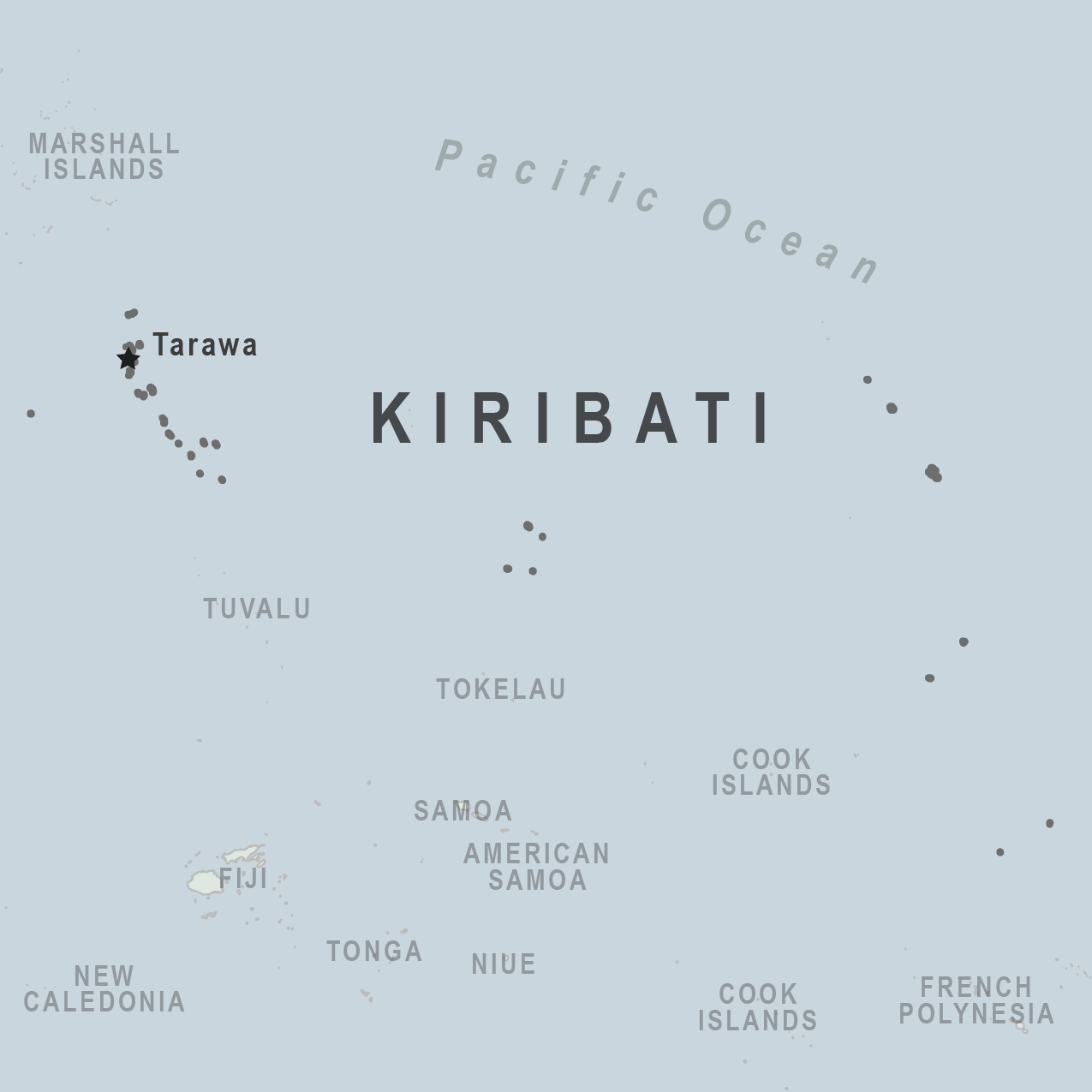
There are no notices currently in effect for Kiribati (formerly Gilbert Islands), includes Tarawa, Tabuaeran (Fanning Island), and Banaba (Ocean Island).
⇧ Top
Check the vaccines and medicines list and visit your doctor at least a month before your trip to get vaccines or medicines you may need. If you or your doctor need help finding a location that provides certain vaccines or medicines, visit the Find a Clinic page.
Routine vaccines
Recommendations.
Make sure you are up-to-date on all routine vaccines before every trip. Some of these vaccines include
- Chickenpox (Varicella)
- Diphtheria-Tetanus-Pertussis
- Flu (influenza)
- Measles-Mumps-Rubella (MMR)
Immunization schedules
All eligible travelers should be up to date with their COVID-19 vaccines. Please see Your COVID-19 Vaccination for more information.
COVID-19 vaccine
Hepatitis A
Recommended for unvaccinated travelers one year old or older going to Kiribati.
Infants 6 to 11 months old should also be vaccinated against Hepatitis A. The dose does not count toward the routine 2-dose series.
Travelers allergic to a vaccine component should receive a single dose of immune globulin, which provides effective protection for up to 2 months depending on dosage given.
Unvaccinated travelers who are over 40 years old, immunocompromised, or have chronic medical conditions planning to depart to a risk area in less than 2 weeks should get the initial dose of vaccine and at the same appointment receive immune globulin.
Hepatitis A - CDC Yellow Book
Dosing info - Hep A
Hepatitis B
Recommended for unvaccinated travelers of all ages traveling to Kiribati.
Hepatitis B - CDC Yellow Book
Dosing info - Hep B
Cases of measles are on the rise worldwide. Travelers are at risk of measles if they have not been fully vaccinated at least two weeks prior to departure, or have not had measles in the past, and travel internationally to areas where measles is spreading.
All international travelers should be fully vaccinated against measles with the measles-mumps-rubella (MMR) vaccine, including an early dose for infants 6–11 months, according to CDC’s measles vaccination recommendations for international travel .
Measles (Rubeola) - CDC Yellow Book
Dogs infected with rabies are not commonly found in Kiribati.
If rabies exposures occur while in Kiribati, rabies vaccines may only be available in larger suburban/urban medical facilities.
Rabies pre-exposure vaccination considerations include whether travelers 1) will be performing occupational or recreational activities that increase risk for exposure to potentially rabid animals and 2) might have difficulty getting prompt access to safe post-exposure prophylaxis.
Please consult with a healthcare provider to determine whether you should receive pre-exposure vaccination before travel.
For more information, see country rabies status assessments .
Rabies - CDC Yellow Book
Recommended for most travelers, especially those staying with friends or relatives or visiting smaller cities or rural areas.
Typhoid - CDC Yellow Book
Dosing info - Typhoid
Avoid contaminated water
Leptospirosis
How most people get sick (most common modes of transmission)
- Touching urine or other body fluids from an animal infected with leptospirosis
- Swimming or wading in urine-contaminated fresh water, or contact with urine-contaminated mud
- Drinking water or eating food contaminated with animal urine
- Avoid contaminated water and soil
- Avoid floodwater
Clinical Guidance
Avoid bug bites.
- Mosquito bite
- Avoid Bug Bites
- An infected pregnant woman can spread it to her unborn baby
Airborne & droplet
- Breathing in air or accidentally eating food contaminated with the urine, droppings, or saliva of infected rodents
- Bite from an infected rodent
- Less commonly, being around someone sick with hantavirus (only occurs with Andes virus)
- Avoid rodents and areas where they live
- Avoid sick people
Tuberculosis (TB)
- Breathe in TB bacteria that is in the air from an infected and contagious person coughing, speaking, or singing.
Learn actions you can take to stay healthy and safe on your trip. Vaccines cannot protect you from many diseases in Kiribati, so your behaviors are important.
Eat and drink safely
Food and water standards around the world vary based on the destination. Standards may also differ within a country and risk may change depending on activity type (e.g., hiking versus business trip). You can learn more about safe food and drink choices when traveling by accessing the resources below.
- Choose Safe Food and Drinks When Traveling
- Water Treatment Options When Hiking, Camping or Traveling
- Global Water, Sanitation and Hygiene (WASH)
- Avoid Contaminated Water During Travel
You can also visit the Department of State Country Information Pages for additional information about food and water safety.
Prevent bug bites
Bugs (like mosquitoes, ticks, and fleas) can spread a number of diseases in Kiribati. Many of these diseases cannot be prevented with a vaccine or medicine. You can reduce your risk by taking steps to prevent bug bites.
What can I do to prevent bug bites?
- Cover exposed skin by wearing long-sleeved shirts, long pants, and hats.
- Use an appropriate insect repellent (see below).
- Use permethrin-treated clothing and gear (such as boots, pants, socks, and tents). Do not use permethrin directly on skin.
- Stay and sleep in air-conditioned or screened rooms.
- Use a bed net if the area where you are sleeping is exposed to the outdoors.
What type of insect repellent should I use?
- FOR PROTECTION AGAINST TICKS AND MOSQUITOES: Use a repellent that contains 20% or more DEET for protection that lasts up to several hours.
- Picaridin (also known as KBR 3023, Bayrepel, and icaridin)
- Oil of lemon eucalyptus (OLE) or para-menthane-diol (PMD)
- 2-undecanone
- Always use insect repellent as directed.
What should I do if I am bitten by bugs?
- Avoid scratching bug bites, and apply hydrocortisone cream or calamine lotion to reduce the itching.
- Check your entire body for ticks after outdoor activity. Be sure to remove ticks properly.
What can I do to avoid bed bugs?
Although bed bugs do not carry disease, they are an annoyance. See our information page about avoiding bug bites for some easy tips to avoid them. For more information on bed bugs, see Bed Bugs .
For more detailed information on avoiding bug bites, see Avoid Bug Bites .
Stay safe outdoors
If your travel plans in Kiribati include outdoor activities, take these steps to stay safe and healthy during your trip.
- Stay alert to changing weather conditions and adjust your plans if conditions become unsafe.
- Prepare for activities by wearing the right clothes and packing protective items, such as bug spray, sunscreen, and a basic first aid kit.
- Consider learning basic first aid and CPR before travel. Bring a travel health kit with items appropriate for your activities.
- If you are outside for many hours in heat, eat salty snacks and drink water to stay hydrated and replace salt lost through sweating.
- Protect yourself from UV radiation : use sunscreen with an SPF of at least 15, wear protective clothing, and seek shade during the hottest time of day (10 a.m.–4 p.m.).
- Be especially careful during summer months and at high elevation. Because sunlight reflects off snow, sand, and water, sun exposure may be increased during activities like skiing, swimming, and sailing.
- Very cold temperatures can be dangerous. Dress in layers and cover heads, hands, and feet properly if you are visiting a cold location.
Stay safe around water
- Swim only in designated swimming areas. Obey lifeguards and warning flags on beaches.
- Practice safe boating—follow all boating safety laws, do not drink alcohol if driving a boat, and always wear a life jacket.
- Do not dive into shallow water.
- Do not swim in freshwater in developing areas or where sanitation is poor.
- Avoid swallowing water when swimming. Untreated water can carry germs that make you sick.
- To prevent infections, wear shoes on beaches where there may be animal waste.
Keep away from animals
Most animals avoid people, but they may attack if they feel threatened, are protecting their young or territory, or if they are injured or ill. Animal bites and scratches can lead to serious diseases such as rabies.
Follow these tips to protect yourself:
- Do not touch or feed any animals you do not know.
- Do not allow animals to lick open wounds, and do not get animal saliva in your eyes or mouth.
- Avoid rodents and their urine and feces.
- Traveling pets should be supervised closely and not allowed to come in contact with local animals.
- If you wake in a room with a bat, seek medical care immediately. Bat bites may be hard to see.
All animals can pose a threat, but be extra careful around dogs, bats, monkeys, sea animals such as jellyfish, and snakes. If you are bitten or scratched by an animal, immediately:
- Wash the wound with soap and clean water.
- Go to a doctor right away.
- Tell your doctor about your injury when you get back to the United States.
Consider buying medical evacuation insurance. Rabies is a deadly disease that must be treated quickly, and treatment may not be available in some countries.
Reduce your exposure to germs
Follow these tips to avoid getting sick or spreading illness to others while traveling:
- Wash your hands often, especially before eating.
- If soap and water aren’t available, clean hands with hand sanitizer (containing at least 60% alcohol).
- Don’t touch your eyes, nose, or mouth. If you need to touch your face, make sure your hands are clean.
- Cover your mouth and nose with a tissue or your sleeve (not your hands) when coughing or sneezing.
- Try to avoid contact with people who are sick.
- If you are sick, stay home or in your hotel room, unless you need medical care.
Avoid sharing body fluids
Diseases can be spread through body fluids, such as saliva, blood, vomit, and semen.
Protect yourself:
- Use latex condoms correctly.
- Do not inject drugs.
- Limit alcohol consumption. People take more risks when intoxicated.
- Do not share needles or any devices that can break the skin. That includes needles for tattoos, piercings, and acupuncture.
- If you receive medical or dental care, make sure the equipment is disinfected or sanitized.
Know how to get medical care while traveling
Plan for how you will get health care during your trip, should the need arise:
- Carry a list of local doctors and hospitals at your destination.
- Review your health insurance plan to determine what medical services it would cover during your trip. Consider purchasing travel health and medical evacuation insurance.
- Carry a card that identifies, in the local language, your blood type, chronic conditions or serious allergies, and the generic names of any medications you take.
- Some prescription drugs may be illegal in other countries. Call Kiribati’s embassy to verify that all of your prescription(s) are legal to bring with you.
- Bring all the medicines (including over-the-counter medicines) you think you might need during your trip, including extra in case of travel delays. Ask your doctor to help you get prescriptions filled early if you need to.
Many foreign hospitals and clinics are accredited by the Joint Commission International. A list of accredited facilities is available at their website ( www.jointcommissioninternational.org ).
In some countries, medicine (prescription and over-the-counter) may be substandard or counterfeit. Bring the medicines you will need from the United States to avoid having to buy them at your destination.
Select safe transportation
Motor vehicle crashes are the #1 killer of healthy US citizens in foreign countries.
In many places cars, buses, large trucks, rickshaws, bikes, people on foot, and even animals share the same lanes of traffic, increasing the risk for crashes.
Be smart when you are traveling on foot.
- Use sidewalks and marked crosswalks.
- Pay attention to the traffic around you, especially in crowded areas.
- Remember, people on foot do not always have the right of way in other countries.
Riding/Driving
Choose a safe vehicle.
- Choose official taxis or public transportation, such as trains and buses.
- Ride only in cars that have seatbelts.
- Avoid overcrowded, overloaded, top-heavy buses and minivans.
- Avoid riding on motorcycles or motorbikes, especially motorbike taxis. (Many crashes are caused by inexperienced motorbike drivers.)
- Choose newer vehicles—they may have more safety features, such as airbags, and be more reliable.
- Choose larger vehicles, which may provide more protection in crashes.
Think about the driver.
- Do not drive after drinking alcohol or ride with someone who has been drinking.
- Consider hiring a licensed, trained driver familiar with the area.
- Arrange payment before departing.
Follow basic safety tips.
- Wear a seatbelt at all times.
- Sit in the back seat of cars and taxis.
- When on motorbikes or bicycles, always wear a helmet. (Bring a helmet from home, if needed.)
- Avoid driving at night; street lighting in certain parts of Kiribati may be poor.
- Do not use a cell phone or text while driving (illegal in many countries).
- Travel during daylight hours only, especially in rural areas.
- If you choose to drive a vehicle in Kiribati, learn the local traffic laws and have the proper paperwork.
- Get any driving permits and insurance you may need. Get an International Driving Permit (IDP). Carry the IDP and a US-issued driver's license at all times.
- Check with your auto insurance policy's international coverage, and get more coverage if needed. Make sure you have liability insurance.
- Avoid using local, unscheduled aircraft.
- If possible, fly on larger planes (more than 30 seats); larger airplanes are more likely to have regular safety inspections.
- Try to schedule flights during daylight hours and in good weather.
Medical Evacuation Insurance
If you are seriously injured, emergency care may not be available or may not meet US standards. Trauma care centers are uncommon outside urban areas. Having medical evacuation insurance can be helpful for these reasons.
Helpful Resources
Road Safety Overseas (Information from the US Department of State): Includes tips on driving in other countries, International Driving Permits, auto insurance, and other resources.
The Association for International Road Travel has country-specific Road Travel Reports available for most countries for a minimal fee.
Traffic flows on the left side of the road in Kiribati.
- Always pay close attention to the flow of traffic, especially when crossing the street.
- LOOK RIGHT for approaching traffic.
Maintain personal security
Use the same common sense traveling overseas that you would at home, and always stay alert and aware of your surroundings.
Before you leave
- Research your destination(s), including local laws, customs, and culture.
- Monitor travel advisories and alerts and read travel tips from the US Department of State.
- Enroll in the Smart Traveler Enrollment Program (STEP) .
- Leave a copy of your itinerary, contact information, credit cards, and passport with someone at home.
- Pack as light as possible, and leave at home any item you could not replace.
While at your destination(s)
- Carry contact information for the nearest US embassy or consulate .
- Carry a photocopy of your passport and entry stamp; leave the actual passport securely in your hotel.
- Follow all local laws and social customs.
- Do not wear expensive clothing or jewelry.
- Always keep hotel doors locked, and store valuables in secure areas.
- If possible, choose hotel rooms between the 2nd and 6th floors.
Healthy Travel Packing List
Use the Healthy Travel Packing List for Kiribati for a list of health-related items to consider packing for your trip. Talk to your doctor about which items are most important for you.
Why does CDC recommend packing these health-related items?
It’s best to be prepared to prevent and treat common illnesses and injuries. Some supplies and medicines may be difficult to find at your destination, may have different names, or may have different ingredients than what you normally use.
If you are not feeling well after your trip, you may need to see a doctor. If you need help finding a travel medicine specialist, see Find a Clinic . Be sure to tell your doctor about your travel, including where you went and what you did on your trip. Also tell your doctor if you were bitten or scratched by an animal while traveling.
For more information on what to do if you are sick after your trip, see Getting Sick after Travel .
Map Disclaimer - The boundaries and names shown and the designations used on maps do not imply the expression of any opinion whatsoever on the part of the Centers for Disease Control and Prevention concerning the legal status of any country, territory, city or area or of its authorities, or concerning the delimitation of its frontiers or boundaries. Approximate border lines for which there may not yet be full agreement are generally marked.
Other Destinations
If you need help finding travel information:
Message & data rates may apply. CDC Privacy Policy
File Formats Help:
- Adobe PDF file
- Microsoft PowerPoint file
- Microsoft Word file
- Microsoft Excel file
- Audio/Video file
- Apple Quicktime file
- RealPlayer file
- Zip Archive file

Is Kiribati Safe To Travel To? All You Need To Know
Home » Is Kiribati Safe To Travel To? All You Need To Know
Table of Contents
Covid-19 Restrictions In Kiribati
Kiribati, a remote island nation in the Pacific Ocean, has implemented strict Covid-19 restrictions in order to protect its population from the virus. Travelers should be aware of the following measures:
- Travelers must comply with local laws and regulations regarding Covid-19, including wearing masks, practicing social distancing, and following hygiene protocols.
- Limited and inconsistent commercial transportation to and from Kiribati may pose challenges for travelers.
Commercial Transportation Challenges
Traveling to and from Kiribati can be difficult due to limited and inconsistent commercial transportation options. It is important for travelers to plan their trips carefully and be prepared for potential delays or cancellations.
Entry And Exit Difficulties
Entry and exit from Kiribati may present difficulties and delays for travelers. It is advisable to check the latest travel advisories and entry requirements before planning a trip to Kiribati.
Travelers should also be prepared for potential administrative hurdles and longer processing times.
Restrictions For U.S. Citizens
citizens traveling to Kiribati may be subject to specific restrictions. It is recommended to contact the U.S.
Embassy or Consulate for updated information on entry requirements, travel advisories, and any additional restrictions applicable to U.S. citizens.
Consequences For Violating Local Laws
Travelers in Kiribati must adhere to local laws and regulations. Violations of these laws may result in expulsion, arrest, or imprisonment.
It is important to familiarize oneself with the local laws and customs before traveling to Kiribati to avoid any legal repercussions.
Permits And Licensing Requirements
For business or professional activities in Kiribati, permits or licensing may be required. Travelers should ensure they have obtained any necessary permits or licenses before engaging in such activities.
Failure to comply with these requirements may lead to legal consequences.
Government Permission For Research And Filming
If you plan to conduct research or filming activities in Kiribati, it is essential to obtain permission from the Government of Kiribati. Failure to obtain the necessary permits can result in legal consequences.
Customs Restrictions And Currency Information
Kiribati has strict customs restrictions on the import and export of various items. It is important to familiarize yourself with the customs regulations to avoid any issues at the border.
- The Australian dollar is the legal currency in Kiribati, and traveler’s checks and major currencies are generally accepted.
- It is advisable to carry sufficient cash in the local currency for smaller transactions and to ensure access to funds in remote areas.
Additional Considerations
While considering a trip to Kiribati, there are some additional factors to keep in mind:
- Kiribati is prone to natural disasters, such as seismic activity, tsunamis, and strong winds during cyclone season. Travelers should stay informed about weather conditions and follow any evacuation orders or safety guidelines.
- Kiribati may have limited accessibility features or accommodations for people with disabilities in buildings, communications, and information. Travelers with disabilities should plan accordingly and be prepared for potential challenges.
In conclusion, while Kiribati offers unique experiences and beautiful natural wonders, travelers should be aware of the Covid-19 restrictions, transportation challenges, entry and exit difficulties, and specific requirements for U.S. citizens.
It is crucial to respect local laws, obtain necessary permits, and be mindful of customs regulations. Travelers should also consider factors such as natural disasters, legal implications for same-sex sexual conduct, and limited accessibility for people with disabilities.
By being well-prepared and informed, travelers can have a safe and enjoyable visit to Kiribati.
What precautions should you take during your trip to Kiribati to ensure a smooth and hassle-free journey?
To ensure a smooth and hassle-free journey to Kiribati, it is important to stay up to date with COVID-19 restrictions and requirements. Additionally, be prepared for limited transportation options by planning your travel arrangements well in advance and having alternative options in case of disruptions. Familiarize yourself with the local laws and regulations of Kiribati and ensure compliance to avoid any consequences. Given the country's susceptibility to natural disasters, stay informed about weather conditions and follow instructions from local authorities. Lastly, if you have disabilities or mobility issues, consider the limited accessibility features in Kiribati and make necessary arrangements for a comfortable and accessible experience.
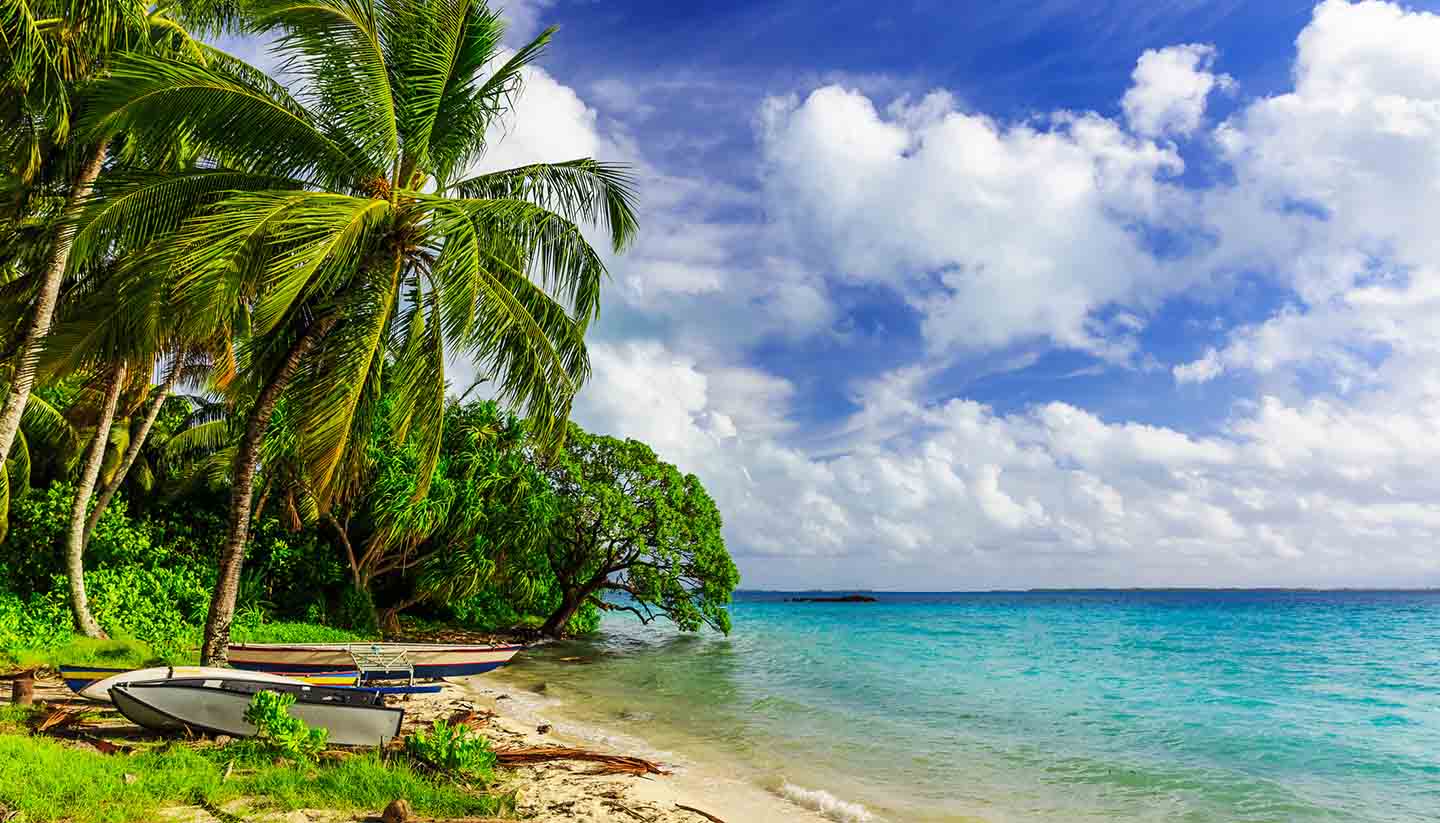
Introducing Kiribati
About kiribati.
- Images of Kiribati
- History, language & culture
- Weather & geography
- Doing business & staying in touch
Plan your trip
- Travel to Kiribati
- Where to stay
While you’re there
- Things to see & do
- Shopping & nightlife
- Food & drink
- Getting around
Before you go
- Passport & visa
- Public Holidays
- Money & duty free
Book your flights
Kiribati travel guide
White sandy beaches and crystal-clear lagoon waters characterise the Republic of Kiribati, which is made up of over 30 coral islands scattered across the Pacific. Kiribati is remote, and the tourism industry remains very much in its infancy – all the more reason to visit sooner rather than later.
They may be relatively unknown, but the isles are peppered with swaying coconut palms, swathed in balmy breezes, and waters glistening in every direction. And so it's hard to feel anything other than intense holiday escapism. While lazing on desolate beaches is a huge draw, Kiribati does have an interesting population of both human and wildlife.
Capital Tarawa is fast becoming one of the most densely populated areas in the Pacific, while Christmas Island, stretching for almost half the land mass of Kiribati, is carpeted with lakes and ponds great for game fishing, and boasts some of the largest colonies of birds.
Other islands include Phoenix, Line and Gilbert – during British rule in the 19th and 20th centuries, Kiribati was known as the Gilbert Islands. In World War II, the islands were occupied by Japan, while in the post-war era the US and UK used Christmas island for nuclear weapons tests. The islands finally became independent in 1979.
Despite Kiribati's colonial history, many of its islands have remained much the same as they've ever been. Locals live off breadfruit, fish and coconuts to this day. The inhabitants of the main island Tarawa also continue to live in raised thatched huts like their ancestors.
You needn't fear a total separation from civilisation, however, as bars, cinemas, cars and the internet are increasingly a part of life in Kiribati. The people aren't unwelcoming, but you're more likely to be greeted by the children than adults, who tend to eye visitors cautiously. Once you break the ice, you'll find a fascinating culture, and plenty of glorious nature to explore.
The tiny nation is only 800 km sq, but if you include the many atolls, this rises to a 3.5 million km square-swathe of the Pacific. Better get the swimming costume on.
811 sq km (313 sq miles).
114,405 (UN estimate 2016).
130.3 per sq km.
President Taneti Mamau since 2016.
Travel Advice
Before you travel.
No travel can be guaranteed safe. Read all the advice in this guide. You may also find it helpful to:
- see general advice for women travellers
- read our guide on disability and travel abroad
- see general advice for LGBT+ travellers
- read about safety for solo and independent travel
- see advice on volunteering and adventure travel abroad
Travel insurance
If you choose to travel, research your destinations and get appropriate travel insurance . Insurance should cover your itinerary, planned activities and expenses in an emergency.
About FCDO travel advice
The Foreign, Commonwealth & Development Office ( FCDO ) provides advice about risks of travel to help you make informed decisions. Find out more about FCDO travel advice .
Follow and contact FCDO travel on Twitter , Facebook and Instagram . You can also sign up to get email notifications when this advice is updated.
This information is for people travelling on a full ‘British citizen’ passport from the UK. It is based on the UK government’s understanding of Kiribati’s current rules for the most common types of travel.
The authorities in Kiribati set and enforce entry rules. If you’re not sure how these requirements apply to you, contact the Fiji High Commission in the UK .
COVID-19 rules
There are no COVID-19 testing or vaccination requirements for travellers entering Kiribati.
Passport validity requirements
To enter Kiribati, your passport must have an ‘expiry date’ at least 6 months after the date you arrive and have at least 2 blank pages.
Check with your travel provider that your passport and other travel documents meet requirements. Renew your passport if you need to.
You will be denied entry if you do not have a valid travel document or try to use a passport that has been reported lost or stolen.
Visa requirements
You can visit Kiribati without a visa for up to one month.
You must hold a ticket for return or onward travel and enough funds for your stay.
The authorities will normally grant you a one-month stay on arrival. You can apply for one-month extensions, up to a maximum of 3 extra months, from the Ministry of Foreign Affairs and Immigration in Bairiki. Your passport must remain valid to extend your stay.
Departure tax
You must pay a 20 Australian dollar departure tax at the airport.
Vaccine requirements
For details about medical entry requirements and recommended vaccinations, see TravelHealthPro’s Kiribati guide .
Customs rules
There are strict rules about goods you can take into or out of Kiribati. You must declare anything that may be prohibited or subject to tax or duty.
There is a strict quarantine regime for importing food, plant and animal (including fish) products to Kiribati. For further information, contact:
Biosecurity Services SPC-Plant Protection Service Private Mail Bag Suva, Fiji Islands
Phone: (679) 3370 733 Fax: (679) 3370 021 Email: [email protected]
Taking Kiribati handicrafts to Australia or New Zealand
Strict Australian or New Zealand import regulations may apply to some Kiribati handicrafts, including straw products and shells. Check Australia travel advice and New Zealand travel advice for details. You can get a phyto-sanitary certificate in Kiribati, but the customs authorities may still confiscate items.
There is a high threat of terrorist attack globally affecting UK interests and British nationals, including from groups and individuals who view the UK and British nationals as targets. Stay aware of your surroundings at all times.
UK Counter Terrorism Policing has information and advice on staying safe abroad and what to do in the event of a terrorist attack. Find out how to reduce your risk from terrorism while abroad .
Terrorism in Kiribati
Although there’s no recent history of terrorism in Kiribati, attacks cannot be ruled out.
Laws and cultural differences
Personal id.
You must always be able to show an official form of ID such as your passport. The police will usually accept a printed copy.
Illegal drugs and prison sentences
Possession or trafficking of drugs is a serious offence in Kiribati, and prison sentences may be heavy.
Public nudity
You should respect local customs about dress, including swimming costumes. Local laws ban public nudity and revealing swimming costumes.
LGBT+ travellers
Same-sex sexual acts are illegal. If found guilty, the penalty could be up to 14 years imprisonment.
Read more advice for LGBT+ travellers .
Internet and phone services
Internet and mobile phone services are available in some parts of Kiribati. Not all of the outer islands are connected. Services can be unreliable and expensive because of the country’s remote location.
Stray dogs have bitten visitors. Be cautious, particularly on the beach. If a dog approaches you, do not run. Reaching down as if to pick up something off the ground can be enough to scare dogs away. If a dog bites you, seek medical attention immediately.
Very few places accept credit cards in Kiribati. There are ATMs at branches of the Bank of Kiribati and ANZ in Betio, Bairiki and Bikenibeu on Tarawa atoll.
Outdoor activities and adventure tourism
Swimming and boating safety.
Do not swim in the lagoon in south Tarawa, as it is highly polluted.
Take great care when swimming in the sea around Kiribati. There are very strong rip tides along coast and reef areas.
Always wear safety equipment during boating trips. Squalls can happen at very short notice.
See water safety on holiday from the Royal Life Saving Society.
Transport risks
Road travel.
If you are planning to drive in Kiribati, see information on driving abroad .
You can use a UK photocard driving licence to drive in Kiribati. If you still have a paper driving licence, you may need to update it to a photocard licence or get the correct version of the international driving permit ( IDP ) as well.
Road conditions are poor on Tarawa, but driving standards are reasonable. Minibuses can be dangerously overloaded.
Extreme weather and natural disasters
Find out what you can do to prepare for and respond to extreme weather and natural hazards .
During the wet season, which normally runs from November to April, there can be strong winds and sea swells. Flooding and coastal inundation can cause disruption to essential services and infrastructure.
Monitor regional and international weather updates from the World Meteorological Organization , the Fiji Meteorological Service and local newspapers.
There can be severe droughts in Kiribati. The authorities may put water restrictions in place.
Before you travel check that:
- your destination can provide the healthcare you may need
- you have appropriate travel insurance for local treatment or unexpected medical evacuation
This is particularly important if you have a health condition or are pregnant.
Emergency medical number
Call 994 and ask for an ambulance.
Contact your insurance company quickly if you’re referred to a medical facility for treatment.
Vaccine recommendations and health risks
At least 8 weeks before your trip:
- check the latest vaccine recommendations for Kiribati
- see where to get vaccines and whether you have to pay on the NHS travel vaccinations page
See what health risks you’ll face in Kiribati .
Drink and use only boiled or bottled water and avoid ice in drinks. Do not eat local shellfish or lagoon fish on Tarawa.
The legal status and regulation of some medicines prescribed or bought in the UK can be different in other countries.
Read best practice when travelling with medicines on TravelHealthPro .
Healthcare in Kiribati
Medical facilities at the general hospital in Tarawa are modest. Elsewhere, nurse practitioners generally staff clinics.
Pharmaceuticals – both prescription and non-prescription medicines – are generally not available. Bring any medicines you need with you.
If you need any non-basic medical treatment, you will usually need medical evacuation from Kiribati. Make sure you have adequate travel health insurance and accessible funds to cover evacuation by air ambulance plus the cost of medical treatment abroad and repatriation.
Travel and mental health
Read FCDO guidance on travel and mental health . There is also mental health guidance on TravelHealthPro .
The Foreign, Commonwealth & Development Office ( FCDO ) cannot provide tailored advice for individual trips. Read this travel advice and carry out your own research before deciding whether to travel.
Emergency services in Kiribati
Telephone 999 (ambulance, fire, police) or local numbers:
Ambulance: 994
Police: 992
Contact your travel provider and insurer
Contact your travel provider and your insurer if you are involved in a serious incident or emergency abroad. They will tell you if they can help and what you need to do.
Refunds and changes to travel
For refunds or changes to travel, contact your travel provider. You may also be able to make a claim through insurance. However, insurers usually require you to talk to your travel provider first.
Find out more about changing or cancelling travel plans , including:
- where to get advice if you are in a dispute with a provider
- how to access previous versions of travel advice to support a claim
Support from FCDO
FCDO has guidance on staying safe and what to do if you need help or support abroad, including:
- getting help if you’re a victim of crime
- what to do if you’re in hospital
- if you’re affected by a crisis , such as a terrorist attack
Contacting FCDO
Follow and contact FCDO travel on Twitter , Facebook and Instagram . You can also sign up to get email notifications when this travel advice is updated.
You can also contact FCDO online .
Help abroad in an emergency
If you are in Kiribati and you need emergency help from the UK government, contact the British High Commission in Wellington, New Zealand , who help British nationals in Kiribati.
FCDO in London
You can call FCDO in London if you need urgent help because something has happened to a friend or relative abroad.
Telephone: 020 7008 5000 (24 hours)
Find out about call charges

Book a Hotel
© Columbus Travel Media Ltd. All rights reserved 2024
- Travel advice
Kiribati travel advice
Explore our complete guide to Kiribati with the latest travel advice for travellers and holidaymakers including official updates and local travel tips for Kiribati.
- Essential travel guide
- Weather & climate
- Travel health
- Covid live updates
- Travel features
- Top travel deals
- Destinations
Kiribati travel guide - essential info
Below is a beginner's guide to Kiribati with essential travel facts such as dominant language spoken, typical flight time from the UK and the local currency. You can also check whether visas are required and what plug adapter you need to pack.
Why visit Kiribati?
Considering a holiday to the Kiribati? Here are some of the very good reasons it makes such a wonderful holiday destination be it for beaches or culture to ensure you get the most out of your 2024/2025 escape.
Kiribati tourist information
Recommended for kiribati.

Kiribati deals >>
Back to top
Kiribati weather
The Kiribati weather guide shows long term monthly averages for South Tarawa .
Kiribati destinations >>

Holiday Autos discount code: up to 10% off global car hire

- Save up to 10% on cheap car hire worldwide
- Exclusive Holiday Autos discount code automatically applied
- Travel before 31st December 2024 (inclusive)
Expires at 23:59 on Tuesday 31st Dec 2024 · View all Holiday Autos offers
Car hire finder
Destination Any destination Australia Cyprus France Germany Greece Ireland Italy Portugal South Africa Spain UK USA Africa North Africa Egypt Morocco South Africa Zimbabwe Asia Far East South East Asia Southern Asia India Indonesia Israel Japan Sri Lanka Taiwan Thailand UAE New South Wales Queensland South Australia Victoria Western Australia Austrian Alps Ibiza Majorca Menorca Alberta British Columbia Quebec Fuerteventura Gran Canaria La Gomera Lanzarote Tenerife Caribbean Antigua Barbados Cuba Jamaica Central America Costa Rica Red Sea Bedfordshire Berkshire Buckinghamshire Cambridgeshire Cheshire City of Bristol City of London Cornwall Cotswolds County Durham Cumbria Derbyshire Devon Dorset East Sussex East Yorkshire Essex Gloucestershire Greater London Greater Manchester Hampshire Herefordshire Hertfordshire Isle of Wight Kent Lake District Lancashire Leicestershire Lincolnshire Merseyside Norfolk North Yorkshire Northamptonshire Northumberland Nottinghamshire Oxfordshire Rutland Shropshire Somerset South Yorkshire Staffordshire Suffolk Surrey Tyne and Wear Warwickshire West Midlands West Sussex West Yorkshire Wiltshire Worcestershire Europe Austria Bulgaria Croatia Cyprus Czech Republic Denmark Finland France Germany Gibraltar Greece Guernsey Hungary Iceland Ireland Isle of Man Italy Jersey Malta Montenegro Netherlands Norway Poland Portugal Romania Slovenia Spain Sweden Switzerland Turkey UK Alps Orlando Corsica Brittany Dordogne French Alps Loire Valley Normandy Provence South of France Corfu Crete Halkidiki Kefalonia Kos Mykonos Peloponnese Rhodes Samos Santorini Skiathos Zante Indian Ocean Mauritius Bali Campania Italian Lakes Italian Riviera Sardinia Sicily Tuscany Venetian Riviera Italian Alps Puglia Mediterranean Caribbean Coast Middle East North America Canada Mexico USA Oceania Australia New Zealand Algarve Madeira Scandinavia Balearic Islands Canary Islands Costa Almeria Costa Blanca Costa Brava Costa de la Luz Costa del Sol Costa Dorada Swiss Alps Antalya Coast Bodrum and Izmir Coast Dubai England Northern Ireland Scotland Wales California D.C. Florida
Check the latest travel advice on visiting Kiribati from official government sources (in english) from around the world including entry requirements and travel restrictions.
- UK traveller advice for Kiribati - UK FCDO
- Irish traveller advice for Kiribati - Department of Foreign Affairs, Ireland
- Canadian travel advice for Kiribati - Government of Canada
- US travel advisories for Kiribati - US Department of State
- Safe travel advisories for Kiribati - Ministry of Foreign Affairs, New Zealand
Learn more about the current safety and security risks from terrorism, natural disasters and more. Read about the local laws and customs to consider when travelling around Kiribati.
Note : UK FCDO - UK Foreign, Commonwealth & Development Office
FCDO travel advice
Destination Any destination France Germany Greece India Italy Portugal Spain Turkey USA Algeria Angola Benin Botswana Burkina Faso Burundi Cameroon Cape Verde Central African Republic Chad Congo-Brazzaville Congo-Kinshasa Djibouti Egypt Equatorial Guinea Eritrea Eswatini Ethiopia Gabon Gambia Ghana Guinea Guinea-Bissau Ivory Coast Kenya Lesotho Liberia Libya Malawi Mali Mauritania Morocco Mozambique Namibia Niger Nigeria Rwanda Sao Tome and Principe Senegal Sierra Leone Somalia South Africa South Sudan St Helena, Ascension and Tristan da Cunha Sudan Tanzania Togo Tunisia Uganda Western Sahara Zambia Zimbabwe Falkland Islands South Georgia and South Sandwich Islands Afghanistan Armenia Azerbaijan Bahrain Bangladesh Bhutan Brunei Cambodia China East Timor Gaza Strip Georgia Hong Kong India Indonesia Iran Iraq Israel Japan Jordan Kazakhstan Kuwait Kyrgyzstan Laos Lebanon Macau Malaysia Maldives Mongolia Myanmar Nepal North Korea Oman Pakistan Philippines Qatar Russia (Central Asia) Russia (Far East) Saudi Arabia Singapore South Korea Sri Lanka Syria Taiwan Tajikistan Thailand Turkmenistan UAE Uzbekistan Vietnam West Bank Yemen Anguilla Antigua Aruba Bahamas Barbados Bonaire British Virgin Islands Cayman Islands Cuba Curacao Dominica Dominican Republic Grenada Guadeloupe Haiti Jamaica Martinique Montserrat Saba Sint Eustatius Sint Maarten St Barthelemy St Kitts and Nevis St Lucia St Martin St Vincent and the Grenadines Trinidad and Tobago Turks and Caicos Islands Belize Costa Rica El Salvador Guatemala Honduras Nicaragua Panama Albania Andorra Austria Belarus Belgium Bosnia and Herzegovina Bulgaria Croatia Cyprus Czech Republic Denmark Estonia Faroe Islands Finland France Germany Gibraltar Greece Hungary Iceland Ireland Italy Jan Mayen Kosovo Latvia Liechtenstein Lithuania Luxembourg Macedonia Malta Moldova Monaco Montenegro Netherlands Norway Poland Portugal Romania Russia San Marino Serbia Slovakia Slovenia Spain Svalbard Sweden Switzerland Turkey Ukraine British Indian Ocean Territory Comoros Madagascar Mauritius Mayotte Reunion Seychelles Bermuda Canada Greenland Mexico St Pierre and Miquelon USA Australia Federated States of Micronesia Fiji French Polynesia Kiribati Marshall Islands Nauru New Caledonia New Zealand Palau Papua New Guinea Pitcairn Island Samoa Solomon Islands Tonga Tuvalu Vanuatu Wallis and Futuna Argentina Bolivia Brazil Chile Colombia Ecuador French Guiana Guyana Paraguay Peru Suriname Uruguay Venezuela
Kiribati travel health
Find out more about staying safe when travelling to Kiribati with the latest guidance on required vaccinations and recommended medication to take with you.
- Vaccines & medicines for Kiribati - CDC
- Health & vaccinations for Kiribati - TravelHealthPro, NaTHNac
- How to stay safe & healthy in Kiribati - Fit for Travel, Public Health Scotland
Check out the general travel tips for staying safe and healthy in Kiribati, risks of preventable diseases and what to pack.
Note : CDC - Centers for Disease Control and Prevention
Kiribati covid live updates
Check the latest live updates on Covid-19 in Kiribati with the vaccination requirements, current available statistics and up-to-date travel advice from government agencies.
- Travellers' health for Kiribati - Government of Kiribati
- Coronavirus timeline in Kiribati - Our World in Data
Kiribati travel features
Do you want to learn more about Kiribati? Read our latest features covering travel tips and insider destination guides on where to go and what to do in Kiribati.
We don't currently have any travel features on Kiribati. Discover more about holiday destinations around the world with this selection of general travel articles.
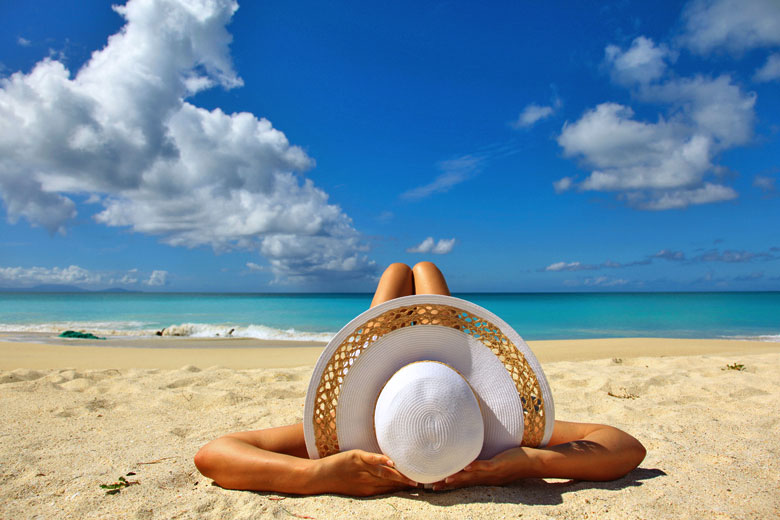
Kiribati FAQs
Read our frequently asked questions about travelling to Kiribati including the current entry restrictions, covid rules, driving side, electrical plugs used and much more.
Are there entry restrictions to Kiribati due to Covid-19?
Kiribati is open to fully vaccinated travellers only from the UK. Proof of full Covid-19 vaccination required for arrivals from the UK. Further test during the first 3 days for all arrivals. Check out Government of Kiribati for more information.
Do I need to quarantine in the UK if I travel from Kiribati?
You do not need to quarantine on arrival in the UK from Kiribati. The UK no longer requires a passenger locator form, Covid-19 test or proof of vaccination.
What is the time difference between Kiribati and the UK?
The time difference between Kiribati and the UK is UK time+12 to UK time+14 hours .
What is the main language spoken in Kiribati?
The main languages spoken in Kiribati are Gilbertese and English . Learn a language for Kiribati with Rosetta Stone * , Busuu * and Rocket Languages * .
What is the currency in Kiribati?
The currency in Kiribati is the Kiribati Dollar ( KID ) and the Australian Dollar ( AUD ).
Which plugs are used in Kiribati?
Kiribati uses electrical plug type I (240 Volts) .
Which side of the road do they drive on in Kiribati?
They drive on the left side of the road in Kiribati. Find out more about driving in Kiribati with International Drivers Association * .
Travel advice by country
Country name All countries - summary Algarve Balearic Islands Barbados Canary Islands Croatia Cyprus Egypt Faroe Islands France Germany Greece Ireland Italy Jamaica Madeira Maldives Malta Portugal Spain Turkey UAE UK USA Algeria Angola Benin Botswana Burkina Faso Burundi Cameroon Cape Verde Central African Republic Chad Congo-Brazzaville Congo-Kinshasa Djibouti Egypt Equatorial Guinea Eritrea Ethiopia Gabon Gambia Ghana Guinea Guinea-Bissau Ivory Coast Kenya Lesotho Liberia Libya Malawi Mali Mauritania Morocco Mozambique Namibia Niger Nigeria Rwanda Sao Tome and Principe Senegal Sierra Leone Somalia South Africa South Sudan Sudan Swaziland Tanzania Togo Tunisia Uganda Western Sahara Zambia Zimbabwe Antarctica French Southern and Antarctic Lands South Georgia and South Sandwich Islands Afghanistan Armenia Azerbaijan Bahrain Bangladesh Bhutan Brunei Cambodia China East Timor Georgia Hong Kong India Indonesia Iran Iraq Israel Japan Jordan Kazakhstan Kuwait Kyrgyzstan Laos Lebanon Macau Malaysia Maldives Mongolia Myanmar Nepal North Korea Oman Pakistan Philippines Qatar Russia (Central Asia) Russia (Far East) Saudi Arabia Singapore South Korea Sri Lanka Syria Taiwan Tajikistan Thailand Turkmenistan UAE Uzbekistan Vietnam Yemen Anguilla Antigua Aruba Bahamas Barbados Bonaire British Virgin Islands Cayman Islands Cuba Curacao Dominica Dominican Republic Grenada Guadeloupe Haiti Jamaica Martinique Montserrat Puerto Rico Saba Sint Eustatius Sint Maarten St Barthelemy St Kitts and Nevis St Lucia St Martin St Vincent and the Grenadines Trinidad and Tobago Turks and Caicos Virgin Islands Belize Costa Rica El Salvador Guatemala Honduras Nicaragua Panama Albania Andorra Austria Belarus Belgium Bosnia and Herzegovina Bulgaria Croatia Cyprus Czech Republic Denmark Estonia Faroe Islands Finland France Germany Gibraltar Greece Guernsey Hungary Iceland Ireland Isle of Man Italy Jan Mayen Jersey Kosovo Latvia Liechtenstein Lithuania Luxembourg Malta Moldova Monaco Montenegro Netherlands North Macedonia Norway Poland Portugal Romania Russia San Marino Serbia Slovakia Slovenia Spain Svalbard Sweden Switzerland Turkey UK Ukraine British Indian Ocean Territory Christmas Island Cocos (Keeling) Islands Comoros Madagascar Mauritius Mayotte Reunion Seychelles Bermuda Canada Greenland Mexico St Pierre and Miquelon USA American Samoa Australia Cook Islands Federated States of Micronesia Fiji French Polynesia Guam Kiribati Marshall Islands Midway Island Nauru New Caledonia New Zealand Niue Norfolk Island Northern Mariana Islands Palau Papua New Guinea Pitcairn Island Samoa Solomon Islands Tokelau Tonga Tuvalu Vanuatu Wake Island Wallis and Futuna Algarve Azores Madeira Argentina Bolivia Brazil Chile Colombia Ecuador Falkland Islands French Guiana Guyana Paraguay Peru Suriname Uruguay Venezuela Balearic Islands Canary Islands England Northern Ireland Scotland Wales Alabama Alaska Arizona Arkansas California Colorado Connecticut D.C. Delaware Florida Georgia Hawaii Idaho Illinois Indiana Iowa Kansas Kentucky Louisiana Maine Maryland Massachusetts Michigan Minnesota Mississippi Missouri Montana Nebraska Nevada New Hampshire New Jersey New Mexico New York North Carolina North Dakota Ohio Oklahoma Oregon Pennsylvania Rhode Island South Carolina South Dakota Tennessee Texas Utah Vermont Virginia Washington West Virginia Wisconsin Wyoming
Be inspired
Get your weekly fix of holiday inspiration from some of the world's best travel writers plus save on your next trip with the latest exclusive offers
We promise not to share your details
Explore holidays in the sun for less
- Beach holidays
- Family holidays
- City breaks
- Summer holidays
- Winter sun holidays
- Holiday offers
- Top travel brands
- Airlines & flights
- Discount hotels
- Airport parking deals
- Jet2holidays
- easyJet holidays
- Love Holidays
- British Airways
More holidays
Airport parking
- Manchester Airport
- Stansted Airport
- Bristol Airport
- Luton Airport
- Birmingham Airport
- Edinburgh Airport
- Gatwick Airport
- Glasgow Airport
- Newcastle Airport
More parking
Airport lounges
- Heathrow Airport
More lounges
- Pinterest (1 share)
- Company History
- Mission Statement
- Philippines
- South Africa
- Afghanistan
- American Samoa
- Antigua and Barbuda
- British Virgin Islands
- Burkina Faso
- Canary Islands
- Cayman Islands
- Central African Republic
- Christmas Island
- Cocos (Keeling) Islands
- Cook Islands
- Cote d'Ivoire
- Democratic Republic of the Congo
- Dominican Republic
- Easter Island
- El Salvador
- Equatorial Guinea
- Falkland Islands
- Faroe Islands
- French Guiana
- French Polynesia
- Guinea-Bissau
- Liechtenstein
- Madeira Islands
- Marshall Islands
- Netherlands
- New Caledonia
- New Zealand
- Norfolk Island
- North Korea
- North Macedonia
- Northern Mariana Islands
- Palestinian Territories
- Papua New Guinea
- Pitcairn Islands
- Puerto Rico
- Republic of the Congo
- Saint Barthelemy
- Saint Helena
- Saint Kitts and Nevis
- Saint Lucia
- Saint Martin
- Saint Pierre-et-Miquelon
- Saint Vincent and the Grenadines
- Sao Tome and Principe
- Saudi Arabia
- Sierra Leone
- Sint Eustatius
- Solomon Islands
- South Georgia and the South Sandwich Islands
- South Korea
- South Sudan
- Switzerland
- Trinidad and Tobago
- Turkmenistan
- Turks and Caicos Islands
- U.S. Virgin Islands
- United Arab Emirates
- United Kingdom
- United States
- Wake Island
- Western Sahara
- Travel Vaccines
- Travel Health Consultations
- Travellers’ Diarrhea Kits
- Dengue Fever Prevention
- Malaria Prevention
- Chikungunya Prevention
- Zika Prevention
- Ebola Virus
- Yellow Fever
- Hepatitis A
- Japanese Encephalitis
- Hepatitis B
- Tickborne Encephalitis (TBE)
- Tetanus-Diphtheria-Pertussis
- Measles-Mumps-Rubella
- Influenza (Flu)
- Blood Tests
- Vitamin Injections
- Physician Referral Program
- London Bridge Clinic
- London – Euston Travel Clinic

Travel Vaccines and Advice for Kiribati

Kiribati is a collection of 33 islands with the largest raised coral atoll in the world. It is a country with a rich and peculiar history and a fantastic variety of water activities.
Kiribati is in the central Pacific Ocean about 4,000 kilometres southwest of Hawaii.
On This Page: Do I Need Vaccines for Kiribati? Do I Need a Visa to Travel to Kiribati? What is the Climate Like in Kiribati? How Safe is Kiribati? Explore the Waters and Islands of Kiribati What Should I Pack for Kiribati? Embassy of the United Kingdom in Kiribati
Do I Need Vaccines for Kiribati?
Yes, some vaccines are recommended or required for Kiribati. The National Travel Health Network and Centre and WHO recommend the following vaccinations for Kiribati: COVID-19 , hepatitis A , hepatitis B , typhoid , yellow fever , rabies and tetanus .
See the bullets below to learn more about some of these key immunisations:
- COVID-19 – Airborne – Recommended for all travellers
- Hepatitis A – Food & Water – Recommended for most travellers to the region, especially if unvaccinated.
- Hepatitis B – Blood & Body Fluids – Recommended for travellers to most regions.
- Tetanus – Wounds or Breaks in Skin – Recommended for travelers to most regions, especially if not previously vaccinated.
- Typhoid – Food & Water – Jab lasts 3 years. Oral vaccine lasts 5 years, must be able to swallow pills. Oral doses must be kept in refrigerator.
- Yellow Fever – Mosquito – Required if travelling from a country with risk of yellow fever transmission.
- Rabies – Saliva of Infected Animals – Moderate risk country. Vaccine recommended for long-stay travellers and those who may come in contact with animals.
See the tables below for more information:
Mosquito-borne disease is present on the islands. Dengue can be found in some areas. Protect yourself through use of repellents and netting.
See our vaccinations page to learn more about these infections and vaccines. Ready to protect yourself? Book your travel health appointment today by calling or schedule online now .
Do I Need a Visa to Travel to Kiribati?
Kiribati does not require a visa for a stay of one month or less. Passports must be valid for at least six months. Proof of onward travel and sufficient funds may be required at entry. Proof of yellow fever vaccination may be required if you are travelling from a region where yellow fever is present.
A departure tax of AU$20 is applied to all individuals leaving Kiribati.
Sources: Embassy of Kiribati and GOV.UK
What is the Climate Like in Kiribati?
The climate in Kiribati is tropical with wet and dry seasons, though they vary by location.
In the west (Tarawa), the dry season is from June to October, with October being the driest month. The wet season is from November to April.
In the east (Kiritimati), the wet period is from January to June, with the dry season being from July to December.
The air temperature is connected to the temperature of the surrounding waters. Temperatures change very little between seasons with heat and humidity being rather constant. That said, rainfall varies each year because of El Nino and La Nina.
How Safe is Kiribati?
Kiribati is a relatively safe destination. Like most other holiday spots, keep watch of your belongings and avoid scams.
Do not drink water unless it is bottled or sterilized. You should also cook vegetables and peel fruit before eating them.
Though Kiribati is in an area of high seismic activity, the government has limited ability to notify of natural disasters. Remember to go to higher ground in the event of such an emergency.
Motoring in Kiribati can be dangerous. Drinking and motoring is common in Kiribati, especially on weekends. Be very aware of your surroundings and take extra caution. After heavy rain and high tides some road areas can be flooded.
Explore the Waters and Islands of Kiribati
Kiribati is a fantastic destination for travellers interested in water activities. Some of the most popular activities include:
- Fishing – Kiribati is well suited for serious anglers. There are bonefish, trevally and blue fin in the waters. Kiritimati Island is recommended for fishing with its hard sand flats perfect for fly fishing.
- Surfing – Many islands have ample opportunities for surfing. Some breaks off of Kiritimati, Tarawa and the Gilberts should only be for experienced surfers. Fanning Island is the best out of the three for surf with consistent swell nearly all the year.
- Diving/Snorkeling – Diving and snorkeling adventures are available through accredited dive masters. Ensure you are using an approved provider to avoid any potential mishaps.
What Should I Pack for Kiribati?
Think ahead on what to pack by looking through these suggestions:
- Proper Clothing – Kiribati can often be hot and humid due to its tropical climate and wet season. Be sure to pack for the time of year and the activities you wish to do. Consider items such as sun cream, water-protective gear, and bathing suits.
- Insect Repellents – With dengue fever in Kiribati, repellents are a must.
- Copies of Travel Documents – In case of lost luggage or theft, having copies of documents is a must.
Embassy of the United Kingdom in Kiribati
If you are in Kiribati and have an emergency (for example, been attacked, arrested or someone has died) contact the nearest consular services. Contact the embassy before arrival if you have additional questions on entry requirements, safety concerns or are in need of assistance.
While there is no consulate or embassy in Kiribati, it is served by the British embassy in Fiji:
British High Commission Suva 47 Gladstone Road Suva Fiji Telephone: +679 3229 100 Emergency Phone: +679 3304746 Contact Form: Click Here
Ready to start your next journey? Ring us up at or book online now !

- Privacy Policy
- Automatic Data Collection Statement
- Countries visited: 115
- Currently in : Singapore 🇸🇬
- Partner with us
- SOLO FEMALE TRAVELERS COMMUNITY
Disclaimer: This page may contain affiliate links. Please see our disclaimer policy here . Never leave without travel insurance .
Everything you need to know about Kiribati
Kiribati (pronounced Kiribas) is one of the most unique countries in the world and, with around 5,000 visitors a year, also one of the least visited .
But its peculiarities don’t end there. Geographically, the country is on both sides of the Equator , the northern and southern hemisphere, as well as, factually, on either side of the Date Line.
From its vast geographical expanse, 3,500,000 square kilometres, 99.9% of which is water, to the fact that it is one of the three most threatened nations by climate change, to the fact that the capital island of Tarawa is in sections just as wide as a causeway, Kiribati is a singular place to visit.
Since 1995, Kiribati decided that the entire country would be on the same timezone along with the rest of the Pacific nations, and so the International Date Line had to be modified. A similar thing happened in American Samoa , although the other way, as the island wanted to remain on the same as the US of which it is a territory.
Where is Kiribati
Kiribati is made of three island groups, the Gilbert Islands, the Line Islands and the Phoenix Islands, a UNESCO site and one of the world’s largest marine protected areas .
All three island groups are located near the Equator and spread from the Marshall Islands in the West to the Cook Islands on the southeast.
The country was originally called the Gilbert Islands but uses the local translation of the name since independence from the British Empire in 1979, like Tuvalu .
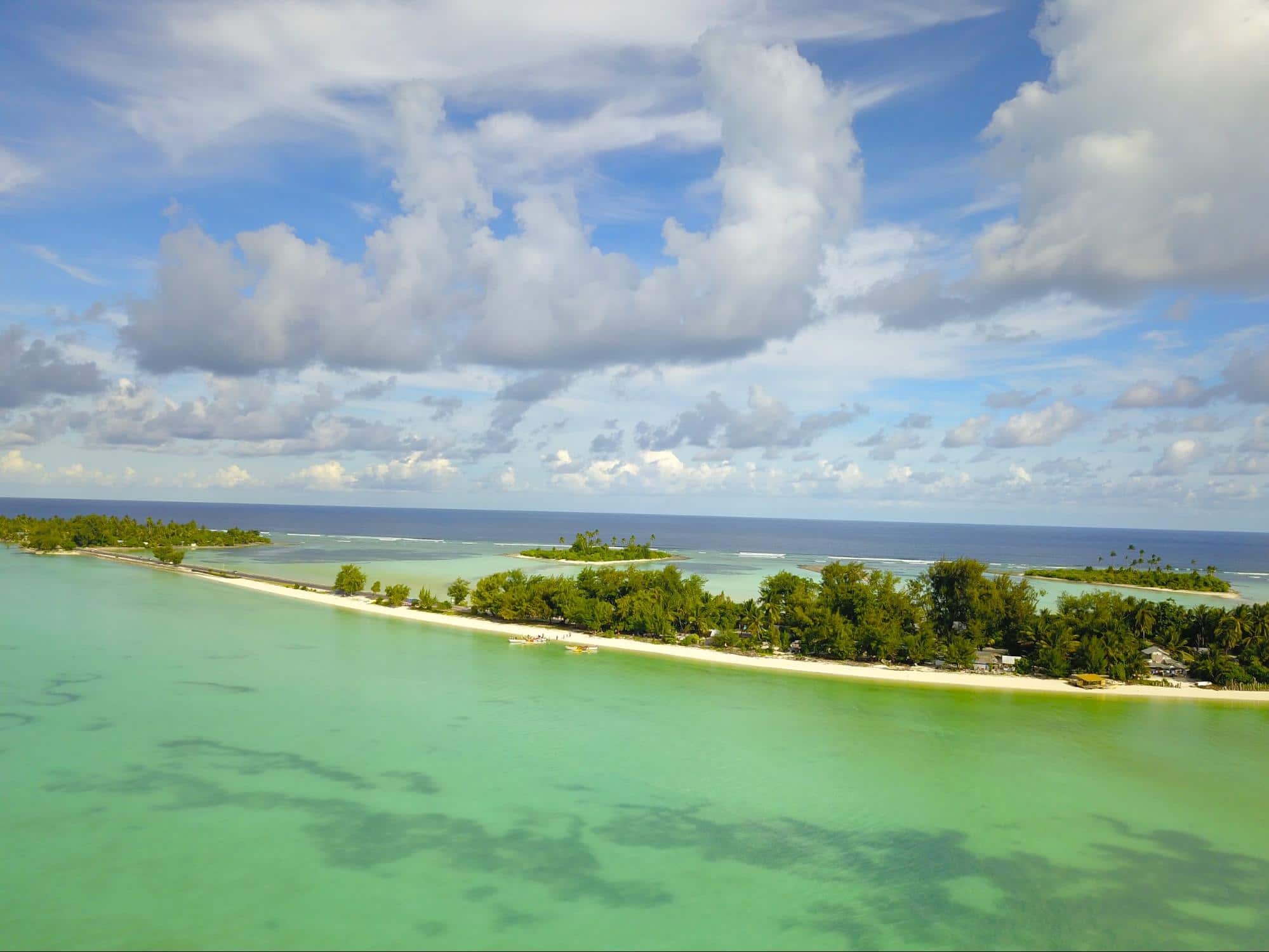
Despite its large size, only a small portion of the country is made of land, around 811 square kilometers of the 3.5 Million, 75% of which is made up by Kiritimati Islands (also known as Christmas Island which is the local translation, “ti” is pronounced as “s” in I-Kiribati language).
The majority of Kiribati is made of coral atolls, 32 of them, and highly susceptible to climate change because of its low altitude. There is also one raised coral island called Banaba.
The capital of Tarawa is part of the Gilbert Islands and it is where a large portion of the population live. However, the population is widely spread across 21 islands and there is a network of internal flights with Air Kiribati and ferry services that connect the main islands.
Is Kiribati sinking?
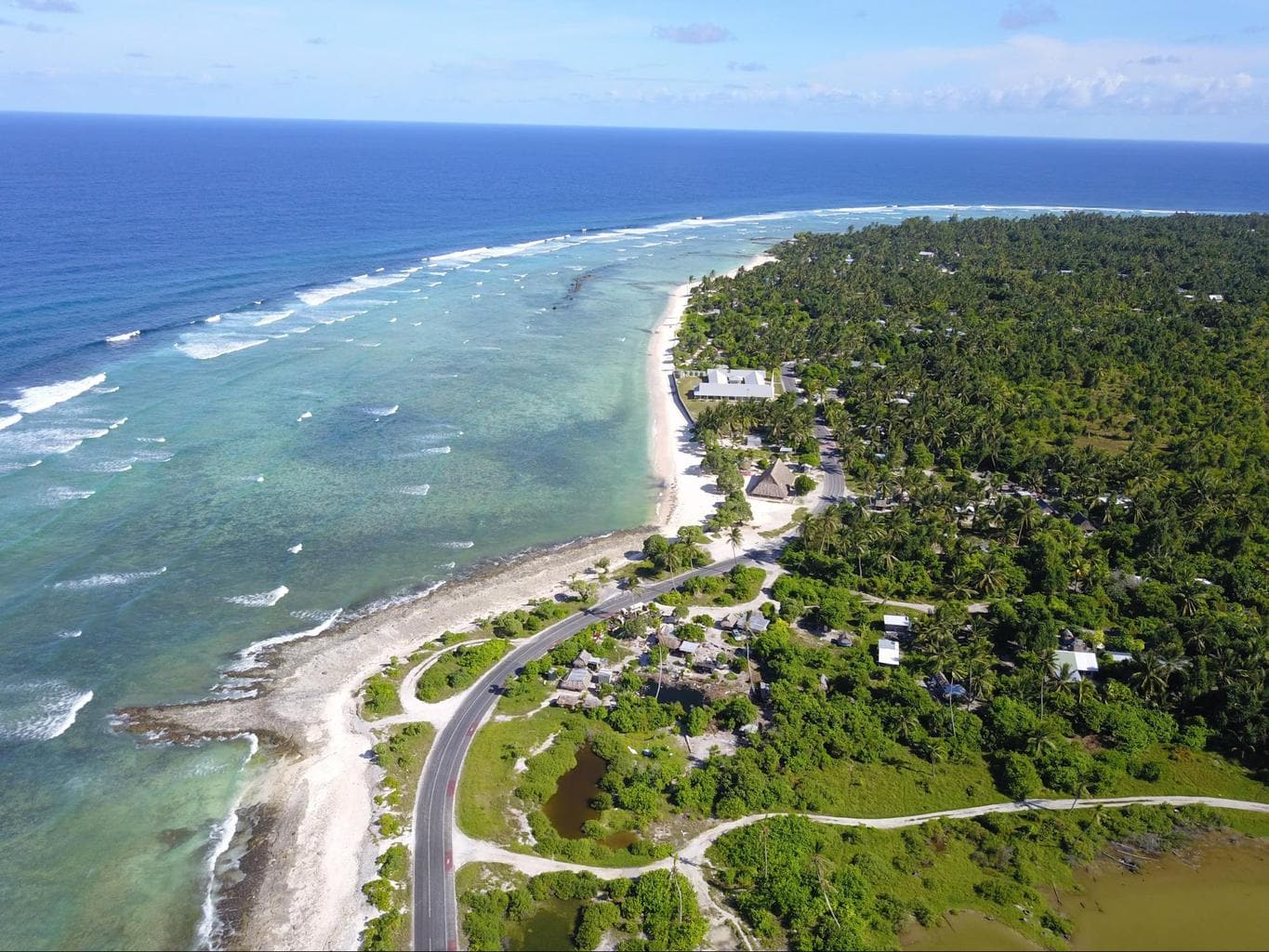
Like Tuvalu and the Maldives , and other delta cities like Dhaka , it is widely accepted that Kiribati is sinking, drowning under the rising seas, as reported by the Intergovernmental Panel on Climate Change scenarios which estimates that the 1.5 degree Celsius increase in global temperature will generate a global sea-level rise of between 1.7 and 3.2 feet by 2100.
As Kiribati’s highest point is only 3m, the country is at a very tangible and immediate risk of largely disappearing under the sea.
The country has seen scientists and researchers come write studies on the impact of climate change and, on the ground, the risk is visible.
I visited Kiribati after an unusually high tide and the guest house I was staying at, right by the sea, had to place sandbags all round it to prevent the waters from flooding it.
Interestingly, the owner, a British national born and raised in Tarawa to civil servant parents during colonial times, insisted that the country was not sinking and that coral atolls, living creatures, would rise and flow with the rising seas.
The former President, Anote Tong, seems to think otherwise. He has been a pioneer supporter of the idea of climate change impact on low-lying atoll islands through published articles, a 2015 TED talk , and even a movie.
After his third term ended, Tong championed a film about the impact of climate change on Kiribati that premiered at the 2018 Sundance Festival: Anote’s Ark .
Tong coined the term “ migration with dignity ” which he prefers to refer to his country’s situation instead of the media’s preference for climate refugees. For that, he was in government in 2014 when Kiribati purchased land in Fiji to relocate its population in case Kiribati disappears.
History of Kiribati
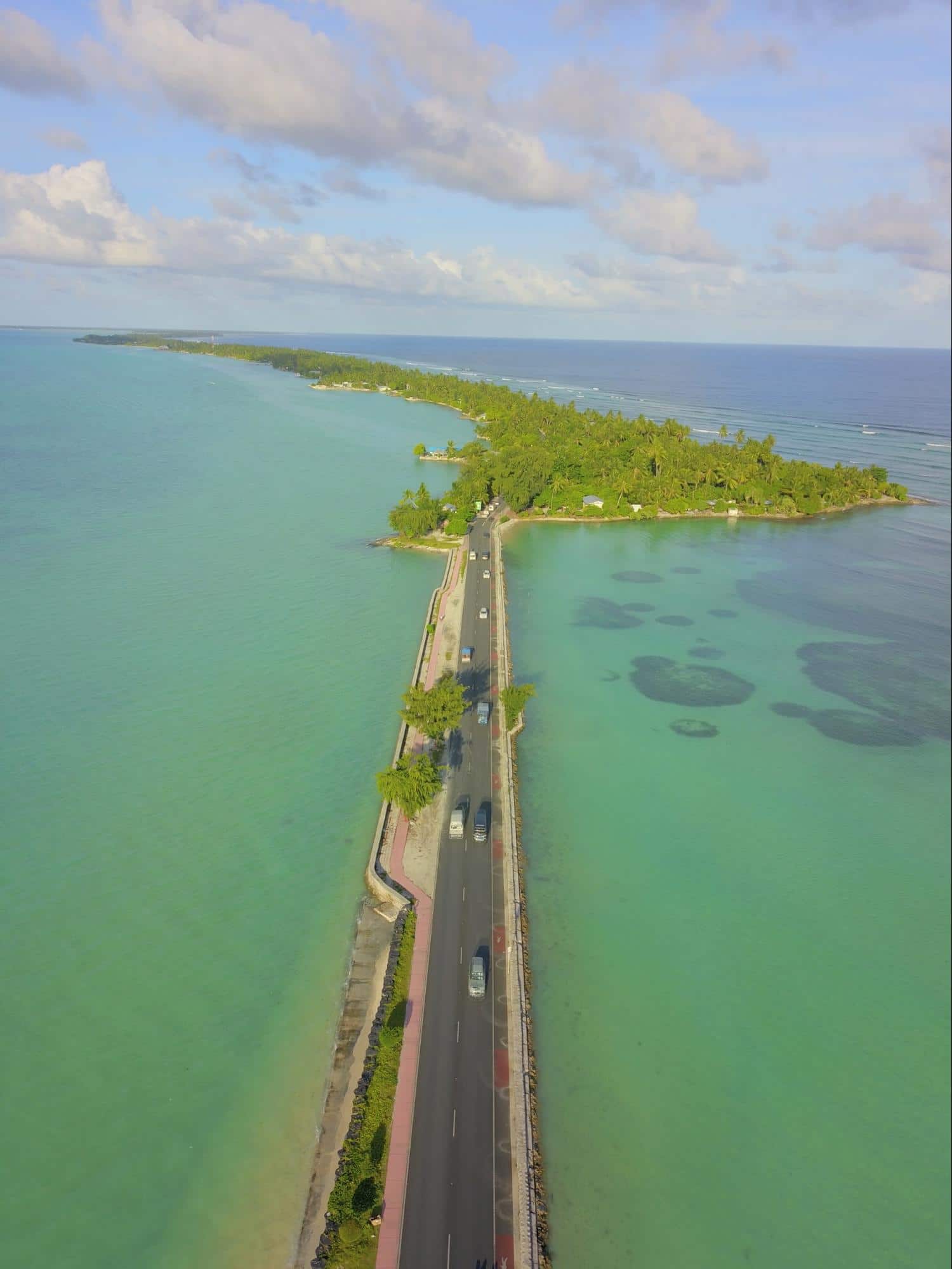
Kiribati was populated by Mircronesians believed to come from Southeast Asia or Indonesia before the arrival of Samoans and Fijians between the 14th to the 16th century.
Its English name was given by an English explorer called Gilbert who visited the islands in the 18th century, before they became a British Protectorate in 1892 together with Tuvalu , and a colony in 1916.
Unlike Tuvalu, Kiribati was invaded by Japanese forces during WWII and suffered major destruction. Some of the remnants of the war can be seen in the Japanese guns found on Tarawa’s shore.
Like Nauru , phosphate was discovered in some parts of Kiribati and mined by the British, who even relocated the population of Banaba Island to Fiji to facilitate mining at the end of WWII.
Together with neighbouring Marshall Islands, Kiribati was the site of various British and US nuclear tests after WWII called operation Grabble mostly launched on Kiritimati Island and Malden Islands between 1957 and 1962.
The results of the test were catastrophic on the local population and the civilian and military personnel from the US, UK, New Zealand, Fiji and Australia, all of which were British colonies at the time. Marine and wildlife were also affected.
Today, Kiritimati is a protected area and an important fishing destination worldwide.
Things to do in Kiribati
The majority of the visitors to Kiribati will either visit Tarawa or Kiritimati . Given that they are not connected and that there are very few flights to either, it is unlikely that you will visit both, although I highly recommend it.
If you are going to only visit one of the two, the below should help you figure out which one will be of most interest.
Things to do on Tarawa Island
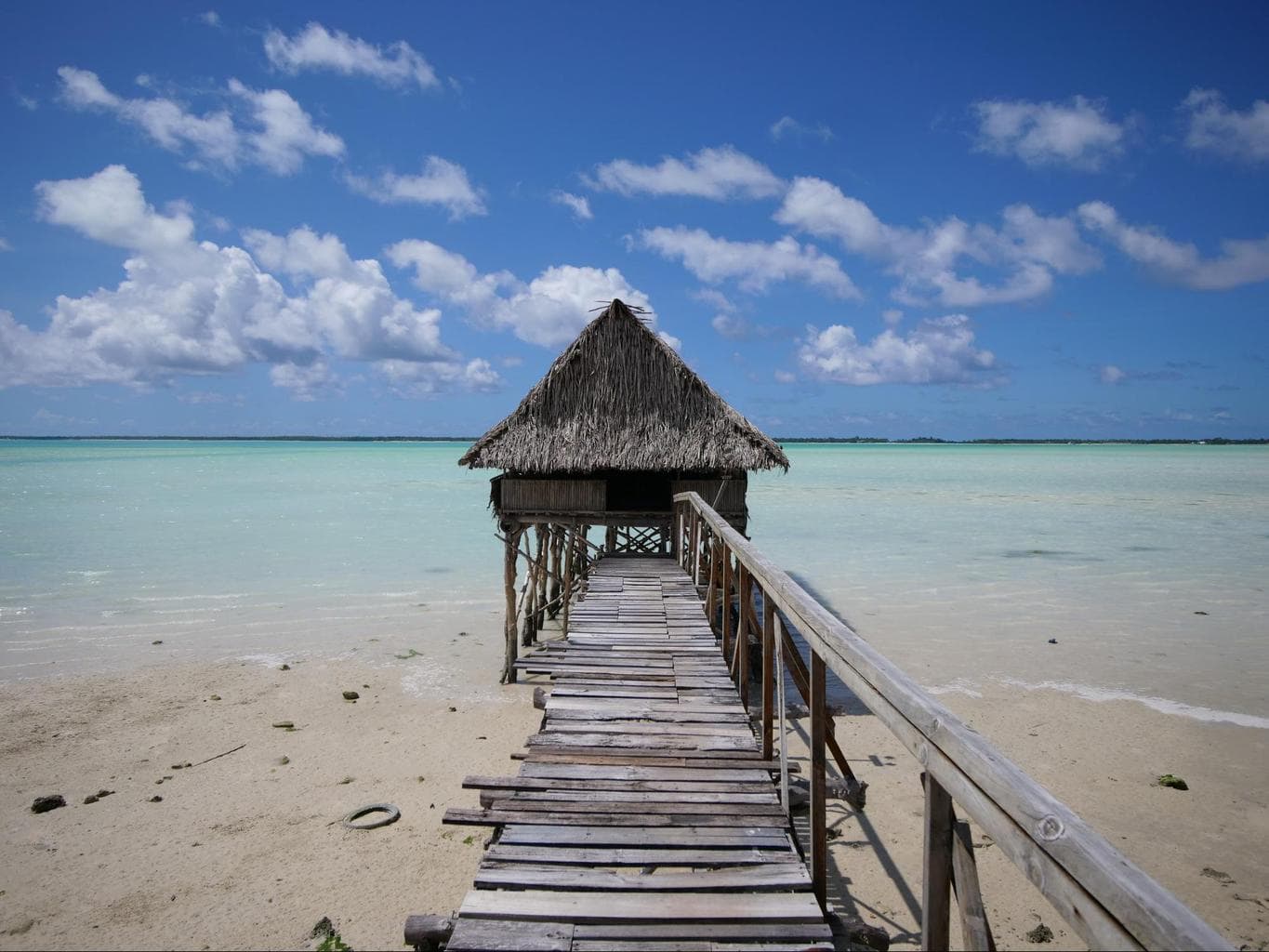
The island of Tarawa is relatively large when compared to similar atoll islands but it is quite small overall so you will be able to see and do everything in a couple of days as the Nauru Airlines flights allow.
Between a third and half of the population of Kiribati lives in Tarawa, the majority of them in South Tarawa which has proper infrastructure, paved roads and urban centers.
Since 2017, South Tarawa causeways have connected the south from Betio to Buota. Given the 40km/h speed limit, it takes an hour to drive end to end.
In contrast, North Tarawa is made of sparsely populated islands connected at low tide and without any paved roads.
The majority of visitors will stay in South Tarawa and perhaps venture to North Tarawa on a day excursion or book a simple hut for a couple of days in true isolation.
Rent a car and explore.
WWII remnants
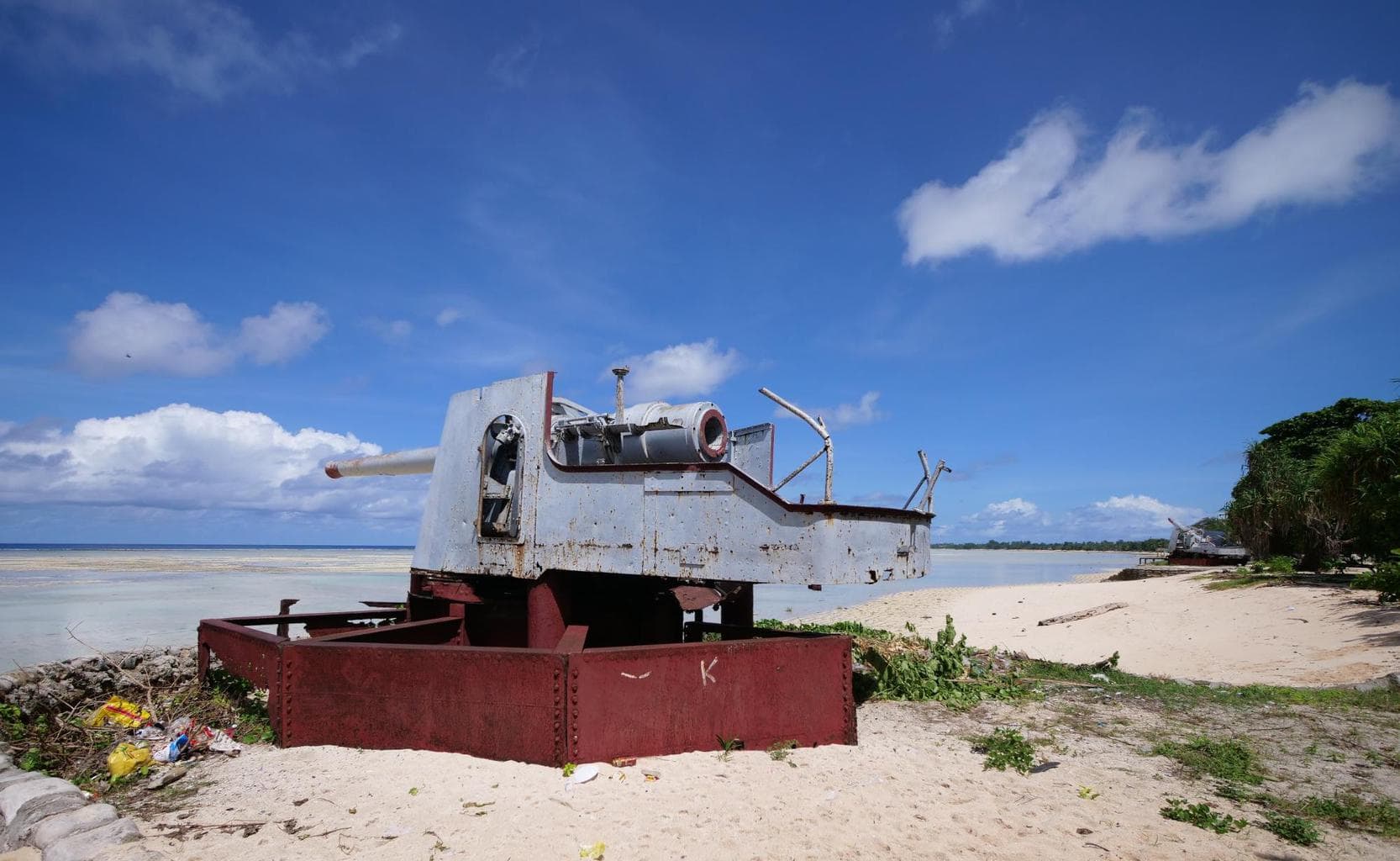
The Battle of Tarawa, known as Operation Galvanic , is an infamous part of WWII because as many US personnel died in the 72 hours of the battle as they did in the 6 months of the Solomon Islands Battle of Guadalcanal.
The battle was expected to be a stepping stone in the US liberation of the Pacific, from the Solomon Islands to the Marshall Islands, and subsequently towards Japan . But the US troops encountered lots of challenges on their arrival which not only delayed the victory but also caused many life losses.
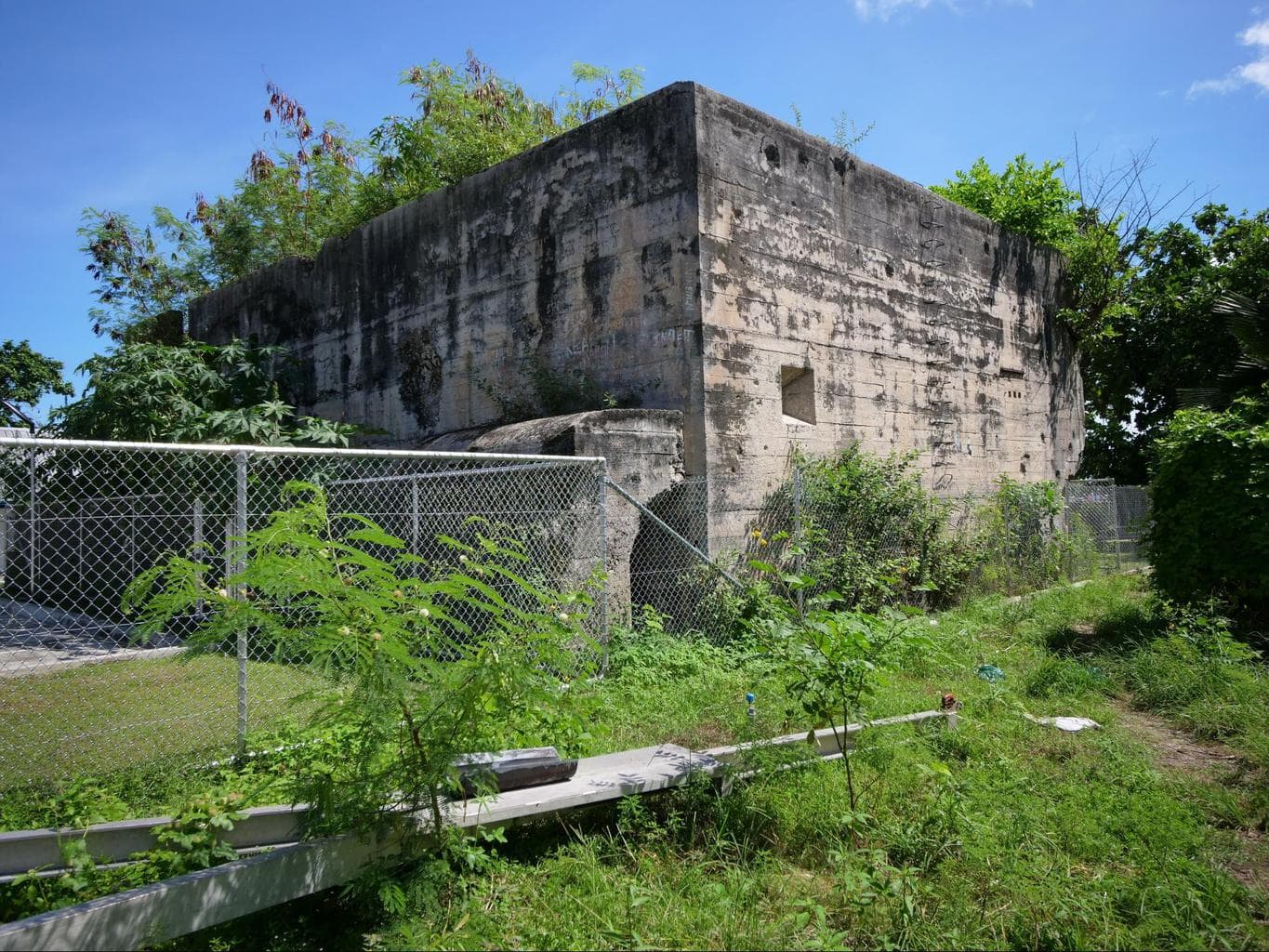
Today, you can still spot the remnants of the Japanese occupation on the island if you look closely. There is a set of four anti-aerial guns placed on the beach where they were left by the Japanese when they wanted to secure the island from invasion.
There is also a Japanese Command Bunker by the side of the road that is easily found when you drive and today fenced off and not possible to visit, and located on the grounds of a Mormon church.
Photograph colorful churches
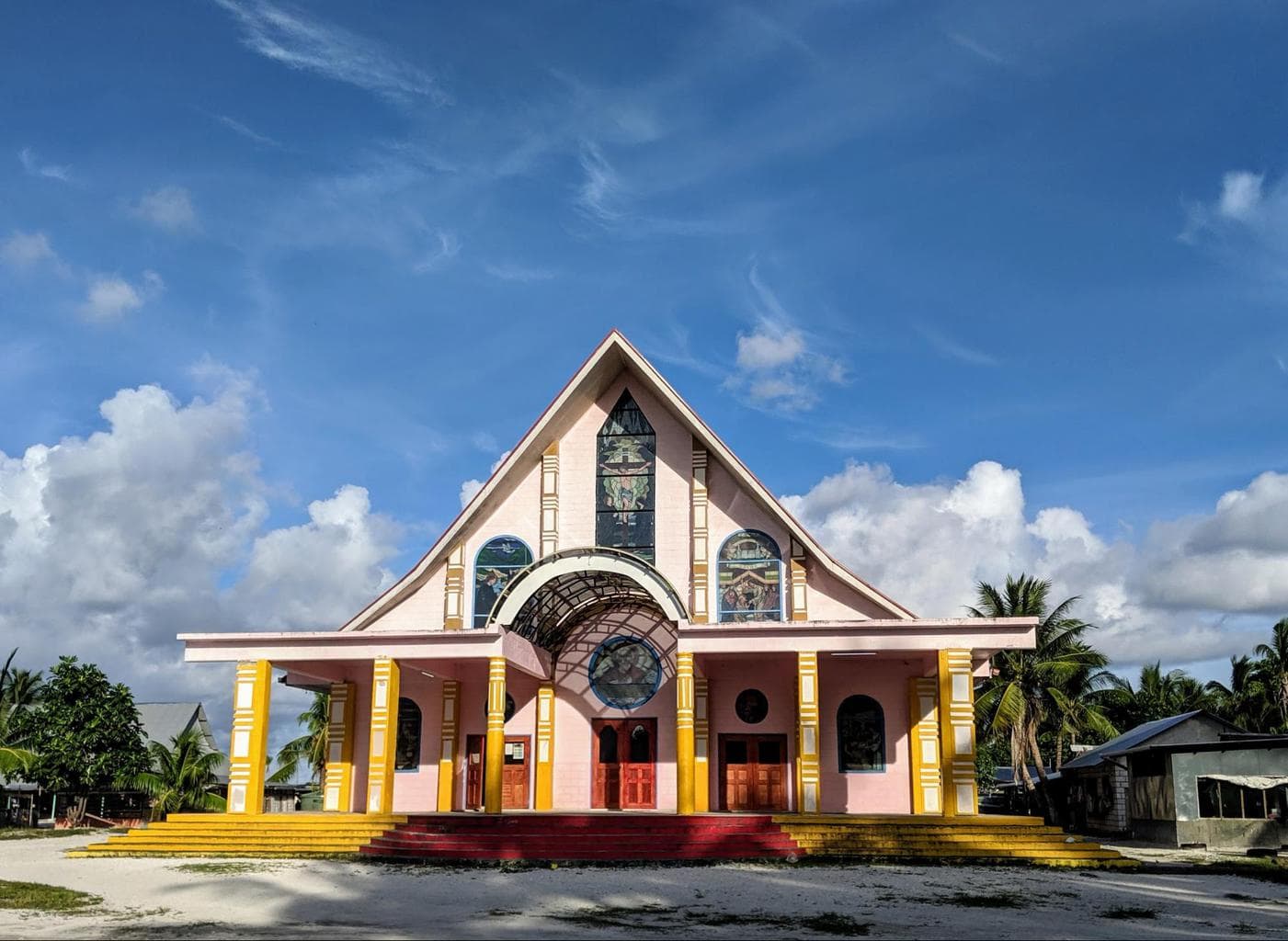
As you explore Tarawa you will notice the island is dotted with colorful churches with beautifully decorated facades and front gates . I have not seen such a style anywhere else in the Pacific and they are all well worth a stop.
Inside, the walls are sparsely decorated and there are no benches, instead, devotees sit on the floor for service.
Explore North Tarawa
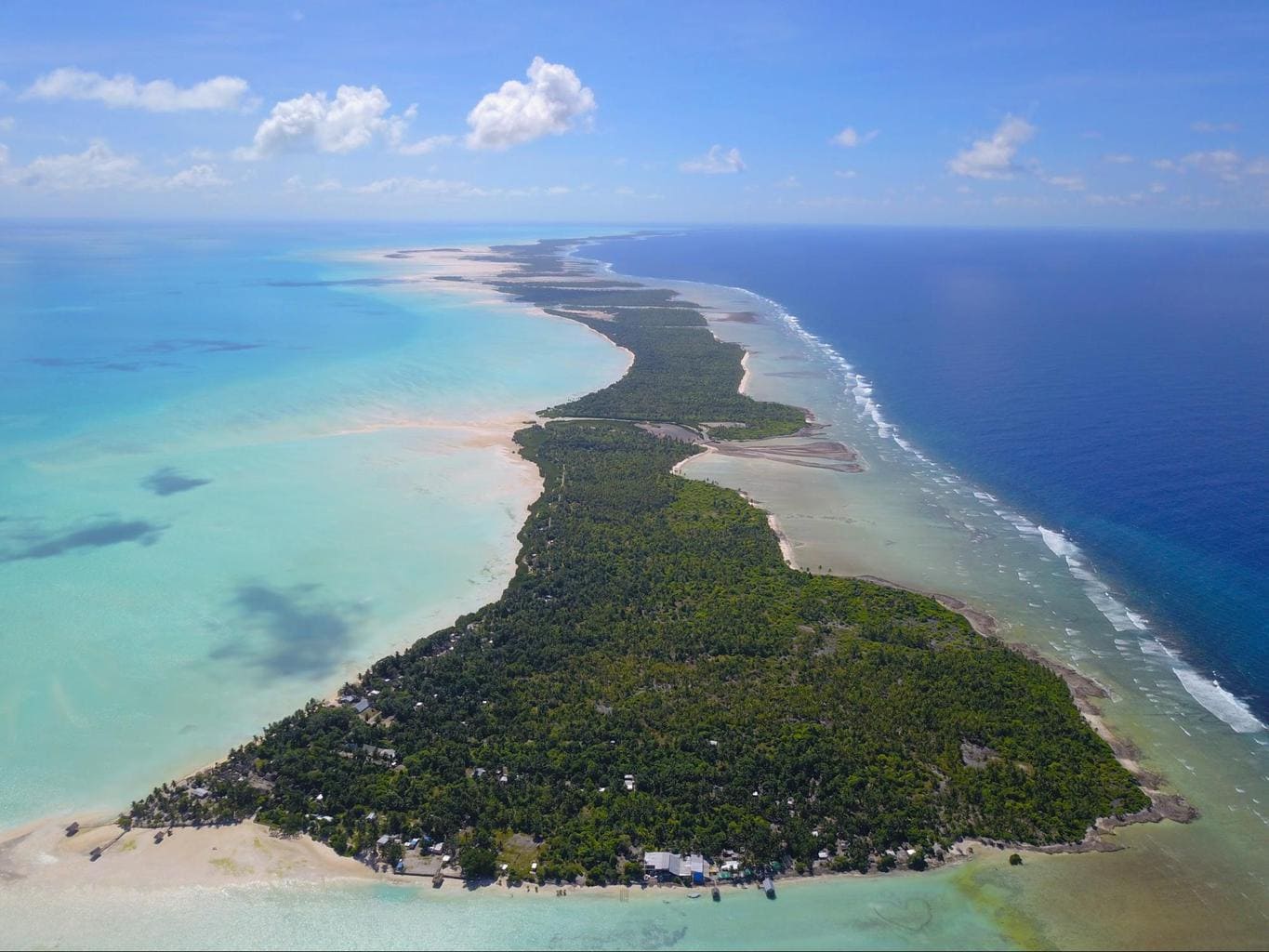
North Tarawa is the set of islets separated by narrow canals and interconnected by some bridges or canoes to South Tarawa. For the most part, the only way to cross the canals is by walking at low tide.
One of the nicest things to do on Tarawa is to walk from the last point on South Tarawa (cars can also drive there), and all the way to Tabuki Retreat. You could walk further but bear in mind that the only way to get back is to retrace your steps.
The walk along island paths takes about 1.5h each way and is mostly shaded by pandan and coconut trees. At times, the path is as narrow as a person, other times it can accommodate a small car (although they can only come when the tide is low and the canals are dried out).
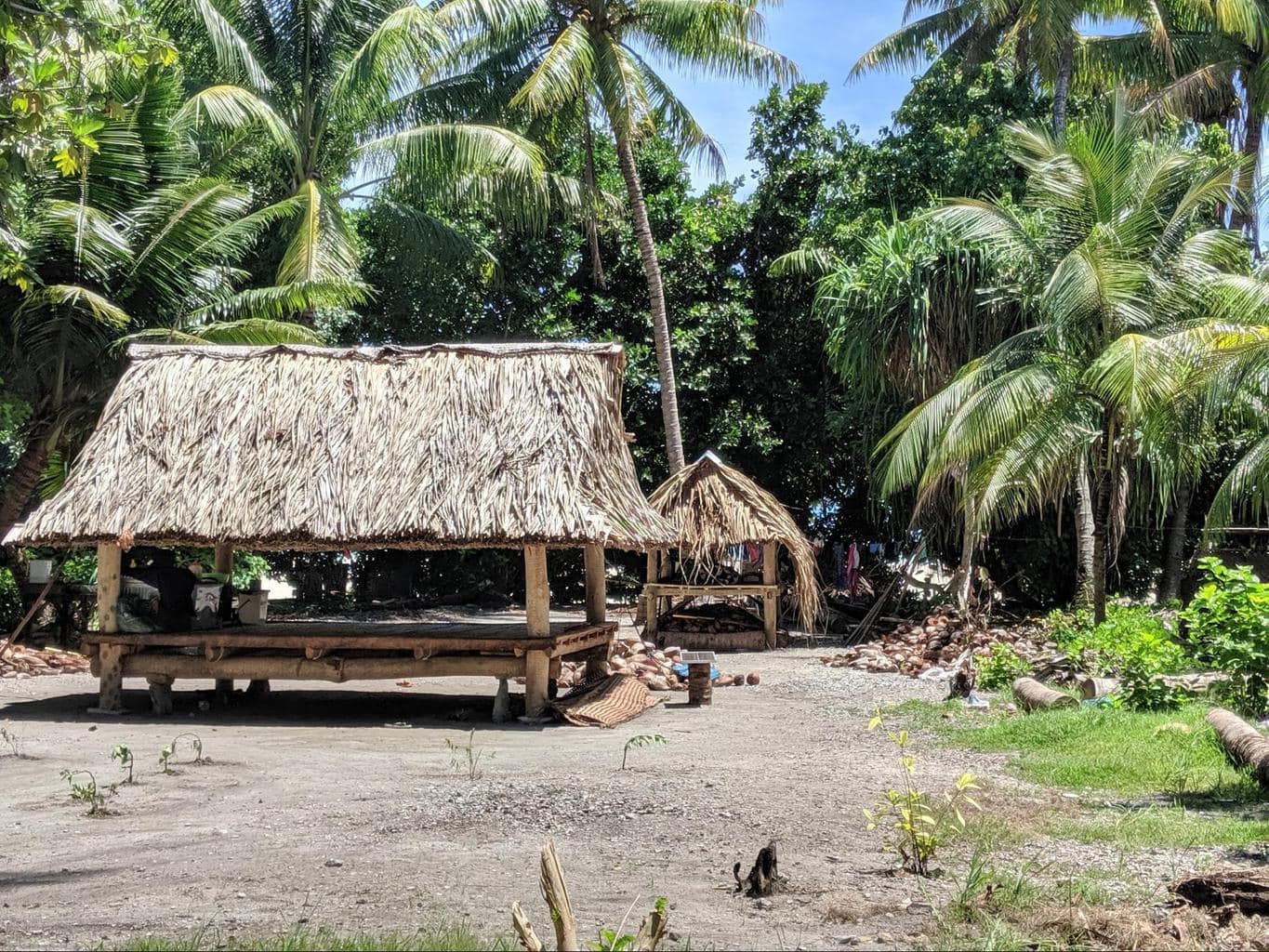
What you see on the way are the various small communities with a community hut, cooking huts, a well, and the locals living there who are extremely friendly and happy to chat, Mauri is Hello in the I-Kiribati language which everyone will say as they walk past you.
There are also lots of dogs, pigs and chickens. You can also walk along the shore, where the beaches are fluffy white, albeit suffering from a trash issue, and take pictures of the palm trees.
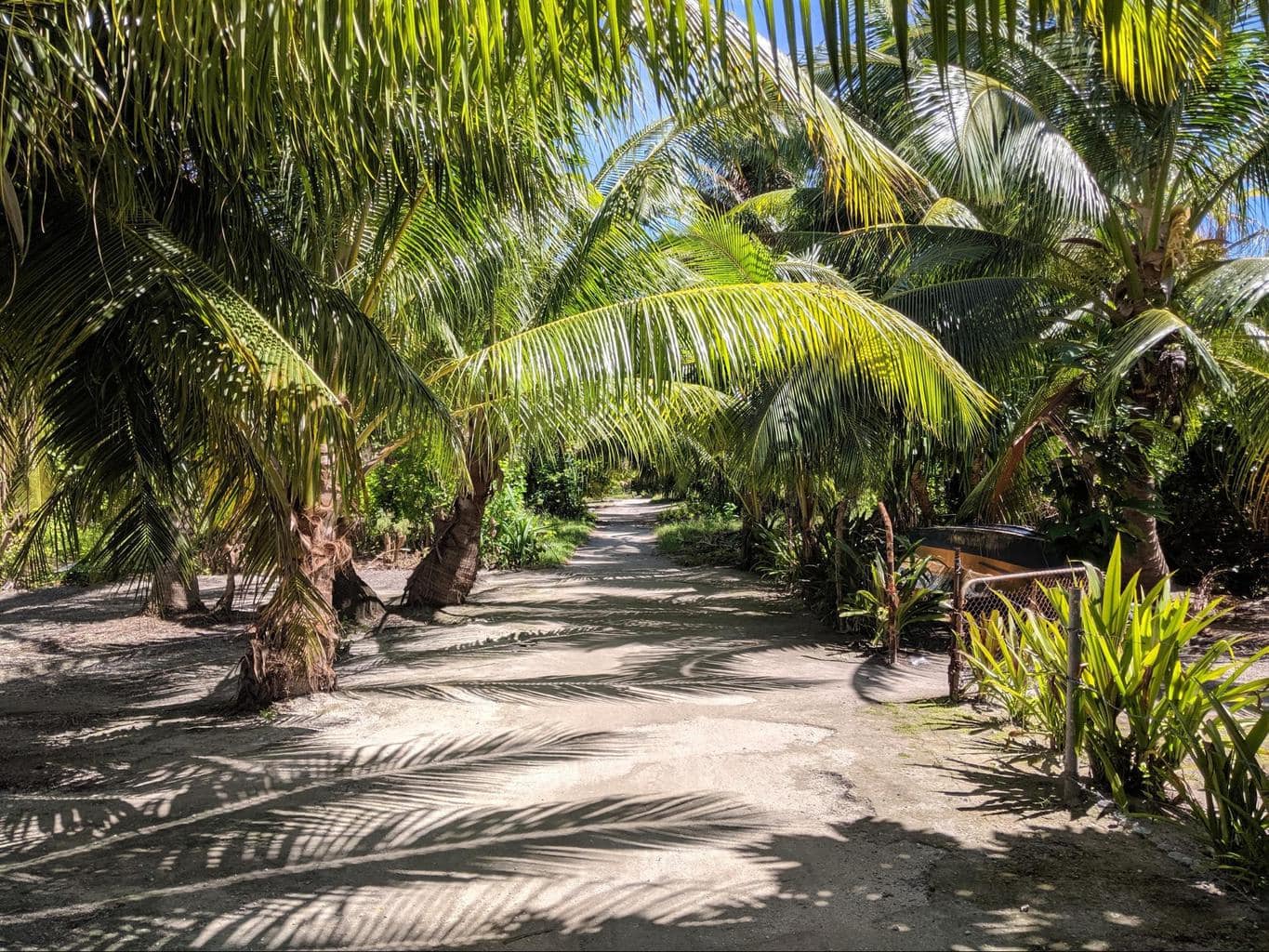
The entire atmosphere of North Tarawa is incredibly peaceful, quiet, almost silent , except for the screams of children when they see a foreign visitor and will come to shake your hand. Locals use bicycles to get around, sometimes you hear a scooter, but you are more likely to hear a rooster or a piglet.
Sleep in the open
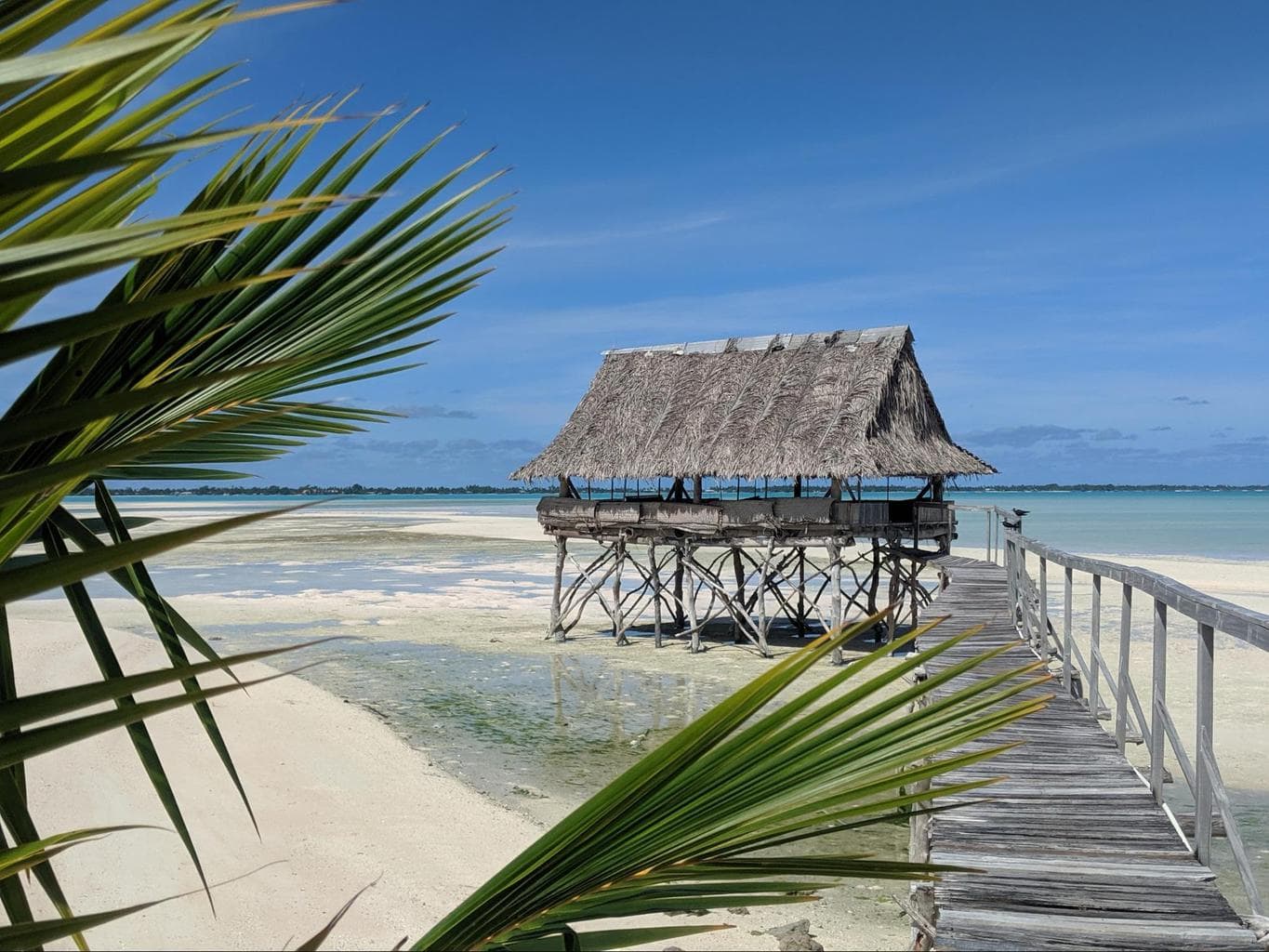
Like in Samoa, traditional I-Kiribati homes are wooden huts with open walls and there are a couple of lodges in North Tarawa and Abaiang where you can sleep in this simple accommodation and be lulled to sleep by the sound of the waves.
Two of the most recommended options are Tabon Te Keekee , right across the canal from Buota Island, and Tabuki Retreat which has a few concrete huts too but is only accessible by boat or by a 1.5h walk through the various island paths.
Both hotels offer all-inclusive rates (there is nowhere else to eat around) and you can also stop there for lunch if you are walking along North Tarawa.
Visit the Parliament House
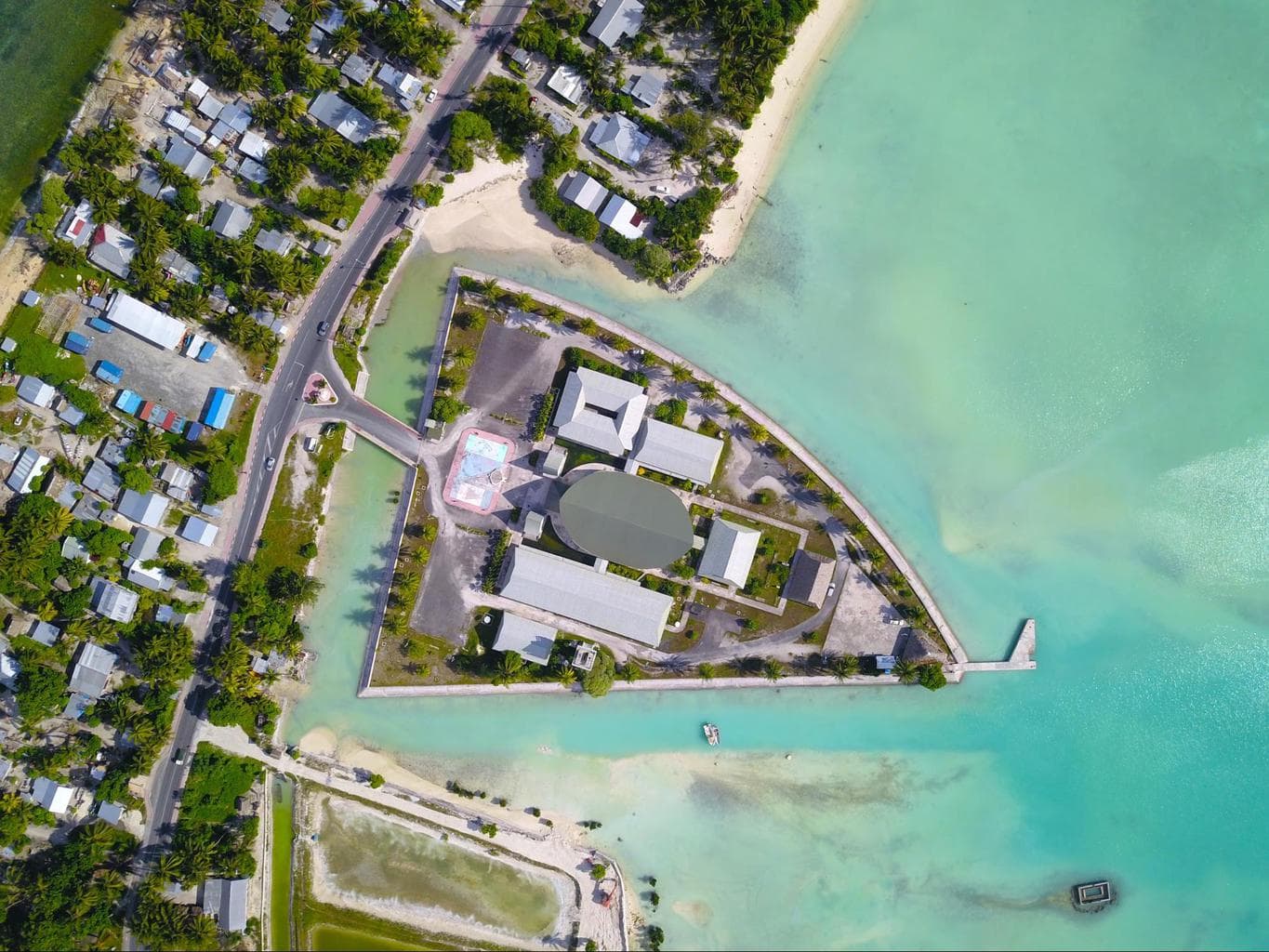
Kiribati’s Parliament House is a pretty building with as sailing theme that is well worth a stop. The entire building as well as the island it is located on, are designed in the shape of a sail and surrounded by a mote. In front of the main building is a colored yet slightly faded, map of Kiribati.
As the Parliament building is not used a lot, there are only three meetings a year, the guard will let you walk in if you make it there, so you can explore the area at your own will. Make sure to go there when the tide is high and the mote filled.
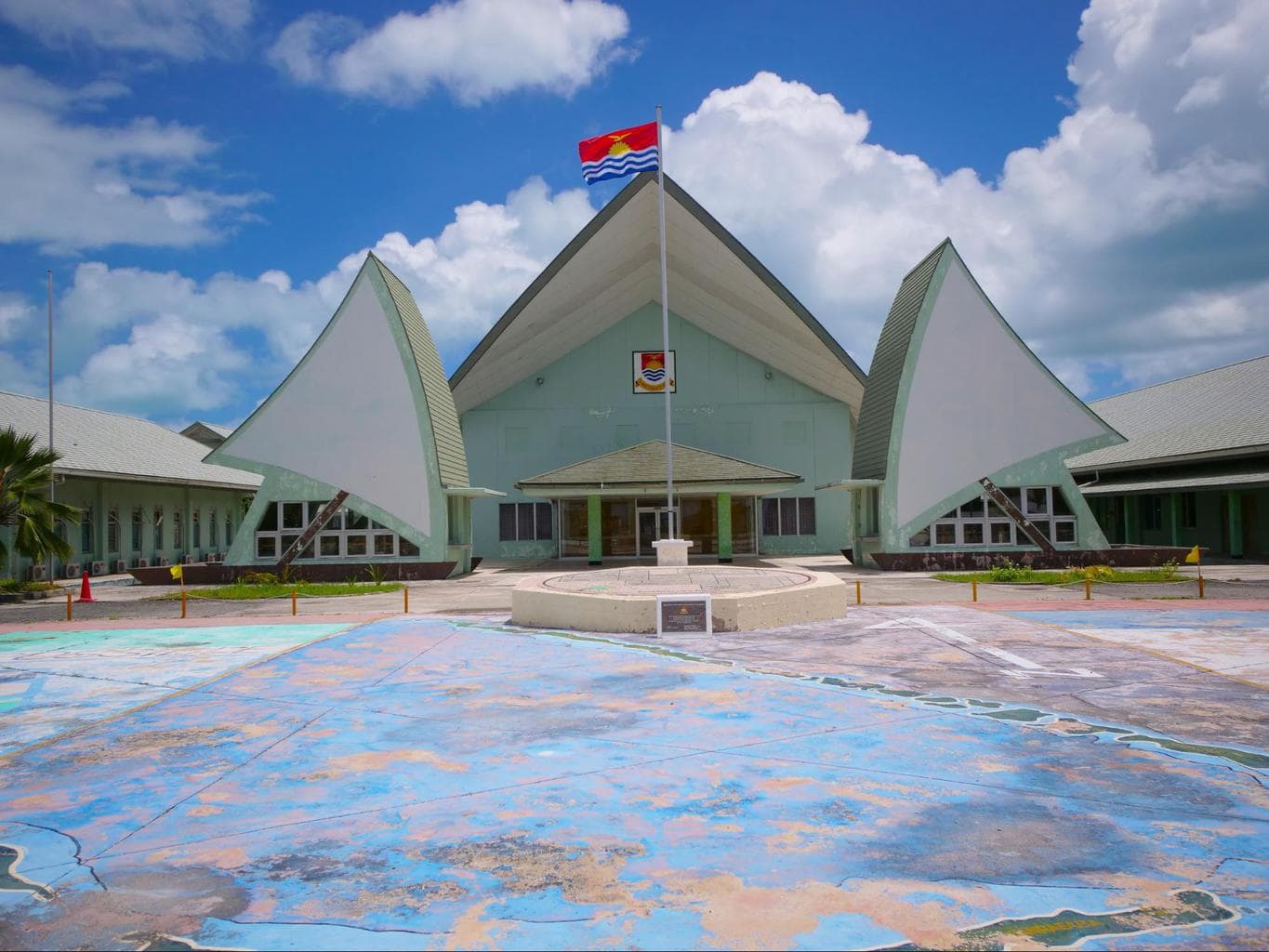
At the back of the Parliament House there is a bar that has great views of the sunset and is occasionally, but unpredictably, open. It only sells beer and a couple of fizzy drinks from a fridge but you can also bring your own and go sit at the back dock, which is the tip of the sail, from where you have great views of the horizon and the sun coming down.
It is possible to dive in Tarawa, although the infrastructure is not as readily available as it is in other Pacific destinations like Chuuk , Yap or the Solomon Islands.
You should contact Tobaroi Travel or the accommodation you are staying at so they can point you in the right direction. You can also visit Tobaroi in person if you have a bit more time in Tarawa, they are at the Chatterbox Cafe.
Try kava at a kava bar
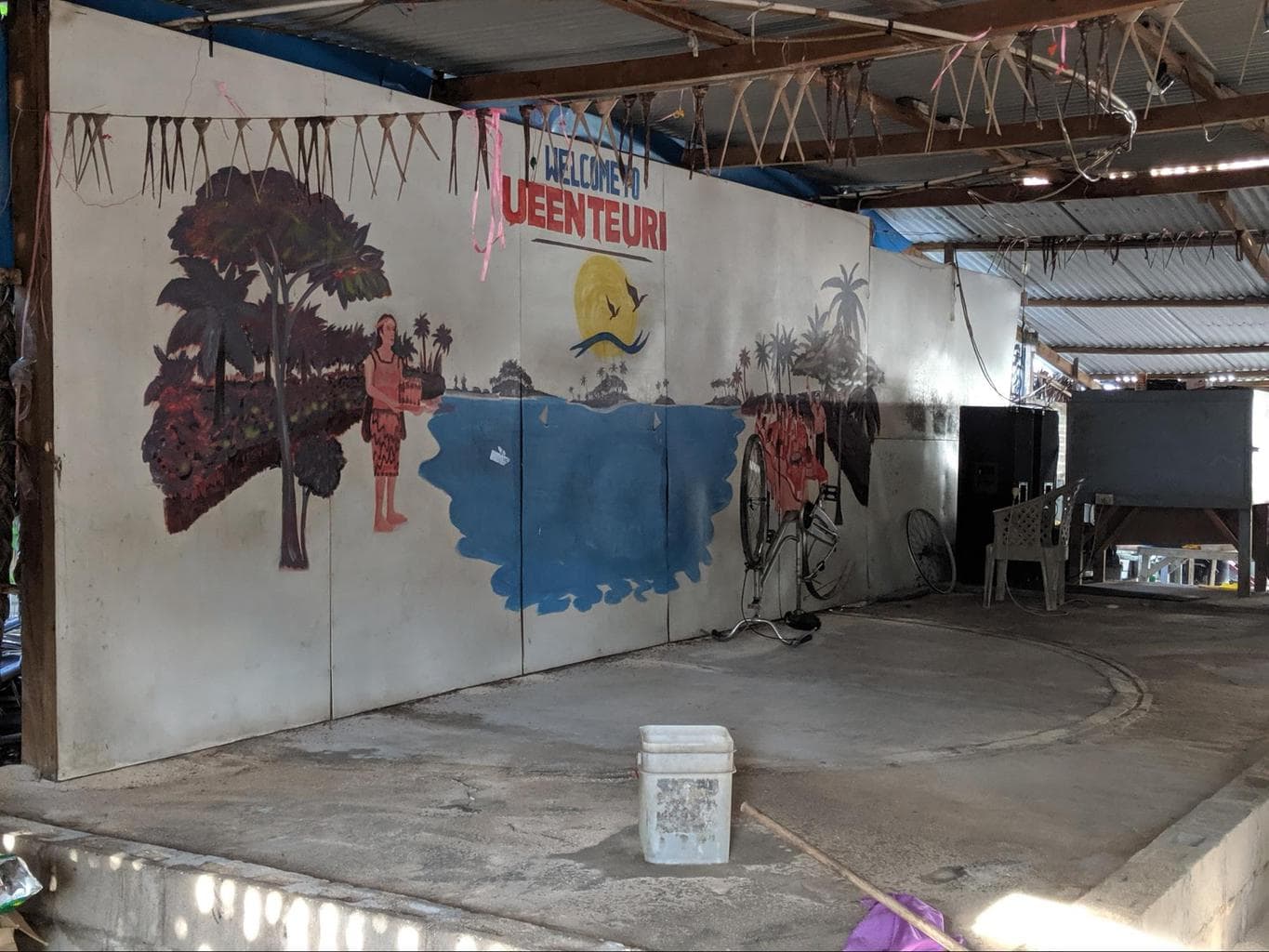
Kava is a traditionally a root and crop of the South Pacific grown across many countries and consumed in many more, most commonly in Vanuatu and Fiji , and it has recently made its way to Tuvalu where you can drink it at kava bars.
Kava is considered a drug in many countries and a prohibited substance, although you can import it into Australia since 2019. Locals drink the broth that is created from soaking the root and use it to relax. The word comes from the Tongan and it means bitter, which tells you something about its taste.
Kava was originally drunk at traditional religious and spiritual ceremonies but is today widely available to tourists in tourism complexes, cultural villages or even at hotels. Most of the places offering it to tourists try to replicate the ancient tradition, with large shared bowls and coconut husks used as glasses.
I first tried it in Vanuatu where it is usually stronger than in Fiji, at my hotel’s evening kava ceremony, and passed out completely for about half an hour.
The plant is a depressant and, as such, relaxes you, so it is common to have it in the evening. In Kiribati, the crop does not grow so in recent years, the powder form has been making its way here from Fiji where a lot of I-Kiribati live.
Kava bars are not bars per se, they don’t sell anything other than kava, and are rather bare affairs with plastic chairs and tables, but more of a unique experience in Tarawa.
Buy postcards
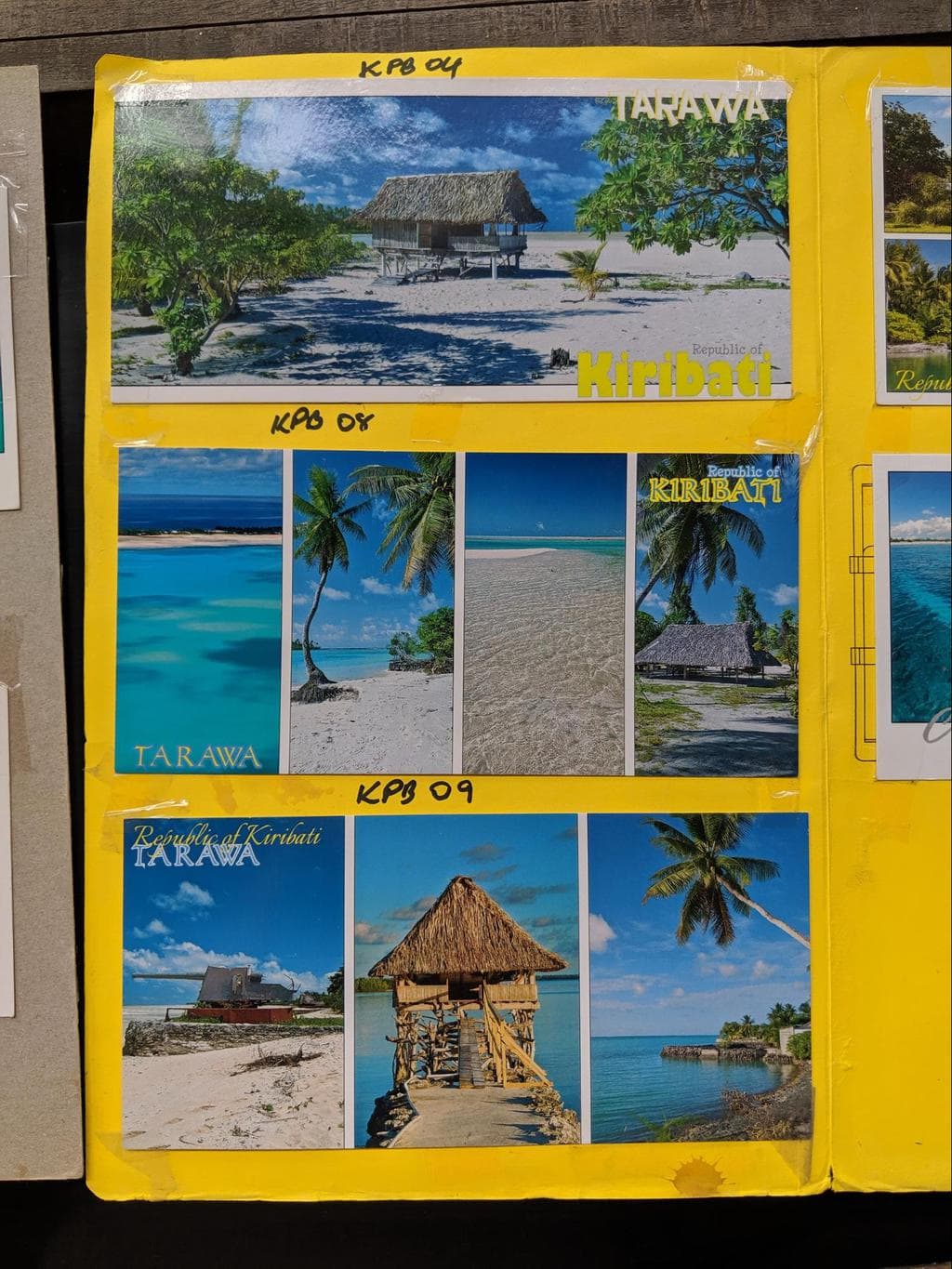
I collect postcards from remote places and even mail them and Kiribati is not an exception. Visit the Post Office and you will be able to get your hands on idyllic South Pacific postcards and stamps.
Walk over to a heart-shaped island
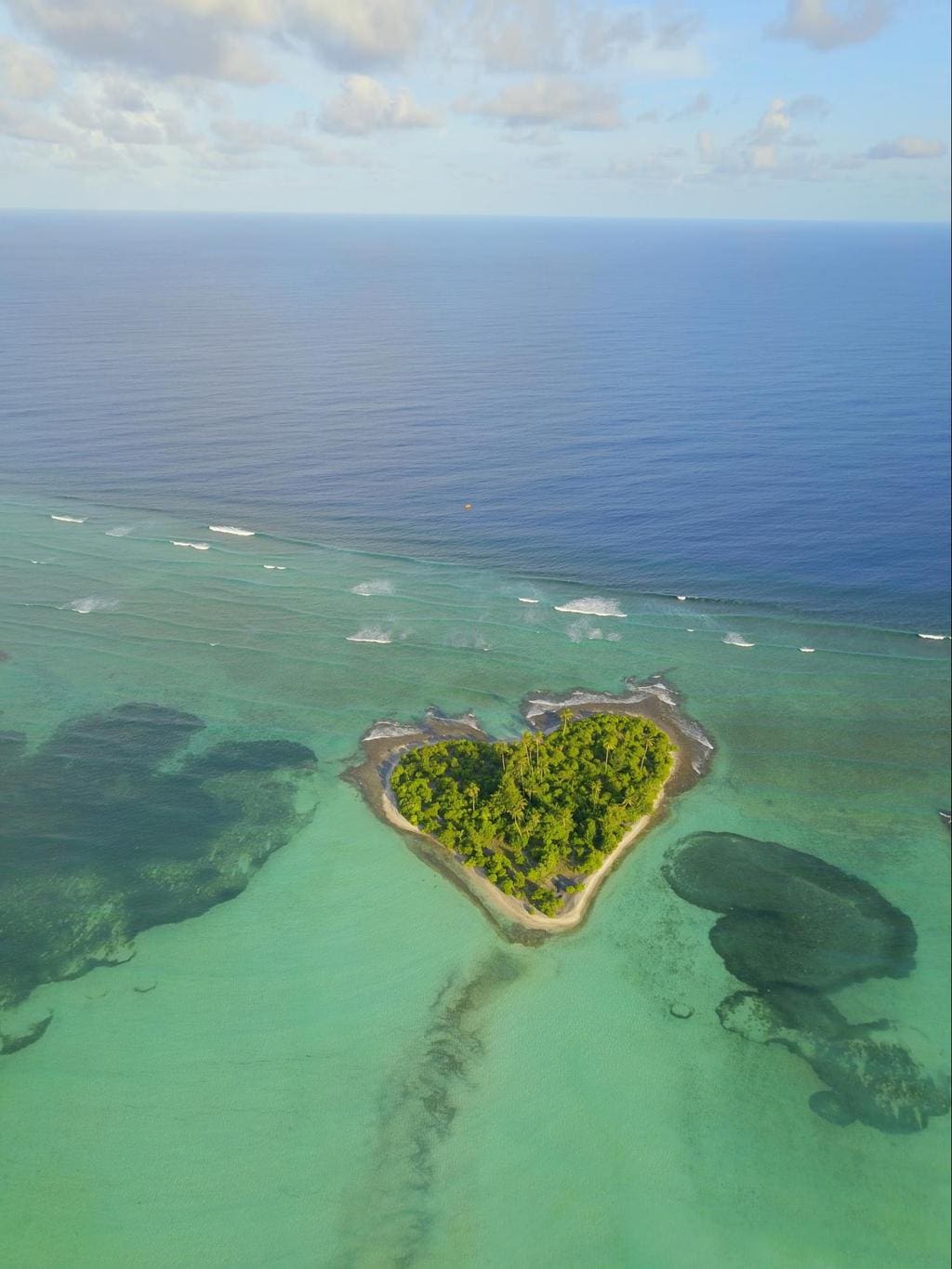
When I first moved out and started living on my own I bought a stunning coffee table book by Yann Arthus-Bertrand that had a heart-shaped vegetation patch in the Amazon.
Little did I know that there is a heart-shaped island in Kiribati located by Dreamers Guest House, which I discovered when flying my drone from the guest house garden.
The island is located in the shallow lagoon and, at low tide, you can walk to it. It is lush and green with lots of palm trees, and a sandy shore. Just be sure to walk back before the high tide.
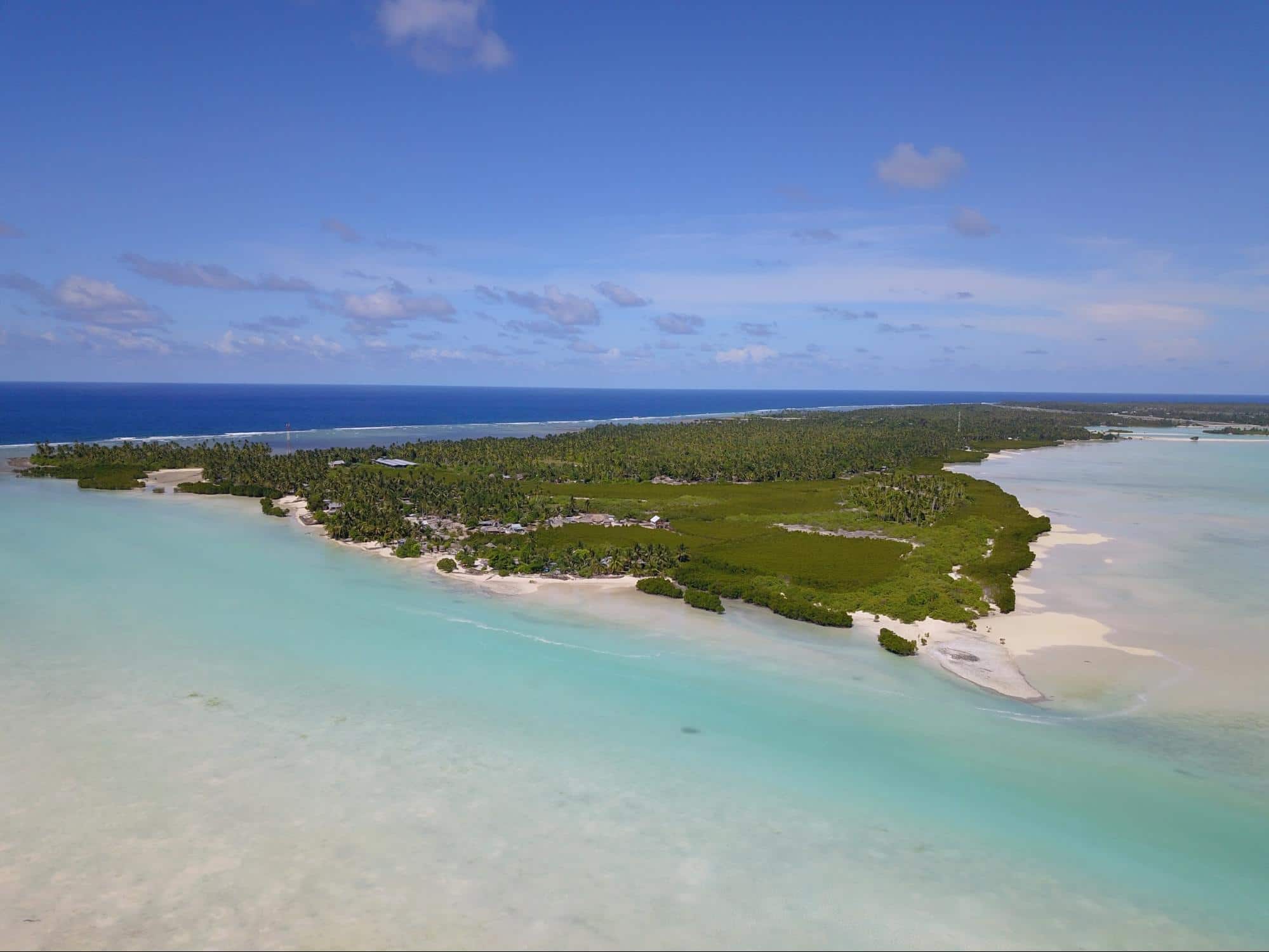
So you are on an island, and an atoll island at that, so it would make sense that swimming is one of the best things to do in Tarawa and you are not wrong.
However, because of pollution, I recommend you swim either in the shores of North Tarawa, in the area near Dreamers Guest House or in the canal around the bridge that connects South Tarawa with North Tarawa.
Try to avoid swimming too close to the main urban centers which are more prone to plastic rubbish.
Tarawa is a great fishing destination and Betio Lodge , one of the most popular places to stay on the island, also operates a charter fishing company which can organise fishing trips in the lagoon and beyond.
However, the best fishing in Kiribati is in Kiritimati Island , which is known worldwide as a great fishing destination yet to be discovered.
Things to do in Kiritimati Island
Kiritimati is the world’s largest atoll and unlike other islands in the Pacific and Tarawa itself, it is a pretty large island measuring over 600 square kilometers.
That means you can rent a car and go explore London, Paris and Poland, all names of villages on the island, without driving around the country 20 times in half a day like it happened to me in Nauru.
Because of its geographical location and the fact that the country chose to be on the same time zone as Tarawa, Kiritimati is the first place to see the New Year together with Samoa .
If you thought that few people make it to Tarawa imagine how few make it to Kiritimati. There are roughly 1,000 to 1,500 people visiting the island every year and only a fraction are tourists, the majority are officials and others working for international agencies.
Kiritimati island is best known as a world class fishing destination . Since the island and atoll have been a protected marine area for years, marine wildlife thrives and attracts eager fishing fanatics all year round, especially because it is one of the best fly fishing destinations in the world.
Kiritimati is the mecca for bone fishing and accessible for giant trevally. There are several fishing lodges and charter companies, the most popular are Ikari House and Christmas Islands Outfitters.
Kiritimati is also well known as a surfing destination to the pros with a couple dozen surfable breaks with consistent waves. They are ready to please any surfer from June to April with both Southeast and Southwest as well as Northwest swells.
Best of all, you are most likely going to be on your own and very few people make it to the islands and those who do, are here for fishing. Bring all your equipment and get in touch with Christmas Island Surf .
Diving is also possible on Kiritimati and the same lodges who provide fishing support can help you organise a diving trip. Make sure you plan ahead and check what will and will not be provided, it’s not like the diving tourism is very developed.
Bird watching
Kiritimati is a nesting place for many birds and a great place to see them all year round. The island has a lot of potential to develop as a tourism destination for bird lovers.
Other islands to visit in Kiribati
There are several other islands that are well worth a visit in Kiribati but beware, they are really remote places so you should plan enough time (there may only be a couple of flights a week there and weather can cancel them) and the expectation of simple living.
Located at a 2h ferry ride away from Tarawa or a mere 20min flight with Air Kiribati, Abaiang is a step beyond North Tarawa in seclusion, remoteness and peace.
This small atoll island north of Tarawa has all the makings of a Pacific island with fluffy white sand beaches, minimal pollution, swaying palm trees and clear waters. Accommodation is modest, in the open air hut format, and affordable.
Also known as Fanning Island , Tabuaeran is hardly visited island most known to foreigners for its surfing possibilities. It is part of the Line Islands of Kiribati and only connected to Tarawa via ferry services.
There are also some cruise ships that make stops on the island, most popular Holland America’s 51-day Pacific cruise or shorter ones which include only Hawaii and Marquesa Islands. The same cruise ships also stop on Kiritimati.
Restaurants in Kiribati
On the main island of Tarawa there are a handful of places to eat and that is even more limited on Kiritimati. Here are a few of the Fanning Island .
Koakoa Corner
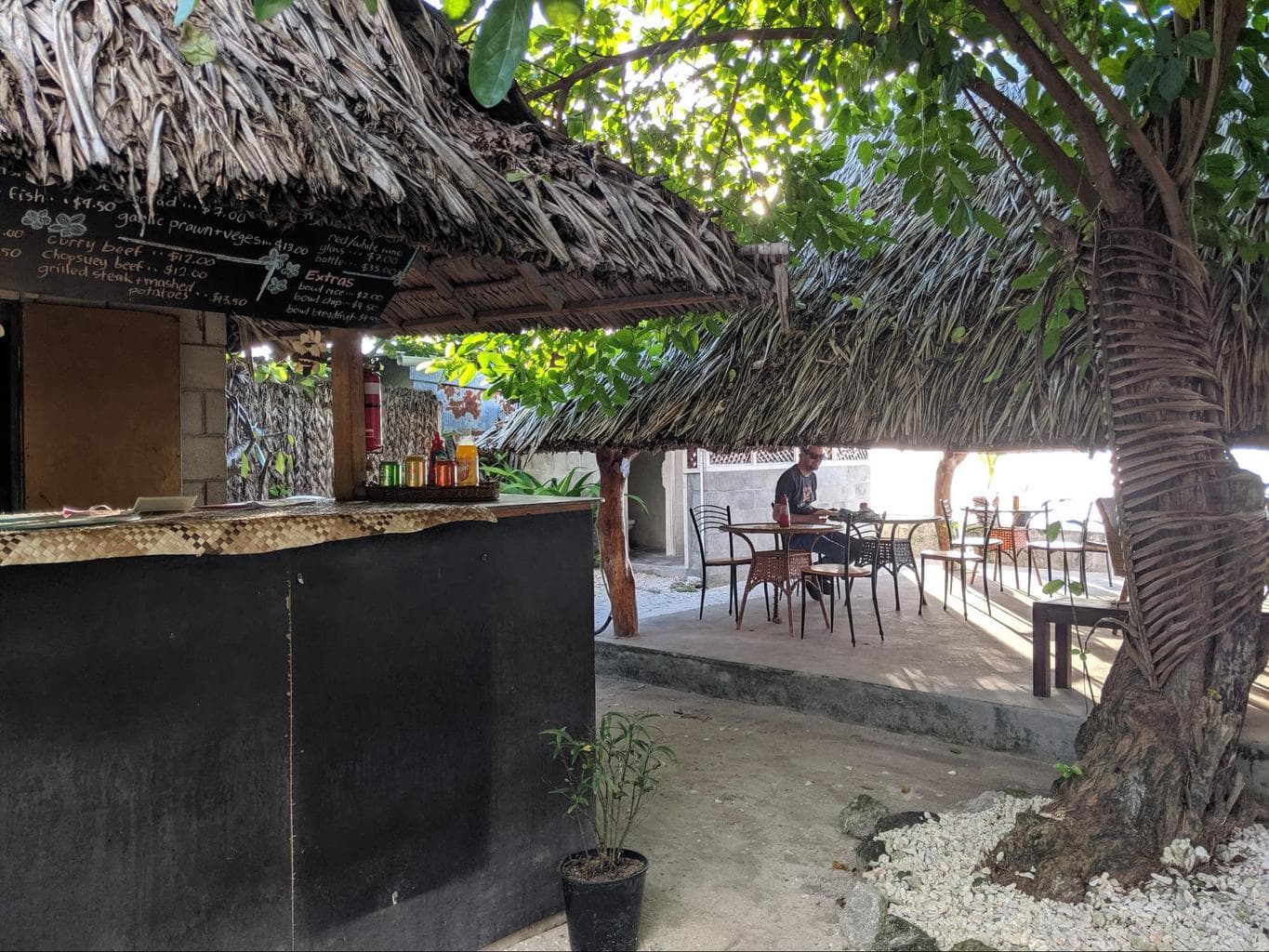
I wish we had discovered this casual hut earlier because the menu looked promising. Simple set up serving from breakfast to dinner (not easy to find a breakfast place in Tarawa) and a few local dishes (beyond the typical Chinese fare).
Betio lodge
Highly recommended by many, this simple lodge has a fun bar called Beer & Bullshit and a decent restaurant to have simple Chinese dishes and fish . It is popular with travelers and a fun place for a drink.
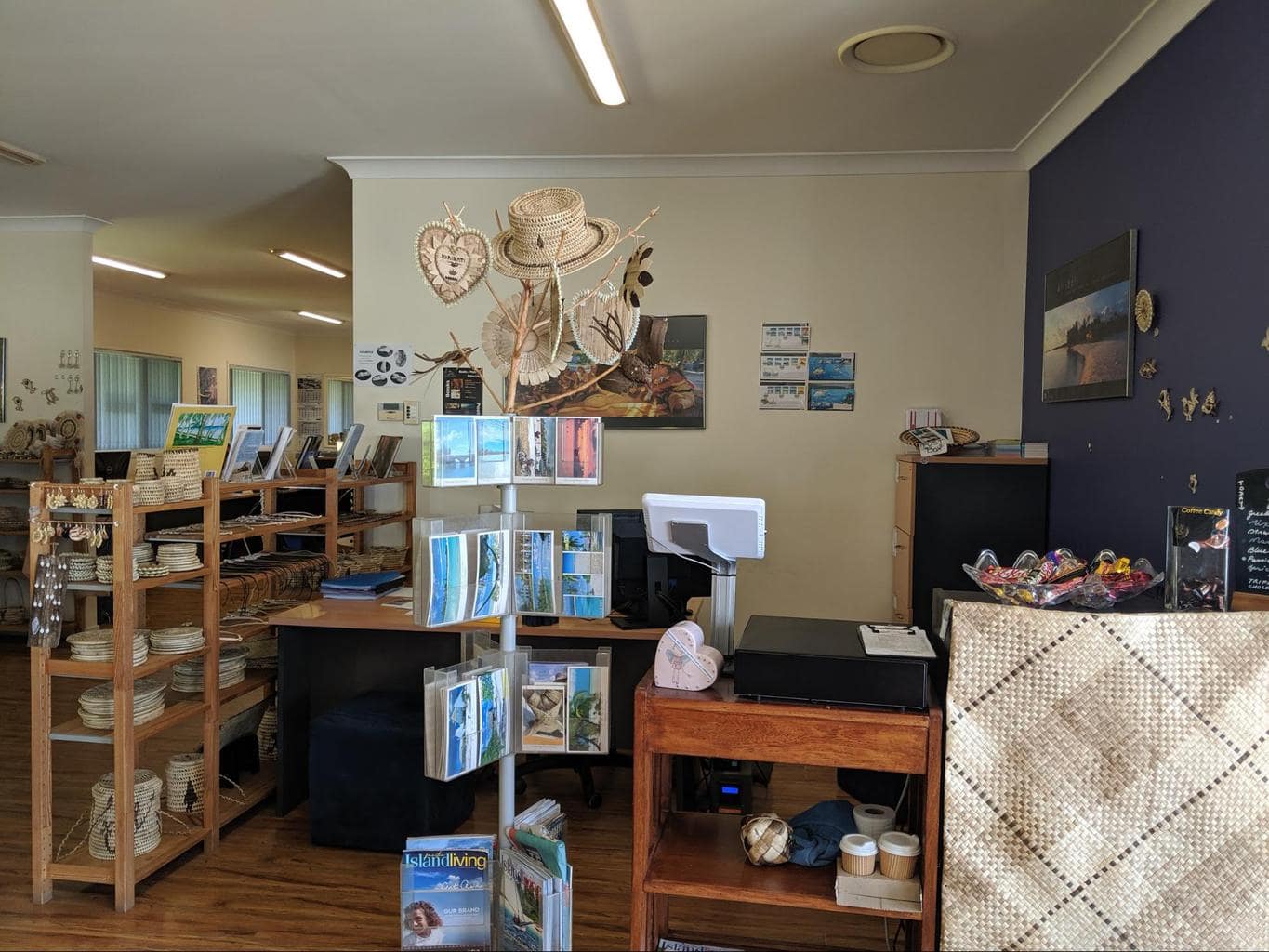
A unique combination of menu items including toasted sandwiches, fantastic iced coffee and milkshakes, and instant ramen noodles, plus, if you don’t have a local SIM you can buy time-based internet access here. This is also the place to come get souvenirs , books and any travel arrangements through the in-house travel agency.
iMART
This supermarket has an attached bakery with some outdoor tables and serves a different dish at lunch time everyday. It also has lots of pastries and even ice cream for sale.
Capitol Grille
Popular Chinese restaurant in Betio serving all the typical Paciifc Chinese dishes like fried rice, chopsuey, grilled meats, etc. Located by the side of the road and with simple plastic chairs.
Public market on Bairiki
If you are looking for a really simple meal or for some snacks, there is a laid-back market in Bairiki along the main road where locals sell a meal in a plastic bag including tide, causes and fried/grilled chicken.
Hotels in Kiribati
There are not a lot of places to stay in Kiribati but here are the best choices from my experience and recommendations from others who have been.
Dreamers Guesthouse
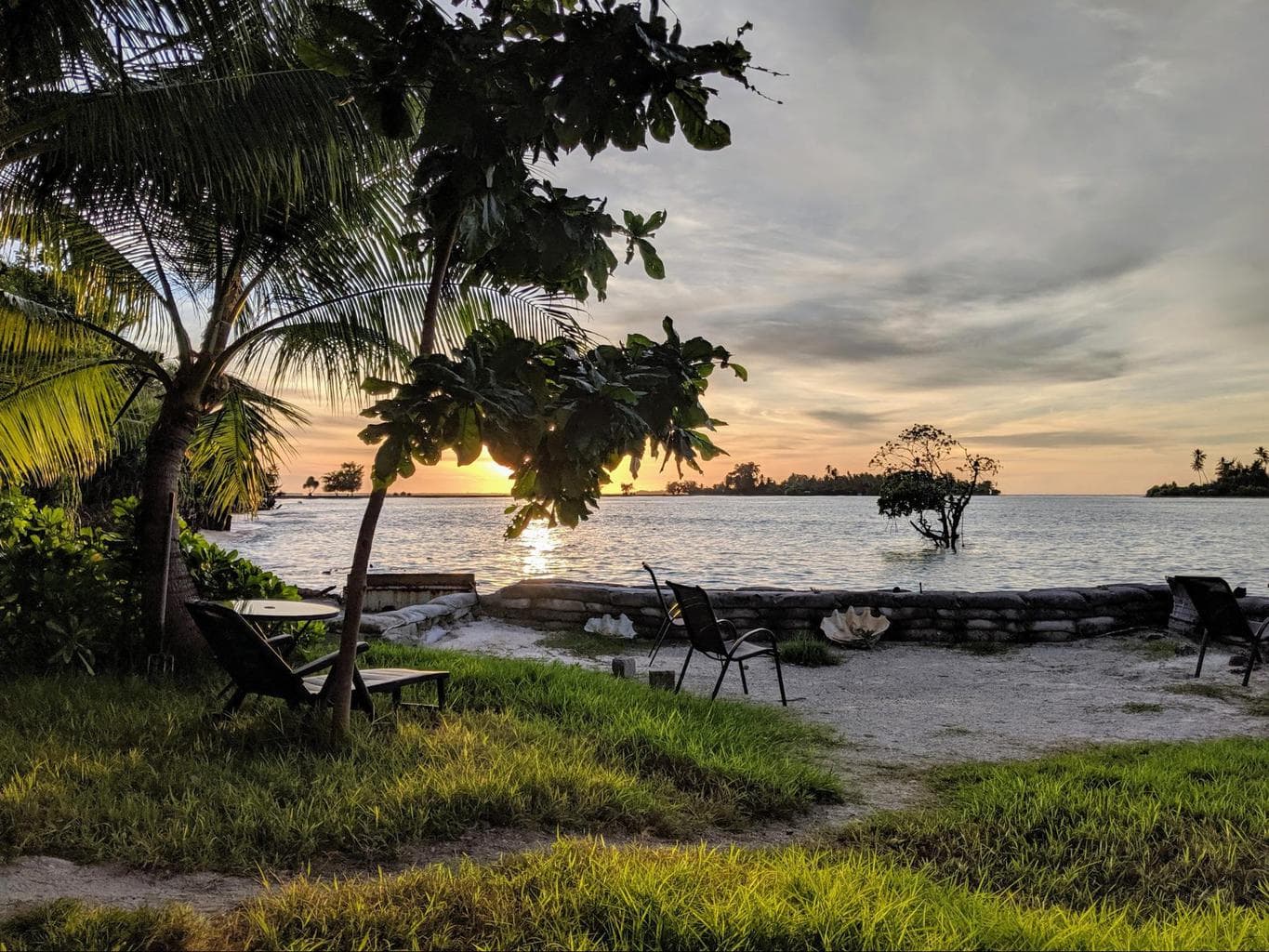
I stayed here . This family-run guesthouse right on the lagoon offers three very large apartment-rooms with two beds that can easily accommodate three people. There are small kitchens in the room and fans (no AC), but the sea breeze was enough to sleep. No hot water in the shower.
The rooms are a bit dated and could do with a layer of paint but the set-up is pleasant and the sunrise views from the small garden are great. The I-Kiribati and English owners will gladly share anecdotes and stories and rent you one of their cars. They can also organise whatever ferry or plane tickets you need ahead of time and are quick to respond via email.
Breakfast is served continental style, with toast, fresh fruits from their garden and French press coffee. WiFi is included via a mobile dongle connection. The owner will pick you up from the airport.
Pro tip : Dreamers can prepare dinner if you ask in advance and accommodate vegetarian options and it is the only “local” food I had in Kiribati .
Simple lodge in Betio popular with single travelers because of the fun bar which is popular with the (very small) expat crowd. Rooms are sparse but come with small fridges and AC. There is free WiFi in the common areas and they will pick you up from the airport.
The lodge is the base for the Game Fishing Club so they can help you organise diving and fishing trips as well as any other tours or car rentals. If you don’t plan to rent a car, this lodge is a good place to stay because you are in a village and walking distance from the WWII relics.
Pro tip : There is a set of new rooms, ask for one of those instead of the older ones.
Fema Lodge
This is the only accommodation on Kiribati that is bookable via a hotel booking site, Booking.com in this case.
Rooms are simple but better than at Betio, and newer, and they come with AC and hot water . Some of them are spacious and have fully equipped kitchenettes. Wifi is not free and can be expensive (AUD4 for 1h) so consider buying a SIM card.
This is the preferred hotel for business travelers like those from the World Bank. Location right across from Kaokao restaurant is a plus.
Pro tip : Ask for a room in the new wing.
Practicalities and other information for visitors
Because Kiribati is such a remote and unique place, there are a lot of things that need to be well thought-out before your trip.
How to get to Kiribati and around
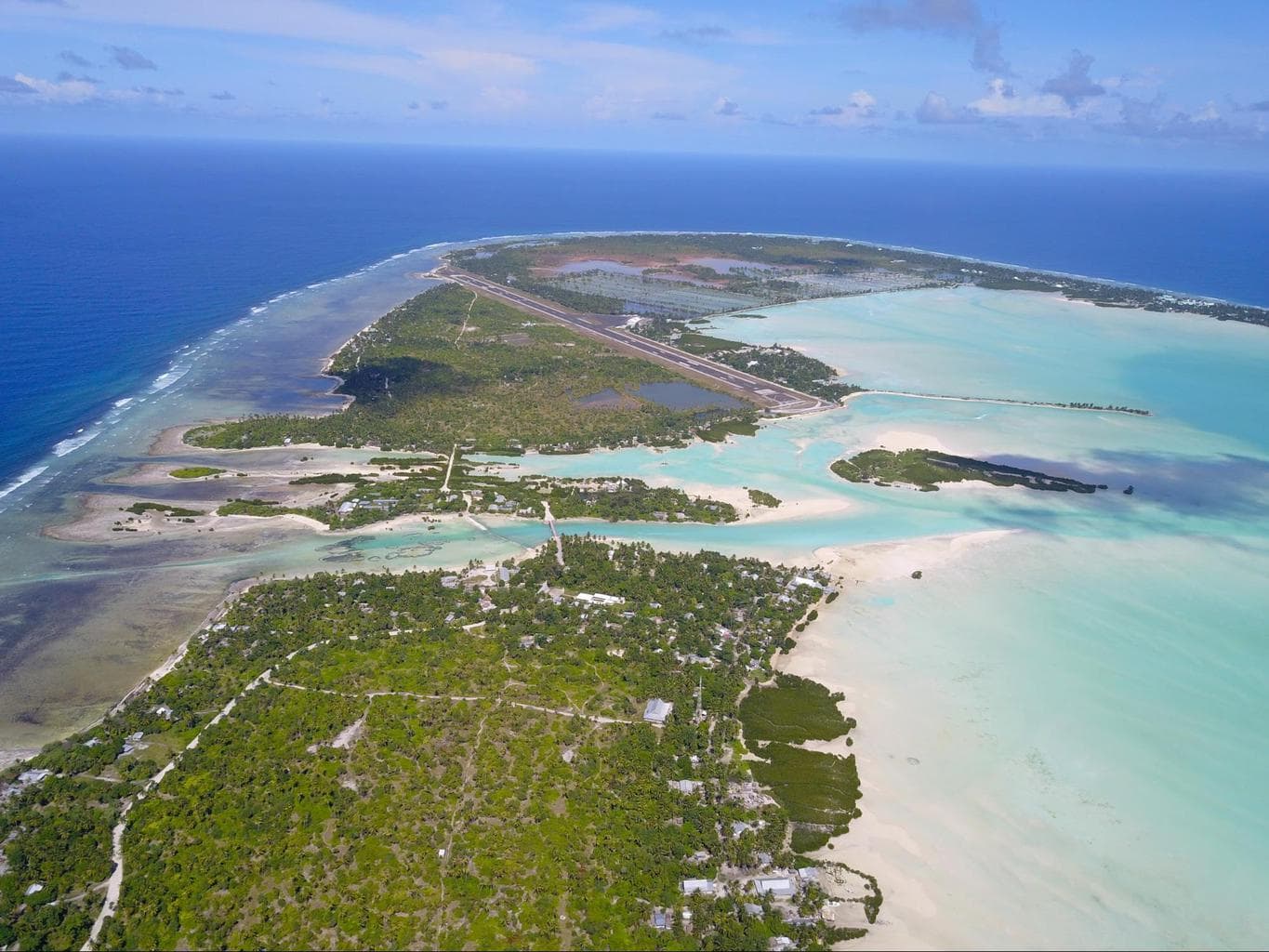
Getting to Kiribati is not easy as there are not that many flights , but it is easier than getting to Nauru or Tuvalu.
There are flights to Tarawa via Nauru on Nauru Airlines once a week as well as Nadi with Fiji Airways , twice a week. Kiritimati is also connected to Fiji on a weekly service (reinstated in 2011) that continues onwards to Honolulu with Fiji Airways. There are no other international flights with any other airline.
Air Kiribati operates small propeller planes that connect the various islands. Some flights are as short as 20min others a few hours. There is no flight from Tarawa to Kiritimati so you would have to go via Nadi in Fiji or Tabiteuea Island with Air Kiribati.
You can book flights online with Fiji Airways, but Air Kiribati is not online so flights can only be booked in person at the ticketing offices in Kiribati. Your hotel or guest house can help buy them for you in advance or you can go to Chatterbox Cafe where there is a travel agency desk, Tobaraoi Travel .
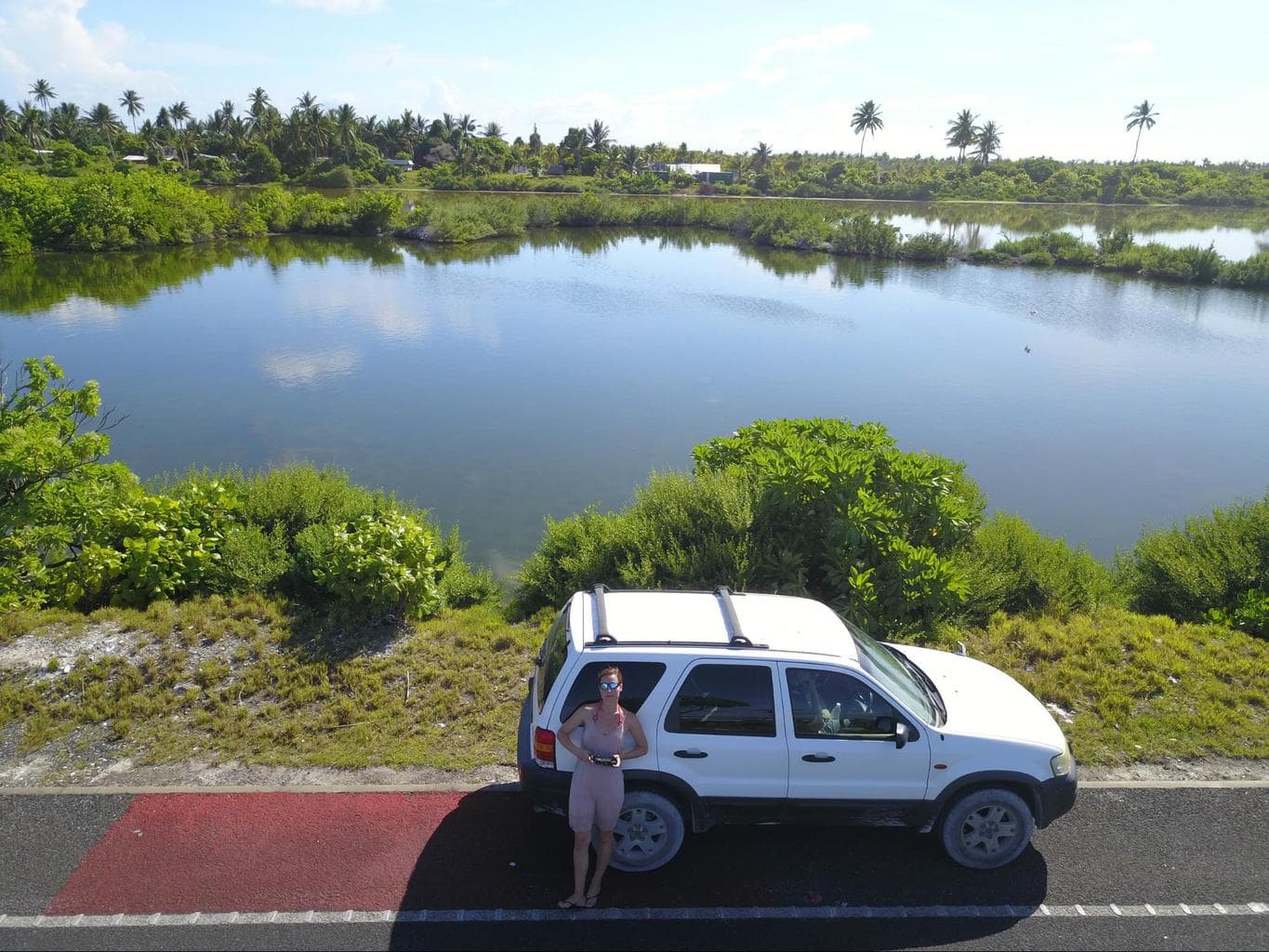
When you book your accommodation, make sure to confirm the airport pick up , they all offer it in the price of the room. You won’t be able to get a taxi when you land as there are none so you need to be picked up.
The best way to get around in Kiribati is by renting a car or scooter. There is limited public transportation available and if there is at least two of you, a car makes more sense than a scooter. It is also more practical because of how hot it is and the 80+ speed bumps on Tarawa (I counted them!).
If you want to rent a car it is best to ask the place you are staying at. Chances are they have cars you can rent. No need to sign contracts or show driving licenses, you are basically borrowing someone’s car and it is all pretty casual. It takes about an hour to drive Tarawa end to end because the speed limit ifs only 40km/h.
Best time to visit Kiribati
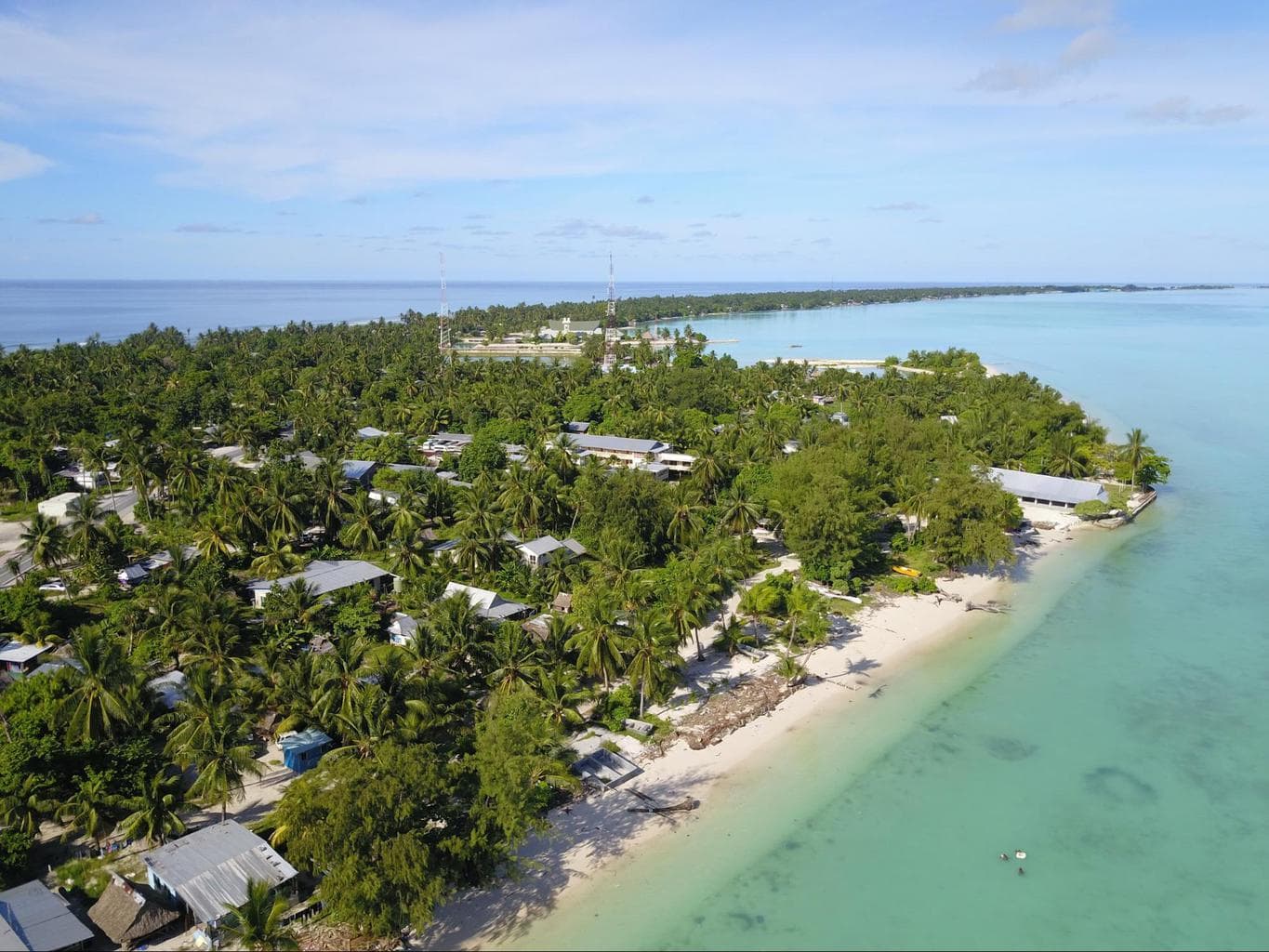
The best time to visit Kiribati is in the dry season, which runs from July to October. When it rains, because of rising sea levels, flooding and bad weather make a visit difficult as most of the activities are outdoors and rely on good weather .
Temperatures in Kiribati are practically the same all year round with temperatures between 24 and 31 degrees, but high humidity makes the sensation of heat much higher during the stay, especially if the sun is shining.
Money matters
Unlike other countries in the Pacific, it is relatively easy to get cash in Kiribati. Credit cards are practically useless and not accepted anywhere, but there are several ATMs from ANZ Bank that accept international cards and are usually stocked.
Visa for Kiribati
The majority of the passports do not require a visa for Kiribati making it a relatively easy country to visit. You will have to fill in a landing card when you arrive, and complete customs and agricultural quarantine questionnaires. You can find the visa requirements via the Emirates website which uses IATA information.
What to pack and bring to Kiribati
The country’s remoteness means that a lot of the things that you would regularly and easily find in most places may just not be available in Kiribati so you should bring everything you need with yourself.Because this is a tropical holiday with a chance for swimming, diving or lazing by the beach, I would suggest to pack the usual suspects. Plus, not to exacerbate the country’s garbage management efforts, I highly recommend taking your trash with you when you leave.
Here is a list of the things you should take with you to Kiribati.
This is a must, the sun is hyper strong in the Pacific and you are right by the Equator so bringing high SPF sunblock and applying it regularly and continuously is a necessity. I always love and use Biore which is non stick
A hat or cap

You really need to protect yourself from the sun, especially at the conservation area, on the boat ride, and while walking around. This is not a place for a pretty Instagram hat but for a practical one with lanyard so it does not fly away on the boat.
This one for women is good, and this one for men. I would usually think that a cap is enough but after severely burning my neck I know that you need to make sure to cover that part too so a wide brim option is best.
Mosquito repellent
Mosquitoes in the Pacific are vicious and ever present . I used three pots of repellent in my ten days and just moderate spraying did not protect me, I had to literally douse myself in repellent, also when I went to sleep.
You really need a repellent that has DEET in Kiribati, eco-friendly options with ingredients like citronella will not work.
OFF is a reliable brand and this one has 25% DEET (I brought it to Kiribati). Or if you are really prone to mosquito bites try Coleman which has 40% DEET. Make sure to thoroughly wash hands after applying it, DEET is really toxic and will upset your stomach.

I am practical in this department, just like with the mosquito repellent and hat. You can wear designer glasses to the luxury resort in Taormina , but you need to bring heavy duty sunglasses to Kiribati.
Because the sun rays are strong and you need to protect your eyesight from the sun and the wind. I am a big fan of Oakley, they are heavy duty, they last, they are polarised and not too expensive. I have been using them since I was a lifeguard at age 16 and spent 8 hours a day staring at the ocean, sand and sun.
These simple black ones are good for men, or in brown if you prefer. For women, Oakley has come a long way from the manly, heavy-duty models to cute cat eye versions in brown and in black .
Although I will admit I have bought the same black Oakley sports model for years and love it because it holds my hair when I place them on my head and doesn’t let any sun or sand get into my eyes because it covers them all the way.
Clothes and swimwear

In terms of clothes, I highly recommend shorts and t-shirts and long sleeve cotton or linen shirts which both protect you from the sun and the mosquitoes. A sarong or kaftan is useful for many things and helps you if you want to get in the water in the main island.
If you want to go swimming, consider wearing a rash vest, shorts or a sarong, or at least a full swimming costume rather than a bikini. Nobody will say anything if you just bathe in a bikini but you will blend in better the more you cover up.

Given how strong the sun is, I strongly suggest bringing a rash vest , I always wear them to protect from the sun when snorkeling so I don’t sunburn without realising it. Make sure it is long sleeved and has SPF protection.
For women, they make some really cute ones these days and I like the ones with a zipper which can be taken on and put back on easily. This flowery one is very cute and ticks all the boxes and this black one is more plain and goes with everything. Or get a super sexy onesie or Billabong’s silver shinny one (beware it does not cover your arms).
Other things to pack
You should bring any medical and personal hygiene products with you because the range of options available is very limited and regularly runs out. Any prescription medication should also be carried with you because it may not be available on the island.
Kiribati has limited medical facilities and only one anesthesiologist shared with Tuvalu. That is, the doctor spends six months in each country.
Travel insurance
You should never leave home without travel insurance and remember that this needs to be bought before your trip.
World Nomads is a very widely used insurance company with affordable prices. You can get a quotation and purchase insurance pretty quickly and easily with the box below.
- Check if you need a visa, get help processing it at iVisa .
- Never ever leave without travel insurance. Get affordable coverage from World Nomads or long term insurance from Safety Wing .
- I find all of my flights on KAYAK . Check their Deals section too.
- Search for all your transportation between destinations on the trusted travel booking platform Bookaway .
- I book all my day trips and tours via GetYourGuide , they are the best and their tours are refundable up to 24h in advance.
- Get USD35 off your first booking with Airbnb .
- Compare hotels EVERYWHERE at HotelsCombined and book with Booking.com .
- Compare car rental prices at Rentalcars.com
You may also like
Your ultimate guide to the best things to..., where to stay in barcelona – best areas..., where to stay in bali – the ultimate..., what to do in yap, the complete guide..., what to do in chuuk, the complete guide..., what to do if you only have 1..., tuvalu: all you need to know, travel to tibet – everything you need to..., travel to el salvador – things to do,..., travel in albania: best things to do &....
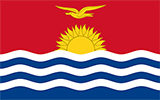
Last verified: Tuesday, 13. August 2024 at 08:21 AM
Kiribati Travel Advisory
- Kiribati Travel Advice
Travelling Kiribati is (relatively) safe
Local situation: 1.0 / 5.
Travelling Kiribati is (relatively) safe. We detected travel advisories from one source for this country.
Regional Situation: 1.0 / 5
This country shares no land border with any other country. Thus, the region score is identical to the country risk rating.
Current informationen on Covid-19 in Kiribati
There are currently no officially reported cases of infections with SARS-CoV-2 (or Coronavirus) in Kiribati. As reported by the European Centre for Disease Prevention and Control this morning (~8:30am CET).
There are currently no officially reported deaths related to this disease in Kiribati.
Source: www.ecdc.europa.eu
Advice scoring history for Kiribati
Chart of the risk level over that last 200 days. This is the daily calculated travel risk for Kiribati.
Chart of the number of sources over that last 200 days. This is the daily number of advisory sources (of any rating) that have been active on that day.
Note: Changes happening on the 28th/29th of July 2019 are related to a change in the software and number of sources processed.
Rating Details (single travel warnings)
These are the individual advisories published by other countries about the destination Kiribati from a travellers perspective. The scoring of all messages combined is the foundation for the current rating 1.0 out of 5.0 .
This is the general advisory usually covering the country as a whole.
Advisory issued by: Canada

Source: https://travel.gc.ca/destinations/kiribati
Advisory issued by: New Zealand

If you are planning international travel at this time, please read our COVID-19 related travel advice here, alongside our destination specific travel advice below.
Source: https://www.safetravel.govt.nz/kiribati
Advisory issued by: United States

Reissued with updates to health information and Travel Advisory Level. Exercise normal precautions in Kiribati. Read the country information page for additional information on travel to Kiribati. Commercial transportation to/from Kiribati is sporadically available.
Source: http://travel.state.gov/content/travel/en/traveladvisories/traveladvisories/kiribati-travel-advisory.html
Individual rating changes for Kiribati
This is the recent history of individual changes of travel advices that affected the total asessment of Kiribati. Most recent events first.
Changes from August 7th 2020
The total rating for Kiribati changed from 2.5 to 4.0 . Here are the influencing details:

The United States government increased their existing warning for Kiribati to 4.0 (of 5.0) from the previous rating of 1.0 (by +3.0).
Changes from March 22nd 2020
The total rating for Kiribati changed from 1.0 to 2.5 . Here are the influencing details:

The Canadian government issued a new warning for Kiribati with a rating of 4.0.
Changes from September 25th 2019
The total rating for Kiribati changed from 0.0 to 0.0 . Here are the influencing details:
The United States government issued a new warning for Kiribati with a rating of 1.0.
About Kiribati
Kiribati with its capital South Tarawa is a country in Oceania (Micronesia), four times the size of Washington, DC (811 km²). The country is located Oceania, group of 33 coral atolls in the Pacific Ocean, straddling the Equator, as well as the International Date Line; the capital Tarawa is about half way between Hawaii and Australia. The climate can be described as tropical; marine, hot and humid, moderated by trade winds. The landscape is mostly low-lying coral atolls surrounded by extensive reefs. With a population of about 0.11 million citizens.
I-Kiribati flag

Introduction Video
Basic Statistics and Facts
Environmental problems and natural hazzards.
These are problems Kiribati is facing. Environmental issues refer to damages of the nature due to industry and society. Natural hazzards refer to potential dangers originating in nature.
Environmental problems
- ground water at risk
- heavy pollution in lagoon of south Tarawa atoll due to heavy migration mixed with traditional practices such as lagoon latrines and open-pit dumping
Natural hazzards
- low level of some of the islands make them sensitive to changes in sea level
- occasional tornadoes
- typhoons can occur any time, but usually November to March
Top Industries and Agricultural Products
These are the main product industries and agricultural products of Kiribati. This list indicates what this country is good at producing.
- handicrafts
Agriculture products
I-Kiribati Imports and Exports
These are the main product categories of imports and exports to and from Kiribati.
Export products
- coconut products
Import products
- miscellaneous manufactured goods
Frequently Asked Questions
What is the current travel advisory for kiribati.
Kiribati is currently rated at 1,0 out of a possible 5.0. Collected from 1 official sources. Travelling Kiribati is (relatively) safe.
Is it safe to travel Kiribati in 2024?
You are good to go, enjoy your trip to Kiribati.
How many travel advisories do you know for Kiribati?
We currently evaluate 11 official sources each morning. Today, we know of active advisories from 1 individual sources for Kiribati.
What is the current Corona virus situation in Kiribati?
There are currently no officially reported cases of infections with SARS-CoV-2 (or Coronavirus) in Kiribati. As reported by the European Centre for Disease Prevention and Control this morning (~8:30am CET). There are currently no officially reported deaths related to this disease in Kiribati.
What is the size of Kiribati?
Kiribati has a size of 811 km² or 313 mi² which is four times the size of Washington, DC.
Common Frequently Asked Questions
For non-country specific questions, please check our global F.A.Q.
Travel safety map for Kiribati.
If you want to embed Kiribati travel warning information into your website or application, check out these tools.
- Is Kiribati safe to travel?
- What's the safety situation in Kiribati?
- Are there security warnings for Kiribati?

2020-03-10: Integrated data from European Centre for Disease Prevention and Control (COVID-19/ SARS-CoV-2/ Coronavirus).
2019-09-01: Added timeline charts for risk level and number of advisories.
2019-07-29: Added two more sources (Finland and Denmark). Affects country ratings.
2019-07-15: South-Sudan was missing and was added today.
2019-05-18: Performance improvements for API users.
2019-03-23: Introduced professional API with more data.
2019-02-13: Added three more sources (Cyprus, Ireland and Malta). Affects country ratings.
- aid.govt.nz
- mfat.govt.nz
- NZ Embassies

Official advice for New Zealanders living and travelling overseas
- Before you go
- Quick checklist and tips
- Disability information
- Dual Citizenship
- Going to Australia?
- LGBTQIA+ travellers
- Staying healthy while travelling
- Passports and visas
- Solo travellers
- Travel insurance
- Travelling with a criminal conviction
- Work and income benefits
- Travel advisories
- By destination
- Central Asia
- Central/South America
- Travel tips - travel to Europe
- Middle East
- North America
- Travel tips - travel to the United States
- South East Asia
- About our advisories
- Travel advisory risk levels
- News features
- When things go wrong
- Arrest and detention
- Contingency planning for New Zealanders overseas
- Financial difficulties
- Hostage taking and kidnapping
- Illness and injury
- Internet dating scams
- Internet fraud and international scams
- Large-scale emergency
- Lost, stolen or damaged passport
- Missing persons
- Nuclear incident
- Victims of crime
- Family issues
- Child abductions
- Combating sex crimes against children
- Inter-country adoptions
- Travelling with children
- Our services
- New Zealand embassy locator
- Travel Advice /
- Section pages:
- Reviewed: 5 March 2022, 11:49 NZDT
- Still current at: 20 August 2024
- Get updates by RSS
- Get updates by email
Related news features
- Dengue Fever Reviewed: 9 February 2024, 14:38 NZDT
- Pacific Cyclone Season: 1 November to 30 April Reviewed: 26 October 2023, 14:45 NZDT
- Brexit: New Zealanders in the United Kingdom Reviewed: 5 February 2020, 15:15 NZDT
- Travelling as a Dual Citizen Reviewed: 21 January 2020, 11:58 NZDT
- View all news
If you are planning international travel at this time, please read our COVID-19 related travel advice here , alongside our destination specific travel advice below.
The Ministry of Foreign Affairs and Trade is not issuing a specific travel advisory for Kiribati at this time.
New Zealanders travelling or living in Kiribati should have comprehensive medical and travel insurance policies in place that include provision for medical evacuation by air.
New Zealanders travelling or living in Kiribati are encouraged to register their details with the Ministry of Foreign Affairs and Trade.
Travel tips
- For current health alerts
The New Zealand High Commission Tarawa, Kiribati
Postal Address PO Box 53, Bairiki, Tarawa, Republic of Kiribati Telephone +686 7402 1400 Fax +686 21 402 Email [email protected] Hours Mon - Fri 0830 - 1230, 1330 - 1700 hrs
See our regional advice for the Pacific
Top of page
Share this page:
Related News features
New zealand high commission kiribati.
Telephone: +686 7402 1400
Fax: +686 21 402
Email: [email protected]
Hours: Mon - Fri 0830 - 1230, 1330 - 1700 hrs
Related advice from other countries
- United Kingdom
- United States of America
Other pages in this section:
Ministry of Foreign Affairs and Trade 195 Lambton Quay Private Bag 18 901 Wellington 5045 New Zealand
- About this site
- Accessibility

Is Kiribati Safe?
Kiribati is generally safe for tourists, with low crime rates . However, be cautious of petty theft and avoid carrying valuables. The country is prone to natural disasters like tropical cyclones and rising sea levels , so check weather advisories. Medical facilities are limited , so ensure you have travel insurance. Respecting local customs and dressing modestly is advised to avoid cultural misunderstandings.
Download Vigilios
Your Pocket-Sized Travel Safety Guide

Safety & Security
Kiribati is generally considered a safe travel destination, with a low risk of violent crime and civil unrest. However, petty crimes like theft and scams do occur, so travelers should exercise caution and take necessary precautions.
Petty Crime : While violent crime is rare, opportunistic petty crimes like bag snatching and theft from rental accommodations can happen. Remain vigilant, especially in crowded areas, and secure valuables.
Scams : Be wary of common scams targeting tourists, such as overcharging for goods or services, or being offered unsolicited tours or transportation. Only use authorized tour operators and taxis.
Disputes : Avoid getting involved in disputes or confrontations, as they can escalate quickly. If faced with a difficult situation, remain calm and seek assistance from local authorities or your embassy/consulate.
Political Tension : Kiribati is generally politically stable, but occasional protests or demonstrations can occur. Monitor local news and avoid any large gatherings or protests.
Terrorism : The risk of terrorism in Kiribati is low, but travelers should remain vigilant and follow the advice of local authorities in case of any incidents.
While Kiribati is relatively safe, it's always advisable to exercise common sense, be aware of your surroundings, and follow the advice of local authorities and travel advisories.
Health & Medical
Travelers to Kiribati should be aware of potential health risks and take necessary precautions. The country has a high prevalence of mosquito-borne diseases like dengue fever and chikungunya. Ensuring proper insect repellent usage and covering up is crucial.
Vaccinations : Routine vaccinations like hepatitis A, typhoid, and tetanus-diphtheria are recommended. Yellow fever vaccination may be required for some travelers.
Water and Food Safety : Drinking bottled or boiled water is advisable. Avoid raw or undercooked seafood and unpasteurized dairy products to prevent foodborne illnesses.
Medical Facilities : Healthcare facilities in Kiribati are limited, especially on outer islands. Travelers should have comprehensive travel insurance and consider medical evacuation coverage.
Tropical Diseases : Diseases like filariasis, leptospirosis, and zika virus are present. Seeking medical advice before and during travel is important.
Air Pollution : While not a major concern, travelers with respiratory issues should take precautions during periods of high humidity or dust.
Natural Disasters
Kiribati, an island nation in the central Pacific Ocean, is highly vulnerable to natural disasters, particularly those related to climate change and rising sea levels. The low-lying atolls that make up the country are at risk of coastal erosion, flooding, and saltwater intrusion into freshwater sources.
Sea Level Rise : As one of the world's lowest-lying countries, with an average elevation of just 2 meters above sea level, Kiribati is severely threatened by rising sea levels caused by global warming. Some islands are already experiencing coastal erosion and flooding during high tides and storm surges.
Tropical Cyclones : Kiribati lies within the South Pacific tropical cyclone belt and is susceptible to these powerful storms, which can bring destructive winds, heavy rainfall, and storm surges. Cyclones can cause significant damage to infrastructure and disrupt travel.
Droughts : Prolonged periods of drought can lead to water shortages and crop failures, posing a risk to the food and water security of the islands. Droughts are expected to become more frequent and severe due to climate change.
Coral Bleaching : Rising ocean temperatures have caused widespread coral bleaching around Kiribati, damaging the fragile marine ecosystems that provide food and protection from storms.
While natural disasters are a concern, Kiribati has implemented measures to mitigate risks, such as coastal protection projects and disaster preparedness plans. However, travelers should stay informed about potential weather events and follow the advice of local authorities during emergencies.
Transportation
Transportation in Kiribati can be challenging for travelers. Public transportation options are limited, with buses and taxis being the primary modes of transport on the main islands. However, services are often unreliable and infrequent, especially on outer islands.
Road Safety is a concern due to poorly maintained roads and a lack of traffic regulations. Driving can be hazardous, with pedestrians, animals, and vehicles sharing the same narrow roads.
Inter-Island Travel relies heavily on small boats and ferries, which may not adhere to strict safety standards. Weather conditions can also disrupt schedules and make travel unpredictable.
For Outer Islands , transportation is primarily by boat or small aircraft, which can be affected by weather conditions and may have limited schedules.
Rental Cars are available on some islands, but the quality and availability of vehicles can vary. Driving can be challenging due to the road conditions and lack of signage.
Travelers are advised to exercise caution when using any mode of transportation in Kiribati and to plan ahead for potential delays or disruptions.
Cultural Norms
Kiribati is an island nation with a rich cultural heritage deeply rooted in traditional customs and values. As a visitor, it's essential to respect the local culture and customs to ensure a harmonious experience. Here are some key points to keep in mind:
Dress Modestly : Kiribati is a conservative society, and it's advisable to dress modestly, covering your shoulders and knees, especially when visiting villages or attending church services.
Greetings : Greet elders and community leaders with respect by shaking hands gently and avoiding direct eye contact, which can be seen as disrespectful.
Customs and Traditions : Be mindful of local customs and traditions, such as removing shoes before entering homes or avoiding public displays of affection.
Respect for Elders : Elders hold a revered position in Kiribati society. Show respect by addressing them appropriately and allowing them to speak first in gatherings.
Hospitality : Kiribati culture values hospitality, and it's common for locals to offer food or drinks to visitors. Graciously accept these gestures, even if you decline politely.
Events and Celebrations : Kiribati has various cultural events and celebrations, such as the Kiribati Independence Day on July 12th. Participating in these events can provide valuable insights into the local culture.
Environmental Awareness : Kiribati's culture is closely tied to the environment. Be mindful of your actions and avoid activities that could harm the delicate ecosystems or disrupt traditional practices.
Remember, respecting the local culture and customs not only enhances your travel experience but also fosters positive relationships with the Kiribati people.
Emergency Services
Emergency services in Kiribati are limited, especially for tourists. The availability and reliability of emergency services can vary greatly depending on the specific island or location within the country. Here are some key points to consider:
Medical Facilities : Kiribati has a limited number of medical facilities, with the main hospital located in the capital city of Tarawa. Medical services and resources are often basic and may not meet international standards, especially on outer islands.
Emergency Response : Emergency response times can be slow due to the remote and dispersed nature of the islands. Search and rescue operations may be hindered by the lack of resources and infrastructure.
Tourist-Specific Services : There are no dedicated tourist-specific emergency services in Kiribati. Travelers should be prepared to rely on local resources and assistance, which may be limited.
Communication Challenges : Communication can be a significant challenge in case of emergencies, as many outer islands have limited or no telephone or internet connectivity.
Self-Reliance : Travelers should be self-reliant and prepared for emergencies, as assistance may not be readily available. It is advisable to have comprehensive travel insurance and emergency evacuation plans in place.
While the Kiribati government and local authorities strive to provide emergency services, the remote and isolated nature of the islands poses significant challenges. Travelers should exercise caution, follow safety guidelines, and be prepared to handle emergencies independently or with limited assistance.
Frequently Asked Questions

Is Kiribati safe for tourists?
Kiribati is generally safe for tourists . However, petty crimes like theft can occur, so take precautions with valuables. Avoid isolated areas, especially at night. Be respectful of local customs and dress modestly. Check travel advisories for any potential unrest or natural disasters.
Is Kiribati safe for solo female travelers?
Solo female travelers should exercise caution in Kiribati. While generally safe, it's advisable to avoid isolated areas, especially at night. Dress modestly and be respectful of local customs. Seek advice from locals or your accommodation on areas to avoid.
Is Kiribati safe for families?
Kiribati is a family-friendly destination . However, be mindful of the limited medical facilities and take necessary precautions. Ensure children are properly vaccinated and have access to safe drinking water. Respect local customs and dress modestly.
Is Kiribati LGBTQ+ friendly?
Same-sex relationships are legal in Kiribati , but the LGBTQ+ community may face social stigma. Public displays of affection should be avoided. Same-sex marriage is not recognized. Exercise discretion and respect local customs.
Do you need a visa to go to Kiribati?
Visitors from most countries do not require a visa for stays up to 30 days in Kiribati . However, a valid passport is mandatory. It's advisable to check visa requirements with the nearest Kiribati embassy or consulate before traveling.
Can you drink tap water in Kiribati?
Tap water is generally not safe to drink in Kiribati . It's recommended to drink bottled or boiled water. Avoid ice cubes and raw foods washed with tap water. Bottled water is widely available.
What is the currency in Kiribati?
The Australian dollar (AUD) is the official currency in Kiribati. Cash is widely accepted , but credit cards may not be accepted in smaller establishments or remote areas.
Kiribati Travel Advisory
The following government travel advisories provide additional helpful resources for your destination to stay safe and informed.
- 🇺🇸 Travel Advisory by the United States Government
- 🇨🇦 Travel Advisory by the Government of Canada
- 🇬🇧 Travel Advisory by the U.K. Government
- 🇦🇺 SmartTraveller - Travel Advisory by the Australian Government
Download the App
Map, insights & support - vigilios is your personal safety companion.

- Full Restrictions
Full Restrictions:
Entry rules in response to coronavirus (covid-19).
Kiribati re-opened its borders on 1 August 2022. For the latest information on COVID-19 protocols for entry to Kiribati, see announcements on the Government’s social media posts on Facebook .
Regular entry requirements
You don’t need a visa to enter Kiribati provided you hold a return/onward ticket and sufficient funds for your stay. You’ll normally be granted a 1 month stay. This can be extended on application to the Ministry of Foreign Affairs and Immigration in Bairiki, for additional one-month periods for a maximum 3 additional months, provided your passport remains valid.
If you’re travelling to work in Kiribati, you should get a visa in advance by arrangement with your employer.
Passport validity
Check whether you need a yellow fever certificate by visiting the National Travel Health Network and Centre’s TravelHealthPro website .
Yellow fever certificate requirements
Yellow fever vaccination is needed for travellers arriving from countries with risk of yellow fever transmission.
Departure tax
Departure tax of AU$20 is applicable for both adults and children.
You are successfully subscribed!
Travel safe – Subscribe to Notifications to keep up-to-date about travel restrictions on your favorite destination country
No spam. You may cancel email subscription anytime
Cookies on GOV.UK
We use some essential cookies to make this website work.
We’d like to set additional cookies to understand how you use GOV.UK, remember your settings and improve government services.
We also use cookies set by other sites to help us deliver content from their services.
You have accepted additional cookies. You can change your cookie settings at any time.
You have rejected additional cookies. You can change your cookie settings at any time.
- Passports, travel and living abroad
- Travel abroad
- Foreign travel advice
Getting help
The Foreign, Commonwealth & Development Office ( FCDO ) cannot provide tailored advice for individual trips. Read this travel advice and carry out your own research before deciding whether to travel.
Emergency services in Kiribati
Telephone 999 (ambulance, fire, police) or local numbers:
Ambulance: 994
Police: 992
Contact your travel provider and insurer
Contact your travel provider and your insurer if you are involved in a serious incident or emergency abroad. They will tell you if they can help and what you need to do.
Refunds and changes to travel
For refunds or changes to travel, contact your travel provider. You may also be able to make a claim through insurance. However, insurers usually require you to talk to your travel provider first.
Find out more about changing or cancelling travel plans , including:
- where to get advice if you are in a dispute with a provider
- how to access previous versions of travel advice to support a claim
Support from FCDO
FCDO has guidance on staying safe and what to do if you need help or support abroad, including:
- getting help if you’re a victim of crime
- what to do if you’re in hospital
- if you’re affected by a crisis , such as a terrorist attack
Contacting FCDO
Follow and contact FCDO travel on Twitter , Facebook and Instagram . You can also sign up to get email notifications when this travel advice is updated.
You can also contact FCDO online .
Help abroad in an emergency
If you are in Kiribati and you need emergency help from the UK government, contact the British High Commission in Wellington, New Zealand , who help British nationals in Kiribati.
FCDO in London
You can call FCDO in London if you need urgent help because something has happened to a friend or relative abroad.
Telephone: 020 7008 5000 (24 hours)
Find out about call charges
Related content
Is this page useful.
- Yes this page is useful
- No this page is not useful
Help us improve GOV.UK
Don’t include personal or financial information like your National Insurance number or credit card details.
To help us improve GOV.UK, we’d like to know more about your visit today. Please fill in this survey (opens in a new tab) .
The mpox strain spreading now is different from the one in 2022: Here's what to know
The World Health Organization’s decision to declare mpox a global public health emergency for the second time in two years may seem like déjà vu — but there are key differences between the strain that’s causing international concern now and the one that spread in 2022.
Mpox, formerly known as monkeypox, is a viral infection characterized by painful lesions. It’s spread by direct contact with an infected person, animal or contaminated items like clothing or bedding.
The virus is classified into two distinct groups: clade I and clade II.
Clade II was responsible for the 2022 outbreak, which has led to around 100,000 cases worldwide .
But now, a version of clade I has spread internationally. The outbreak started in January 2023 in the Democratic Republic of Congo, and has since reached 12 other countries in the region.
On Thursday, Sweden confirmed the first known infection of clade I outside Africa , though Swedish health officials said the person was infected while spending time in Africa. Health authorities in Pakistan also confirmed a case of mpox on Friday but have not identified the strain yet.
Clade I is more transmissible than clade II and capable of being more severe, so infectious disease experts are concerned about further international spread.
“We should have learned a lesson from 2022 that an infection anywhere is potentially an infection everywhere,” said Anne Rimoin, an epidemiology professor at the University of California, Los Angeles Fielding School of Public Health.
How does this version of mpox spread?
Mpox has historically spread in a few ways. The first is through close, personal contact with an infected person, such as skin-to-skin contact with rashes or with saliva or mucus. The second is via contact with contaminated materials. And the third is contact with infected animals: hunting, trapping or cooking them, touching sick rodents or getting bitten or scratched.
In 2022, the version of clade II that spread globally, dubbed clade IIb, was passed primarily through sexual contact, particularly among men who have sex with men.
In the Democratic Republic of Congo recently, clade Ib has also been spreading through sexual contact among female sex workers and men who have sex with men. Research that hasn’t yet been published or peer reviewed linked an outbreak in an eastern mining town in Congo to professional sex work in bars.
But that’s not the only way the virus is being transmitted. Dr. Stuart Isaacs, an associate professor of medicine at the University of Pennsylvania, said much of the spread of clade I could be due to exposure to animals and transmission within households, but limited surveillance in the regions where the virus is make it difficult to know for sure.
Isaacs said there’s early evidence that clade Ib has certain “properties that are allowing it to spread more readily person to person.”
How severe are the recent cases?
In the past, outbreaks of clade I have been deadlier than clade 2, killing up to 10% of people who got sick . But more recent outbreaks have had lower death rates. Out of an estimated 22,000 cases in this outbreak in Congo , more than 1,200 people have died — which puts the fatality rate at just above 5%.
By comparison, clade II outbreaks in Africa have generally had a mortality rate of around 1%, and just 0.2% of cases linked to the 2022 global outbreak were fatal.
Rimoin said the disease’s severity “can have less to do with the actual clade and more to do with route of transmission, the immune system of the individual, the source of the infection.”
The threat in the U.S. could be milder than in Africa, according to Marc Siegel, an associate professor of medicine at the George Washington School of Medicine and Health Sciences.
“The underlying health conditions of the population in the DRC are probably contributing to the current case fatality rate,” he said, using the acronym for the Democratic Republic of Congo. “With less malnutrition and better access to health care resources, I would imagine that the case fatality rate will not be as high as we’re seeing in the DRC.”
Vaccines for mpox are also widely available in the U.S., following a major rollout effort in 2022. Two doses of the mpox vaccine or a previous clade II infection should protect against severe illness from clade I, the Department of Health and Human Service said Wednesday.
Do mpox symptoms differ between the clades?
Symptoms of the two mpox clades can be difficult to distinguish from each other.
The illness generally starts with a rash that progresses to small bumps on the skin, followed by blisters that fill with whitish fluid — a hallmark of the disease — and eventually scab over. People may also experience a fever, headache, muscle aches, back pain, low energy and swollen lymph nodes.
These symptoms often disappear on their own within a few weeks. But in severe cases, people may develop larger, more widespread lesions, secondary bacterial infections, pneumonia, heart inflammation or swelling of the brain. Immunocompromised people may develop atypical symptoms and have a greater risk of hospitalization and death.
Historically, mpox lesions have tended to appear on the face, chest, palms of the hands and the soles of the feet. But during the 2022 outbreak, people frequently developed lesions around the genital and anal region or inside the mouth and throat, presumably because of how the virus was spreading at the time . The lesions were also fewer in number and less pronounced overall.
Some cases of this nature have also been detected in the current outbreak in Congo.
“There is talk that there are more people that have lesions around the genitals this time around than previous clade I outbreaks,” said Amira Albert Roess, a professor of global health and epidemiology at George Mason University. “It’s going to take us some time to really understand what may be going on here.”
Aria Bendix is the breaking health reporter for NBC News Digital.
Planes are made to handle bad weather, so why is your flight canceled? | Cruising Altitude
- Planes are designed to withstand tremendous forces on their components when they’re flying.
- But there’s more to keeping flying safe than the structural capabilities of airplanes.
- The decision to delay or cancel a flight due to weather ultimately comes down to safety.
Sometimes, I’ll be on a flight going through a patch of turbulence and think to myself: “OK, this is unpleasant, but I know I’m safe.”
Planes are designed to withstand tough weather conditions, which brings the question: Why do weather delays happen?
It turns out there’s a lot going on behind the scenes of weather disruptions.
“Airplanes themselves are very capable,” Ken Byrnes, assistant dean and chairman of flight training at Embry-Riddle Aeronautical University, told me. “When you look at how these aircraft are designed, they’re designed to withstand tremendous loads.”
Airplanes can structurally handle much more than Mother Nature is ever likely to throw at them, but that’s just one aspect of the “go” or “no-go” decision for a flight.
All flyers know weather is often enemy No. 1 of a smooth travel day. Here’s why.
Planes can withstand the weather
Next time you’re flying through turbulence, look out the window at the wing. You’ll notice it flexing. It’s supposed to do that. The flex actually helps the plane stay more stable in rough air and means the wing is absorbing and dissipating the forces it’s encountering safely.
As Byrnes said, planes are designed to withstand tremendous forces on their components when they’re flying. All parts of an airplane’s structure are tested to make sure they can stay intact even in severe conditions.
“A lot goes into reducing the risk through the design capability,” he told me.
In testing, airplane wings will be flexed way beyond their regular inflight limits.
Similarly, airplane engines are designed to withstand natural obstacles like hail, torrential rain and bird strikes within certain limits.
Why bad weather can make flying dangerous anyway
There’s more to keeping flying safe than the structural capabilities of airplanes, however.
“They may be physically capable to withstand the loads, but the aerodynamic pressures that may occur within storms may make it very difficult to continue to fly,” Byrnes said. “There are a couple of things you want to avoid, first would be windshear, any changes in wind or directions.” Rapidly shifty or changing wind conditions can affect the aerodynamic characteristics of the plane and could result in a loss of lift.
“We want to avoid those more turbulent conditions. They can cause an airplane to stall,” Byrnes said. “At a high altitude that is more forgiving. At a low altitude, that is very unforgiving. There’s no room to recover.”
That’s part of why bad weather is especially difficult on airport operations.
Incoming suboptimal weather conditions can often be avoided by changing the flight plan, but at an airfield, a storm is virtually impossible for arriving and departing aircraft to avoid.
“In that condition, it’s more important to ensure that you have enough lift to stay aloft,” Byrnes said. “The closer you are to ground, the less altitude you have to recover.”
It’s all about safety
As with pretty much everything in aviation, the decision to delay or cancel a flight because of weather ultimately comes down to safety.
“The goal of the airline is to provide the highest level of customer service, but at the utmost safety,” Byrnes said. “They’re not going to take risks that are unnecessary in order to meet that demand because it’s just not worth it.”
An airplane’s flight capabilities aren’t the only safety consideration, either. We’ve seen time and again recently that passengers these days are pretty bad at obeying the seat belt sign . Though an airplane may be designed to withstand severe turbulence, the human body is not if it’s not strapped in, so rough weather can present a danger to the people inside the cabin even if the aircraft itself is perfectly safe from an engineering standpoint.
Laura Einsetler, a captain at a major U.S. airline and author of the Captain Laura blog, told me that flight crews will never intentionally fly through severe weather, but sometimes they have no choice but to go through more moderate turbulence.
If that happens, she said, she’ll do everything she can to prepare her passengers for the bumps, but it ultimately comes down to each person to keep the cabin safe for everyone.
“Unfortunately, we’ve flown enough we make the announcement and nobody listens,” she said. “It’s important for passengers to observe what the flight attendants are doing and saying in addition to the PA announcements we’re making to keep themselves safe at all times.”
Last week's Cruising Altitude: Now is a great and cheap time to fly, even if airlines aren't perfect.
The domino effect of weather on flying
Delays from bad weather often have a compounding effect on flying. A single delayed flight puts the plane and its crew out of sync with the airline’s schedule and can cause headaches for air traffic control as flight plans get adjusted.
If something goes wrong with your travel plans, it’s important to keep in mind these two pointers from Byrnes:
- First, remember the airline is putting your safety first. As much as you may want to get going, the airline wants to get you to your destination safely and comfortably. You’d probably leave a negative social media comment if your next flight became an hourslong roller coaster through a storm.
- Second, stay patient and kind with airline employees. As frustrating as delays can be, you’re all in the experience together.
Zach Wichter is a travel reporter for USA TODAY based in New York. You can reach him at [email protected].
The Key Points at the top of this article were created with the assistance of Artificial Intelligence (AI) and reviewed by a journalist before publication. No other parts of the article were generated using AI. Learn more .
Advertisement
Tracking Hurricane Ernesto
By William B. Davis , Madison Dong , Judson Jones , John Keefe and Bea Malsky
Ernesto was a Category 1 hurricane in the North Atlantic Ocean Monday afternoon Atlantic time, the National Hurricane Center said in its latest advisory .
The hurricane had sustained wind speeds of 90 miles per hour. Follow our coverage here .
What does the storm look like from above?
Satellite imagery can help determine the strength, size and cohesion of a storm. The stronger a storm becomes, the more likely an eye will form in the center. When the eye looks symmetrical, that often means the storm is not encountering anything to weaken it.
Ernesto is the fifth named storm to form in the Atlantic in 2024.
In late May, the National Oceanic and Atmospheric Administration predicted that there would be 17 to 25 named storms this year, an above-normal amount .
This season follows an overly active year, with 20 named storms — including an early storm later given the official name of “Unnamed.” It was the eighth year in a row to surpass the average of 14 named storms. Only one hurricane, Idalia, made landfall in the United States.
Typically, the El Niño pattern that was in force last season would have suppressed hurricanes and reduced the number of storms in a season. But in 2023, the warm ocean temperatures in the Atlantic blunted El Niño’s usual effect of thwarting storms.
The warm ocean temperatures that fueled last year’s season returned even warmer at the start of this season, raising forecasters’ confidence that there would be more storms this year. The heightened sea surface temperatures could also strengthen storms more rapidly than usual.
To make matters worse, the El Niño pattern present last year is also diminishing, most likely creating a more suitable atmosphere for storms to form and intensify.
Hurricanes need a calm environment to form, and, in the Atlantic, a strong El Niño increases the amount of wind shear — a change in wind speed and/or direction with height — which disrupts a storm's ability to coalesce. Without El Niño this year, clouds are more likely to tower to the tall heights needed to sustain a powerful cyclone.
Sources and notes
Tracking map Tracking data is from the National Hurricane Center. The map shows probabilities of at least 5 percent. The forecast is for up to five days, with that time span starting up to three hours before the reported time that the storm reaches its latest location. Wind speed probability data is not available north of 60.25 degrees north latitude.
Wind arrivals table Arrival times are generated from a New York Times analysis of National Hurricane Center data. Geographic locations use data from the U.S. Census Bureau and Natural Earth. Time zones are based on Google. The table shows predicted arrival times of sustained, damaging winds of 58 m.p.h. or more for select cities with a chance of such winds reaching them. If damaging winds reach a location, there is no more than a 10 percent chance that they will arrive before the “earliest reasonable” time and a 50 percent chance they will arrive before the “most likely” time.
Radar map Radar imagery is from the National Oceanic and Atmospheric Administration via Iowa State University. These mosaics are generated by combining individual radar stations that comprise the NEXRAD network.
Storm surge map Storm surge data is from the National Hurricane Center. Forecasts only include the United States Gulf and Atlantic coasts, Puerto Rico, and the U.S. Virgin Islands. The actual areas that could become flooded may differ from the areas shown on this map. This map accounts for tides, but not waves and not flooding caused by rainfall. The map also includes intertidal areas, which routinely flood during typical high tides.
Satellite map Imagery is from the National Oceanic and Atmospheric Administration.
Precipitation map Data for multi-day forecasts or observed rainfall totals are from the National Weather Service. The 1-day forecast is from the National Oceanic and Atmospheric Administration.
- Share full article

Business Travel 2024: Hotels Bet on the New Road Warriors

Sean O'Neill , Skift
August 18th, 2024 at 11:00 AM EDT
Business travel is nearly back – but with an asterisk. Road warriors aren't taking as many trips, longer stays are becoming the norm, and traveler health is a primary focus. So, for those hotels willing to pivot, there’s an opening to snag these lucrative guests.
Sean O'Neill
Gloria Gonzalez, a travel agency account manager in Fort Worth, used to fly back-to-back business trips as a travel manager before the pandemic.
Drew Pinto, Marriott’s chief revenue and technology officer, still travels for work, but when he does, he thinks more about how flight times, jet lag, and other travel realities will affect him.
And Sophie Hulgard, Accor’s chief sales officer, has traveled almost weekly for years. But recently, she has become more conscious of the physical toll.
Gonzalez, Pinto, and Hulgard are part of a growing trend among corporate travelers. As long-time road warriors, they’re prioritizing their physical and emotional health for sustained effectiveness.
Business travel may be on its way back — but for many travelers, it feels very different.
“Maybe I’m not taking the red eye and going right into a meeting, but I’m instead arriving the night before, especially for international travel,” Pinto said. “There’s just this new mentality of being at your best when you’re on a business trip instead of fitting in as much as you can.”
Gone is the era of “more-is-more” business travel that George Clooney glamorized in the 2009 movie Up in the Air.
“It used to be you just rush, rush, rush — going from meeting to meeting,” Hulgard remembers. Now, she is more deliberate in evaluating what makes trips effective. And Hulgard is far from the only one.
Skift spoke to a few dozen frequent corporate travelers and travel managers, and some key themes emerged: First, corporations recognize the importance of in-person meetings, but at the same time, travelers have become more mindful and selective when planning trips.
And hotels are rushing to profit from this mindset shift.
Some brands are pivoting to cater to so-called “executive athletes” who demand more than just a bed. Trips blending business and leisure remain elevated, supported by hybrid work options — even though so-called blended travel is down from 2022 highs. Extended-stay demand is booming, driven by workers having protracted trips on infrastructure and tech projects. New software dashboards are helping travel professionals keep an eye on potential stressors.
The bottom line is that business travel feels different than five years ago. Skift has examined the trillion-dollar sector from a few different angles, noting some opportunities for hotel companies along the way.

Business Travel Isn’t Fully Back
While business travel spending will likely hit 2019’s level this year, it’s still off by 18% if you adjust for inflation. U.S. corporate travel ticket sales were 10% less than they were during the same period in 2019, according to Airlines Reporting Corp.
Many factors explain the incomplete rebound. Rising costs have deterred spending, and some corporations have capped travel to meet climate goals. Changed traveler behavior may also be a factor.
New Business Travel Patterns
People are taking fewer business trips in the last few months of the year than they did pre-pandemic.
March has been the peak month for business trips during the past five years, and June has come in second, according to CWT. But in 2023, there was a drop in the fourth quarter compared to pre-pandemic.
“This could be evidence of trip batching — choosing a region and doing multiple trips at once,” said Rich Johnson, VP solutions group at CWT.

The year-end decline in business travel might also reflect people’s greater emphasis on spending time with family during the holidays, Johnson noted.
Others have observed this trend, too, and forward bookings for late 2024 suggest there may be relative weakness again.
“What has changed post-pandemic is we’ve continued to see real softness in and around holiday weeks, and following holiday weeks that’s really affected business travel in a way that it hasn’t necessarily in the past,” said Jonathan Stanner, CEO of Summit Properties, which runs nearly 100 U.S. hotels.
Blending Business and Leisure
Some road warriors are adding leisure time to business trips to manage stress.
The rise of “blended” travel is reshaping industry dynamics. About 60% of business travelers surveyed by Skift Research in the first quarter said they had extended their trips for leisure in the previous three months.
“It’s very, very clear that the blended trip purpose of travel is here to stay, and that’s driving incremental room night demand, especially on what have been traditionally shoulder nights,” said Noah Silverman, global development officer, U.S. & Canada, at Marriott International.
Hybrid work arrangements fuel the shift, although remote working has become more occasional.

“Blended business and leisure travel isn’t happening as much as we saw a year or two ago,” said Ankur Randev, chief commercial officer at Highgate, America’s second-largest hotel manager. “But I definitely expect to see it happening seasonally, especially over springs and summers as parents manage children on holidays.”
Some properties miss opportunities because they lack appropriate amenities. Leisure-focused hotels could boost bookings by outfitting select rooms with ergonomic workspaces. Ennismore is aggressively pursuing this strategy, adding office setups to many of its leisure properties.

A Boom in Longer Stays
Extended-stay travel is also having a moment — fueled by massive infrastructure and tech investments. Hilton says “the workforce travel market” is worth $300 billion.
Who books these stays? Largely workers who temporarily relocate.
Take the U.S. government’s $1 trillion infrastructure package. When it begins in earnest, it will unleash a wave of construction projects needing a place to house workers.
Meanwhile, tech giants like Amazon are plowing $100 billion into new data centers. A surge in semiconductor manufacturing could inject over $220 billion into facility investments.
“If we look at extended-stay occupancy, it’s up 12 points higher year-to-date than the rest of the industry,” said Wyndham president and CEO Geoff Ballotti in a CNBC interview in July.
Wyndham’s rival, Choice Hotels, has seen an over 50% jump in workforce travel accounts it services since 2019.
“This surge is real,” said Choice Hotels president and CEO Patrick Pacious in a recent earnings call, noting expansion in “middle class, small business, construction, logistics” verticals. Pacious expects Choice’s number of extended stay units to rise at an average annual growth rate of more than 15% a year for at least a few years.
A demand-supply imbalance is exacerbating the situation. According to The Highland Group, U.S. extended-stay demand exceeds supply growth by 1.5 to 1.
This mismatch forces more long-term guests into traditional hotels that are ill-equipped for their needs. Brands that can deliver amenities like full kitchens stand to benefit most from this lucrative and expanding segment.
In the past two years, Marriott, Hilton, Hyatt, and Wyndham have debuted new extended-stay hotel brands, including Marriott’s StudioRes , LivSmart Studios by Hilton, Hyatt Studios , and Echo Suites Extended Stay by Wyndham .

Health and Safety Concerns
What does health maintenance commonly mean in a business travel context? It’s all about productivity — thanks to a healthy body and a clear mind.
“Wellness isn’t a massage chair or a first-class seat,” Hulgard said. “It’s instead about minimizing factors that can reduce an employee’s productivity on a trip. It’s also about avoiding burnout, which can lead to attrition that adds to a company’s hiring costs.”
Safety is an under-reported aspect of business traveler contentment. Half of global business travelers — especially American travelers — have had to change their accommodations because they felt unsafe, said a survey this year of 3,850 business travelers by SAP Concur .
One reason? Some companies keep their travel and expense budgets tight. Employees default to booking stays in hotels that accidentally turn out to be in dodgy neighborhoods.

Hotels Lean Into Health
Travelers’ interest in maintaining their health creates opportunities. Healthier guests may be happier customers willing to splurge on extras. Hotels are addressing sleep deprivation , poor diet, and fitness needs with targeted perks and services.
IHG now offers InterContinental guests free access to the Timeshifter jet lag app, which can help guests plan meals, sleep, and exposure to sunlight. Other hotel companies are focusing on noise reduction through amenity kits with earplugs and white-noise machines and apps.
Regarding fitness, hotels can do more than merely have a windowless room with some weights and a treadmill.
“Our surveys find that travelers are increasingly focused on maintaining their fitness routine and health while traveling,” said Christiane Cabot Bini, vice president of global business travel sales at Hilton.
In the past year, Hilton has added at least one Peloton machine to every one of its U.S. hotel properties.
Hyatt is outfitting about 800 properties worldwide with Peloton equipment, and nearly 400 hotels will offer guests access to in-room Peloton content. Soon, it will reward usage with loyalty points. Meanwhile, Accor touts its Technogym fitness equipment.
On the diet front, InterContinental added nutritious dishes to combat energy slumps. Marriott and Hilton are testing zero-proof drinks for those looking to socialize without alcohol.
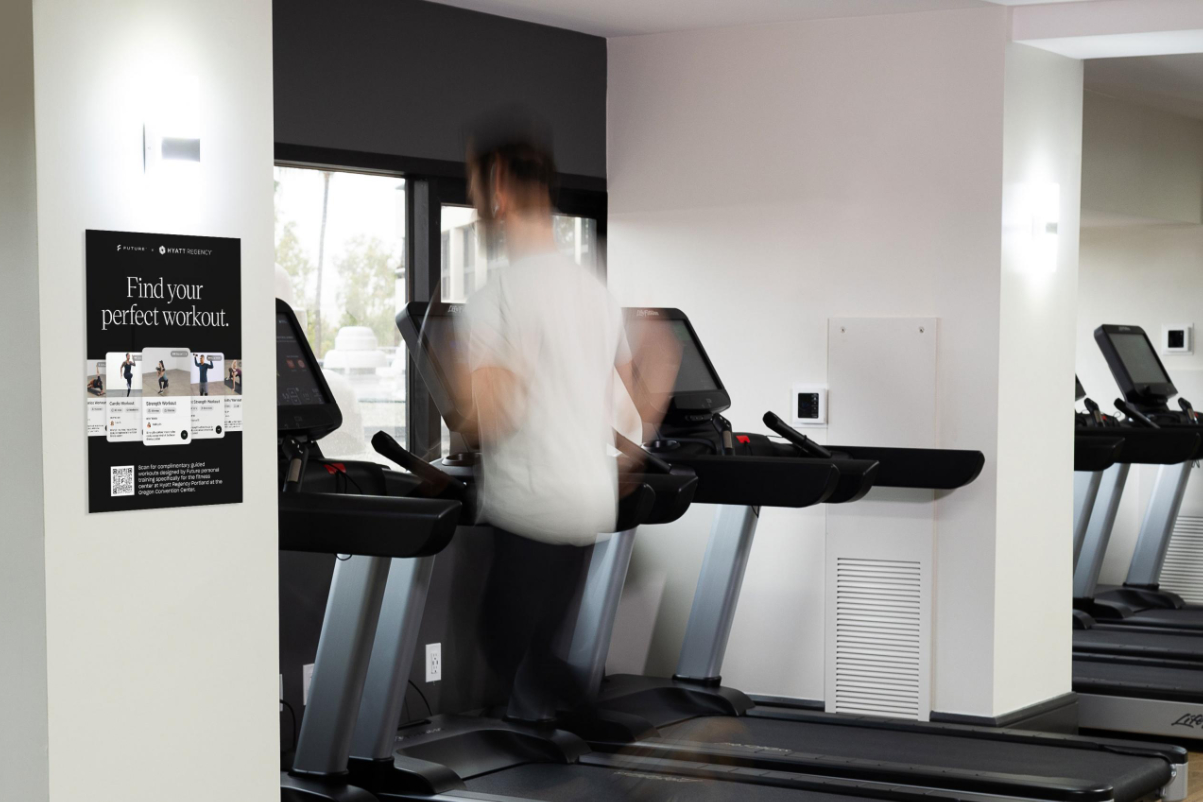
Travel Dashboards for ‘Executive Athletes’
Should corporate travelers be treated as the elite competitors of the boardroom? Yes, says Ted Finn, who has flown 2.5 million air miles as a business traveler and consultant.
“We need to redefine road warriors as executive athletes,” Finn says. “You send your executives to competitions to compete for millions of dollars worth of business opportunities, and you expect them to win.”
Should executive athletes prep for travel like a sports team? Some companies have begun asking their travel managers to track health issues. A year ago, CWT launched a “traveler well-being dashboard” module in its software platform for customers.
“The dashboard looks at the stress and impacts of certain traveler behaviors on their well-being,” said Rich Johnson, vice president of CWT’s solutions group.
If everyone on a team is always taking red-eye flights or flying long-haul in economy class, the well-being score won’t be as high as it could be.
“This information might influence a travel buyer’s negotiations with airlines,” Johnson said. “Maybe a carrier has imperfect scheduling that’s creating a huge amount of fatigue on the travelers, who aren’t closing deals or who are leaving the company.”
Corporate Travel’s New Vibe
Business travel’s incomplete rebound reflects more than corporate belt-tightening in the face of inflation. Changed industry attitudes are also reshaping the sector.
“Five years ago, I think everybody wanted travelers to have a better life, but no buyer wanted to say it,” said Hulgard of Accor. “You couldn’t introduce any wellness aspects into your corporate travel program because you would look weak.”
But that’s no longer the case. “Today, it’s completely the norm that travel managers are looking at aspects like security or fitness options in the hotel,” Hulgard said. “It’s a conversation that hotel account managers have with the buyers. That’s a big change.”
Sean O’Neill is the senior hospitality editor at Skift. Contact him at [email protected] Graphics by Vonn Orland Leynes.
Have a confidential tip for Skift? Get in touch .
Tags: business travel , corporate travel , duty of care , future of lodging , wellness

IMAGES
COMMENTS
Reissued with updates to health information and Travel Advisory Level. Exercise normal precautions in Kiribati. Read the country information page for additional information on travel to Kiribati. Commercial transportation to/from Kiribati is sporadically available. If you decide to travel to Kiribati: Monitor local media.
Avoid disaster areas. Follow the advice of local authorities. During a cyclone or monsoon, hotel guests may be required to leave accommodations near the shore and move to inland safety centres. Travel to and from outer islands may be disrupted for some days. Tornadoes, cyclones, hurricanes, typhoons and monsoons.
Essential Travel Tips for Visitors. Poor infrastructure, petty crime, alcoholism and economic strife in Kiribati. Here's what you need to know to stay safe. Kiribati is an island nation in the Pacific, halfway between Hawaii and Fiji. Planes don't travel in and out of the island very often, and the ones that do may look like they're seconds ...
Public Safety: Messages regarding demonstrations and strikes, explosive device/suspicious packages, and weather-related events are located on the embassy's website. Crime: The crime rate in Kiribati is low; however, you should still not be complacent regarding your personal safety or protecting your valuables. International Financial Scams: See the Department of State and the FBI pages for ...
Health Travel Advisory. Travellers must ensure they are fully healthy and vaccinated from COVID-19 before travelling to Kiribati and must present a proof of COVID-19 Vaccination certificate upon arrival. Travellers will no longer be required to complete any mandatory PCR/RAT tests upon arrival.
Some illnesses to watch out for on Kiribati are mosquito-borne dengue fever, hepatitis A and ciguatera, a type of food poisoning sometimes caused by fish. Mosquitoes flit about the island, and as insect repellent is not sold locally, bring your own (same goes for sunscreen). Treat all cuts, bites or rashes immediately to avoid infection.
If your travel plans in Kiribati include outdoor activities, take these steps to stay safe and healthy during your trip. Stay alert to changing weather conditions and adjust your plans if conditions become unsafe. Prepare for activities by wearing the right clothes and packing protective items, such as bug spray, sunscreen, and a basic first ...
FCDO travel advice for Kiribati. Includes safety and security, insurance, entry requirements and legal differences.
(Bairiki, Tarawa Wednesday, 12th January 2022) -----The Government of Kiribati reaffirmed that the country's border is now opened taking into account the "New Normal" travel conditions effective from the 10th January 2022 in compliance with an updated travel Standard Operating Procedures (SOP) for Kiribati. The COVID-19 Task-force in its press statement delivered on Tuesday 11th January ...
FCDO travel advice for Kiribati. Includes safety and security, insurance, entry requirements and legal differences.
FCDO travel advice for Kiribati. Includes safety and security, insurance, entry requirements and legal differences.
Covid-19 Restrictions In Kiribati Kiribati, a remote island nation in the Pacific Ocean, has implemented strict Covid-19 restrictions in order to protect its population from the virus. Travelers should be aware of the following measures: Travelers must comply with local laws and regulations regarding Covid-19, including wearing masks, practicing social distancing, and following hygiene ...
Before you travel. No travel can be guaranteed safe. Read all the advice in this guide and any specific travel advice that applies to you: ... If you need any non-basic medical treatment, you will usually need medical evacuation from Kiribati. Make sure you have adequate travel health insurance and accessible funds to cover evacuation by air ...
Kiribati travel advice. Check the latest travel advice on visiting Kiribati from official government sources (in english) from around the world including entry requirements and travel restrictions. Learn more about the current safety and security risks from terrorism, natural disasters and more.
Yes, some vaccines are recommended or required for Kiribati. The. Recommended for most travellers to the region, especially if unvaccinated. Recommended for travelers to most regions, especially if not previously vaccinated. Jab lasts 3 years. Oral vaccine lasts 5 years, must be able to swallow pills.
Like Tuvalu and the Maldives, and other delta cities like Dhaka, it is widely accepted that Kiribati is sinking, drowning under the rising seas, as reported by the Intergovernmental Panel on Climate Change scenarios which estimates that the 1.5 degree Celsius increase in global temperature will generate a global sea-level rise of between 1.7 and 3.2 feet by 2100.
Travel safety map for Kiribati. Legend. Extreme Warning (index value: 4.5 - 5) You should avoid any trips. A high warning index is a sound indicator of potential harm to your health and well-being. High Risk (index value: 3.5 - 4.5)
Is it safe to travel to Kiribati? Kiribati has a low risk level: 1.00 out of 5. Travelling to Kiribati is relatively safe. The safety index is based on travel advisories from independent 1 sources. Safety index is provided by www.travel-advisory.info: 08/12/2024. Kiribati customs rules. Duty-free allowance
The New Zealand High Commission Tarawa, Kiribati. Postal Address PO Box 53, Bairiki, Tarawa, Republic of Kiribati Telephone +686 7402 1400 Fax +686 21 402 Email [email protected] Hours Mon - Fri 0830 - 1230, 1330 - 1700 hrs. See our regional advice for the Pacific.
Kiribati is generally safe for tourists, with low crime rates.However, be cautious of petty theft and avoid carrying valuables. The country is prone to natural disasters like tropical cyclones and rising sea levels, so check weather advisories.Medical facilities are limited, so ensure you have travel insurance.Respecting local customs and dressing modestly is advised to avoid cultural ...
Kiribati is an island republic in the South Pacific, and is exposed to numerous natural hazards. From climate change to seismic activity, this is what travelers need to know. Is Kiribati safe for travelers? Here's our help, advice and support for planning a successful trip and traveling safely in Kiribati.
Kiribati re-opened its borders on 1 August 2022. For the latest information on COVID-19 protocols for entry to Kiribati, ... Travel safe - Subscribe to Notifications to keep up-to-date about travel restrictions on your favorite destination country No spam. You may cancel email subscription anytime ...
This year, international travel is down 4% from 2023, likely due to rising costs. According to AAA booking numbers, international travel for Labor Day weekend 2024 costs 11% more than last year.
Telephone: 020 7008 5000 (24 hours) Find out about call charges. FCDO travel advice for Kiribati. Includes safety and security, insurance, entry requirements and legal differences.
The virus is classified into two distinct groups: clade I and clade II. Clade II was responsible for the 2022 outbreak, which has led to around 100,000 cases worldwide.. But now, a version of ...
The World Health Organization declared a global health emergency over an outbreak that has spread to more than a dozen African countries.
The U.S. Travel Association, a trade group that promotes travel to and within the country, believes mask wearing should be up to individual travelers. It welcomed the lifting of the mask mandate ...
First, remember the airline is putting your safety first. As much as you may want to get going, the airline wants to get you to your destination safely and comfortably.
Ernesto is the fifth named storm to form in the Atlantic in 2024. In late May, the National Oceanic and Atmospheric Administration predicted that there would be 17 to 25 named storms this year, an ...
A Boom in Longer Stays. Extended-stay travel is also having a moment — fueled by massive infrastructure and tech investments. Hilton says "the workforce travel market" is worth $300 billion.